TRANSCRIBER’S NOTES:
—Obvious print and punctuation errors were corrected.
—The transcriber of this project created the book cover image using the front cover of the original book. The image is placed in the public domain.
“SHORT SIXES.”
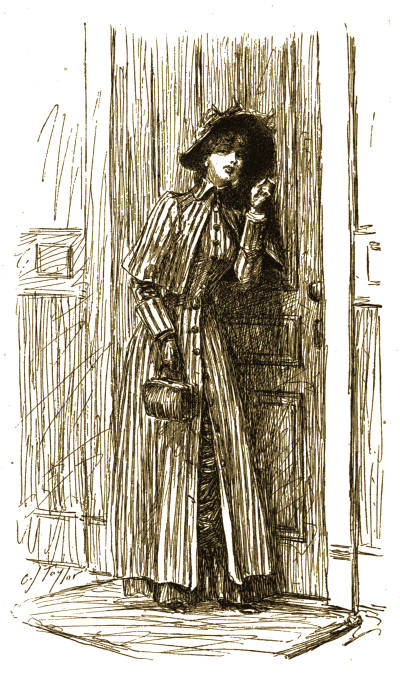
LOUISE.
“SHORT SIXES”
STORIES TO BE READ WHILE THE CANDLE BURNS
BY
H. C. BUNNER
Author of “Airs from Arcady” “The Midge” etc.
ILLUSTRATED BY
C. JAY TAYLOR, F. OPPER and S. B. GRIFFIN
PUCK
Keppler & Schwarzmann
New York 1891
Copyright, 1890, by Keppler & Schwarzmann.
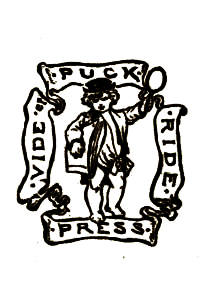
TO
A. L. B.
CONTENTS.
| Page | ||
| I. | The Tenor | 1 |
| Illustrated by C. Jay Taylor. | ||
| II. | Col. Brereton’s Aunty | 23 |
| Illustrated by C. Jay Taylor. | ||
| III. | A Round-Up | 39 |
| Illustrated by C. Jay Taylor. | ||
| IV. | The Two Churches of ’Quawket | 55 |
| Illustrated by F. Opper. | ||
| V. | The Love-Letters of Smith | 71 |
| Illustrated by C. Jay Taylor. | ||
| VI. | Zenobia’s Infidelity | 89 |
| Illustrated by S. B. Griffin. | ||
| VII. | The Nine Cent-Girls | 111 |
| Illustrated by S. B. Griffin. | ||
| VIII. | The Nice People | 129 |
| Illustrated by C. Jay Taylor. | ||
| IX. | Mr. Copernicus and the Proletariat | 147 |
| Illustrated by C. Jay Taylor. | ||
| X. | Hector | 165 |
| Illustrated by C. Jay Taylor. | ||
| XI. | A Sisterly Scheme | 181 |
| Illustrated by C. Jay Taylor. | ||
| XII. | Zozo | 199 |
| Illustrated by C. Jay Taylor. | ||
| XIII. | An Old, Old Story | 217 |
| Illustrated by C. Jay Taylor. | ||
THE TENOR.
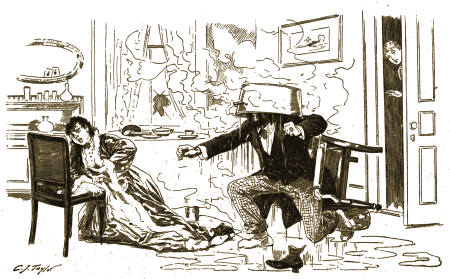
“‘I kill hare! give me my knife—give me my rivvolvare!’”
THE TENOR.
It was a dim, quiet room in an old-fashioned New York house, with windows opening upon a garden that was trim and attractive, even in its Winter dress—for the rose-bushes were all bundled up in straw ulsters. The room was ample, yet it had a cosy air. Its dark hangings suggested comfort and luxury, with no hint of gloom. A hundred pretty trifles told that it was a young girl’s room: in the deep alcove nestled her dainty white bed, draped with creamy lace and ribbons.
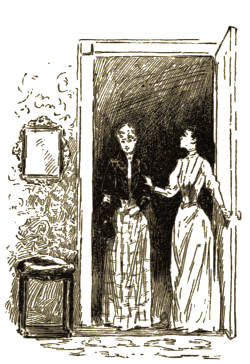
“I was so afraid that I’d be late!”
The door opened, and two pretty girls came in, one in hat and furs, the other in a modest house-dress. The girl in the furs, who had been afraid that she would be late, was fair, with a bright color in her cheeks, and an eager,[2] intent look in her clear brown eyes. The other girl was dark-eyed and dark-haired, dreamy, with a soft, warm, dusky color in her face. They were two very pretty girls indeed—or, rather, two girls about to be very pretty, for neither one was eighteen years old. The dark girl glanced at a little porcelain clock.
“You are in time, dear,” she said, and helped her companion to take off her wraps.
Then the two girls crossed the room, and with a caressing and almost a reverent touch, the dark girl opened the doors of a little carven cabinet that hung upon the wall, above a small table covered with a delicate white cloth. In its depths, framed in a mat of odorous double violets, stood the photograph of the face of a handsome man of forty—a face crowned with clustering black locks, from beneath which a pair of large, mournful eyes looked out with something like religious fervor in their rapt gaze. It was the face of a foreigner.
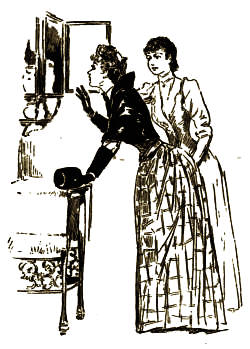
“O Esther!” cried the other girl, “how beautifully you have dressed him to-day!”
“I wanted to get more,” Esther said; “but I’ve spent almost all my allowance—and violets do cost so[3] shockingly. Come, now—” with another glance at the clock—“don’t let’s lose any more time, Louise dear.”
She brought a couple of tiny candles in Sèvres candlesticks, and two little silver saucers, in which she lit fragrant pastilles. As the pale gray smoke arose, floating in faint wreaths and spirals before the enshrined photograph, Louise sat down and gazed intently upon the little altar. Esther went to her piano and watched the clock. It struck two. Her hands fell softly on the keys, and, studying a printed programme in front of her, she began to play an overture. After the overture she played one or two pieces of the regular concert stock. Then she paused.
“I can’t play the Tschaikowski piece.”
“Never mind,” said the other. “Let us wait for him in silence.”
The hands of the clock pointed to 2:29. Each girl drew a quick breath, and then the one at the piano began to sing softly, almost inaudibly, “les Rameaux” in a transcription for tenor of Faure’s great song. When it was ended, she played and sang the encore. Then, with her fingers touching the keys so softly that they awakened only an echo-like sound, she ran over the numbers that intervened between the first tenor solo and the second. Then she sang again, as softly as before.
The fair-haired girl sat by the little table, gazing intently on the picture. Her great eyes seemed to devour it, and yet there was something absent-minded, speculative, in her steady look. She did not speak until Esther played the last number on the programme.
“He had three encores for that last Saturday,” she said, and Esther played the three encores.
Then they closed the piano and the little cabinet, and exchanged an innocent girlish kiss, and Louise went out, and found her father’s coupé waiting for her, and was driven away to her great, gloomy, brown-stone home near Central Park.
Louise Laura Latimer and Esther Van Guilder were the only children of two families which, though they were possessed of the three “Rs” which are all and more than are needed to insure admission to New York society—Riches, Respectability and Religion—yet were not in Society; or, at least, in the society that calls itself Society. This was not because Society was not willing to have them. It was because they thought the world too worldly. Perhaps this was one reason—although the social horizon of the two families had expanded somewhat as the girls grew up—why Louise and Esther, who had been playmates from their nursery days, and had grown up to be two uncommonly sentimental, fanciful, enthusiastically morbid girls, were to be found spending a bright Winter afternoon holding a ceremonial service of worship before the photograph of a fashionable French tenor.
It happened to be a French tenor whom they were worshiping. It might as well have been anybody or any thing else. They were both at that period of girlish growth when the young female bosom is torn by a hysterical craving to worship something—any thing. They had been studying music, and they had selected the tenor[5] who was the sensation of the hour in New York for their idol. They had heard him only on the concert stage; they were never likely to see him nearer. But it was a mere matter of chance that the idol was not a Boston Transcendentalist, a Popular Preacher, a Faith-Cure Healer, or a ringleted old maid with advanced ideas of Woman’s Mission. The ceremonies might have been different in form: the worship would have been the same.
M. Hyppolite Rémy was certainly the musical hero of the hour. When his advance notices first appeared, the New York critics, who are a singularly unconfiding, incredulous lot, were inclined to discount his European reputation.
When they learned that M. Rémy was not only a great artist, but a man whose character was “wholly free from that deplorable laxity which is so often a blot on the proud escutcheon of his noble profession;” that he had married an American lady; that he had “embraced the Protestant religion”—no sect was specified, possibly to avoid jealousy—and that his health was delicate, they were moved to suspect that he might have to ask that allowances be made for his singing. But when he arrived, his triumph was complete. He was as handsome as his pictures, if he was a trifle short, a shade too stout.
He was a singer of genius, too; with a splendid voice and a sound method—on the whole. It was before the days of the Wagner autocracy, and perhaps his tremolo passed unchallenged as it could not now; but he was a great artist. He knew his business as well as[6] his advance-agent knew his. The Rémy Concerts were a splendid success. Reserved seats, $5. For the Series of Six, $25.
| ✳ | ✳ | ✳ | ✳ | ✳ |
On the following Monday, Esther Van Guilder returned her friend’s call, in response to an urgent invitation, despatched by mail. Louise Latimer’s great bare room was incapable of transmutation into a cosy nest of a boudoir. There was too much of its heavy raw silk furniture—too much of its vast, sarcophagus-like bed—too much of its upholsterer’s elegance, regardless of cost—and taste. An enlargement from an ambrotype of the original Latimer, as he arrived in New York from New Hampshire, and a photograph of a “child subject” by Millais, were all her works of art. It was not to be doubted that they had climbed upstairs from a front parlor of an earlier stage of social development. The farm-house was six generations behind Esther; two behind Louise.
Esther found her friend in a state of almost feverish excitement. Her eyes shone; the color burned high on her clear cheeks.
“You never would guess what I’ve done, dear!” she began, as soon as they were alone in the big room. “I’m going to see him—to speak to him—Esther!” Her voice was solemnly hushed, “to serve him!”
“Oh, Louise! what do you mean?”
“To serve him—with my own hands! To—to—help[7] him on with his coat—I don’t know—to do something that a servant does—any thing, so that I can say that once, once only, just for an hour, I have been near him, been of use to him, served him in one little thing, as loyally as he serves OUR ART.”
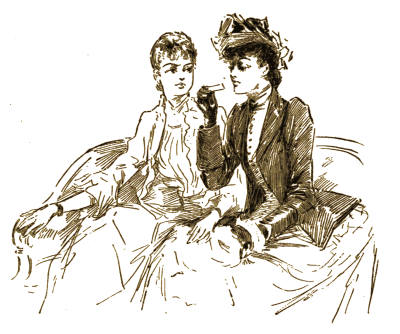
Music was THEIR art, and no capitals could tell how much it was theirs or how much of an art it was.
“Louise,” demanded Esther, with a frightened look, “are you crazy?”
“No. Read this!” She handed the other girl a clipping from the advertising columns of a newspaper.

“I saw it just by accident, Saturday, after I left you. Papa had left his paper in the coupé. I was going[8] up to my First Aid to the Injured Class—it’s at four o’clock now, you know. I made up my mind right off—it came to me like an inspiration. I just waited until it came to the place where they showed how to tie up arteries, and then I slipped out. Lots of the girls slip out in the horrid parts, you know. And then, instead of waiting in the ante-room, I put on my wrap, and pulled the hood over my head and ran off to the Midlothian—it’s just around the corner, you know. And I saw his wife.”
“What was she like?” queried Esther, eagerly.
“Oh, I don’t know. Sort of horrid—actressy. She had a pink silk wrapper with swansdown all over it—at four o’clock, think! I was awfully frightened when I got there; but it wasn’t the least trouble. She hardly looked at me, and she engaged me right off. She just asked me if I was willing to do a whole lot of things—I forget what they were—and where I’d worked before. I said at Mrs. Barcalow’s.”
“‘Mrs. Barcalow’s?’”
“Why, yes—my Aunt Amanda, don’t you know—up in Framingham. I always have to wash the teacups when I go there. Aunty says that everybody has got to do something in her house.”
“Oh, Louise!” cried her friend, in shocked admiration; “how can you think of such things?”
“Well, I did. And she—his wife, you know—just said: ‘Oh, I suppose you’ll do as well as any one—all you girls are alike.’”
“But did she really take you for a—servant[9]?”
“Why, yes, indeed. It was raining. I had that old ulster on, you know. I’m to go at twelve o’clock next Saturday.”
“But, Louise!” cried Esther, aghast, “you don’t truly mean to go!”
“I do!” cried Louise, beaming triumphantly.
“Oh, Louise!”
“Now, listen, dear, said Miss Latimer, with the decision of an enthusiastic young lady with New England blood in her veins. ‘Don’t say a word till I tell you what my plan is. I’ve thought it all out, and you’ve got to help me.’”
Esther shuddered.
“You foolish child!” cried Louise. Her eyes were sparkling: she was in a state of ecstatic excitement; she could see no obstacles to the carrying out of her plan. “You don’t think I mean to stay there, do you? I’m just going at twelve o’clock, and at four he comes back from the matinée, and at five o’clock I’m going to slip on my things and run downstairs, and have you waiting for me in the coupé, and off we go. Now do you see?”
It took some time to bring Esther’s less venturesome spirit up to the point of assisting in this bold undertaking; but she began, after a while, to feel the delights of vicarious enterprise, and in the end the two girls, their cheeks flushed, their eyes shining feverishly, their voices tremulous with childish eagerness, resolved themselves into a committee of ways and means; for they were two well-guarded young women, and to engineer five hours[10] of liberty was difficult to the verge of impossibility. However, there is a financial manœuvre known as “kiting checks,” whereby A exchanges a check with B and B swaps with A again, playing an imaginary balance against Time and the Clearing House; and by a similar scheme, which an acute student of social ethics has called “kiting calls,” the girls found that they could make Saturday afternoon their own, without one glance from the watchful eyes of Esther’s mother or Louise’s aunt—Louise had only an aunt to reckon with.
“And, oh, Esther!” cried the bolder of the conspirators, “I’ve thought of a trunk—of course I’ve got to have a trunk, or she would ask me where it was, and I couldn’t tell her a fib. Don’t you remember the French maid who died three days after she came here? Her trunk is up in the store-room still, and I don’t believe anybody will ever come for it—it’s been there seven years now. Let’s go up and look at it.”
The girls romped upstairs to the great unused upper story, where heaps of household rubbish obscured the dusty half-windows. In a corner, behind Louise’s baby chair and an unfashionable hat-rack of the old steering-wheel pattern, they found the little brown-painted tin trunk, corded up with clothes-line.
“Louise!” said Esther, hastily, “what did you tell her your name was?”
“I just said ‘Louise’.”
Esther pointed to the name painted on the trunk,
Louise Lévy.
“It is the hand of Providence,” she said. “Somehow, now, I’m sure you’re quite right to go.”
And neither of these conscientious young ladies reflected for one minute on the discomfort which might be occasioned to Madame Rémy by the defection of her new servant a half-hour before dinner-time on Saturday night.
| ✳ | ✳ | ✳ | ✳ | ✳ |
“Oh, child, it’s you, is it?” was Mme. Rémy’s greeting at twelve o’clock on Saturday. “Well, you’re punctual—and you look clean. Now, are you going to break my dishes or are you going to steal my rings? Well, we’ll find out soon enough. Your trunk’s up in your room. Go up to the servants’ quarters—right at the top of those stairs there. Ask for the room that belongs to apartment 11. You are to room with their girl.”
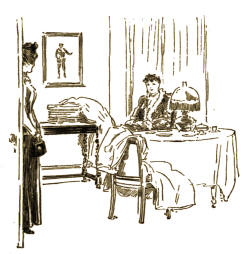
Louise was glad of a moment’s respite. She had taken the plunge; she was determined to go through to the end. But her heart would beat and her hands would tremble. She climbed up six flights of winding stairs, and found herself weak and dizzy when she reached the top and gazed around her. She was in a[12] great half-story room, eighty feet square. The most of it was filled with heaps of old furniture and bedding, rolls of carpet, of canvas, of oilcloth, and odds and ends of discarded or unused household gear—the dust thick over all. A little space had been left around three sides, to give access to three rows of cell-like rooms, in each of which the ceiling sloped from the very door to a tiny window at the level of the floor. In each room was a bed, a bureau that served for wash-stand, a small looking-glass, and one or two trunks. Women’s dresses hung on the whitewashed walls. She found No. 11, threw off, desperately, her hat and jacket, and sunk down on the little brown tin trunk, all trembling from head to foot.
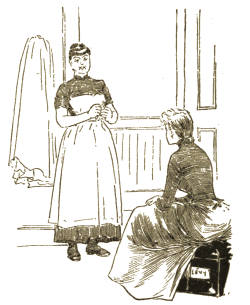
“Hello,” called a cheery voice. She looked up and saw a girl in a dirty calico dress.
“Just come?” inquired this person, with agreeable informality. She was a good-looking large girl, with red hair and bright cheeks. She leaned against the door-post and polished her finger-nails with a little brush. Her hands were shapely.
“Ain’t got onto the stair-climbing racket yet, eh? You’ll get used to it. ‘Louise Lévy,’” she read the name[13] on the trunk. “You don’t look like a sheeny. Can’t tell nothin’ ’bout names, can you? My name’s Slattery. You’d think I was Irish, wouldn’t you? Well, I’m straight Ne’ York. I’d be dead before I was Irish. Born here. Ninth Ward an’ next to an engine-house. How’s that? There’s white Jews, too. I worked for one, pickin’ sealskins down in Prince Street. Most took the lungs out of me. But that wasn’t why I shook the biz. It queered my hands—see? I’m goin’ to be married in the Fall to a German gentleman. He ain’t so Dutch when you know him, though. He’s a grocer. Drivin’ now; but he buys out the boss in the Fall. How’s that? He’s dead stuck on my hooks, an’ I have to keep ’em lookin’ good. I come here because the work was light. I don’t have to work—only to be doin’ somethin’, see? Only got five halls and the lamps. You got a fam’ly job, I s’pose? I wouldn’t have that. I don’t mind the Sooprintendent; but I’d be dead before I’d be bossed by a woman, see? Say, what fam’ly did you say you was with?”
This stream of talk had acted like a nerve-tonic on Louise. She was able to answer:
“M—Mr. Rémy.”
“Ramy?—oh, lord! Got the job with His Tonsils? Well, you won’t keep it long. They’re meaner ’n three balls, see? Rent their room up here and chip in with eleven. Their girls don’t never stay. Well, I got to step, or the Sooprintendent’ll be borin’ my ear. Well—so long!”
But Louise had fled down the stairs. “His Tonsils[14]” rang in her ears. What blasphemy! What sacrilege! She could scarcely pretend to listen to Mme. Rémy’s first instructions.
The household was parsimonious. Louise washed the caterer’s dishes—he made a reduction in his price. Thus she learned that a late breakfast took the place of luncheon. She began to feel what this meant. The beds had been made; but there was work enough. She helped Mme. Rémy to sponge a heap of faded finery—her dresses. If they had been his coats! Louise bent her hot face over the tawdry silks and satins, and clasped her parboiled little finger-tips over the wet sponge. At half-past three Mme. Rémy broke the silence.
“We must get ready for Musseer,” she said. An ecstatic joy filled Louise’s being. The hour of her reward was at hand.
Getting ready for “Musseer” proved to be an appalling process. First they brewed what Mme. Rémy called a “teaze Ann.” After the tisane, a host of strange foreign drugs and cosmetics were marshalled in order. Then water was set to heat on a gas-stove. Then a little table was neatly set.
“Musseer has his dinner at half-past four,” Madame explained. “I don’t take mine till he’s laid down and I’ve got him off to the concert. There, he’s coming now. Sometimes he comes home pretty nervous. If he’s nervous, don’t you go and make a fuss, do you hear, child?”
The door opened, and Musseer entered, wrapped in a huge frogged overcoat. There was no doubt that he[15] was nervous. He cast his hat upon the floor, as if he were Jove dashing a thunderbolt. Fire flashed from his eyes. He advanced upon his wife and thrust a newspaper in her face—a little pinky sheet, a notorious blackmailing publication.
“Zees,” he cried, “is your work!”
“What is it, now, Hipleet?” demanded Mme. Rémy.
“Vot it ees?” shrieked the tenor. “It ees ze history of how zey have heest me at Nice! It ees all zair—how I have been heest—in zis sacré sheet—in zis hankairchif of infamy! And it ees you zat have told it to zat devil of a Rastignac—traitresse!”
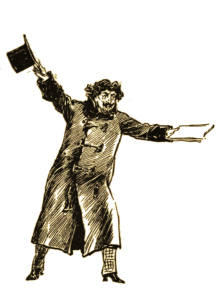
“Now, Hipleet,” pleaded his wife, “if I can’t learn enough French to talk with you, how am I going to tell Rastignac about your being hissed?”
This reasoning silenced Mr. Rémy for an instant—an instant only.
“You vood have done it!” he cried, sticking out his chin and thrusting his face forward.
“Well, I didn’t,” said Madame, “and nobody reads that thing, any way. Now, don’t you mind it, and let me get your things off, or you’ll be catching cold.”
Mr. Rémy yielded at last to the necessity of self-preservation, and permitted his wife to remove his frogged overcoat, and to unwind him from a system of[16] silk wraps to which the Gordian knot was a slip-noose. This done, he sat down before the dressing-case, and Mme. Rémy, after tying a bib around his neck, proceeded to dress his hair and put brilliantine on his moustache. Her husband enlivened the operation by reading from the pinky paper.
“It ees not gen-air-al-lee known—zat zees dees-tin-guished tenor vos heest on ze pob-lic staidj at Nice—in ze year—“
Louise leaned against the wall, sick, faint and frightened, with a strange sense of shame and degradation at her heart. At last the tenor’s eye fell on her.
“Anozzair eediot?” he inquired.
“She ain’t very bright, Hipleet,” replied his wife; “but I guess she’ll do. Louise, open the door—there’s the caterer.”
Louise placed the dishes upon the table mechanically. The tenor sat himself at the board, and tucked a napkin in his neck.
“And how did the Benediction Song go this afternoon?” inquired his wife.
“Ze Bénédiction? Ah! One encore. One on-lee. Zese pigs of Américains. I t’row my pairls biffo’ swine. Chops once more! You vant to mordair me? Vat do zis mean, madame? You ar-r-r-re in lig wiz my enemies. All ze vorlt is against ze ar-r-r-teest!”
The storm that followed made the first seem a zephyr. The tenor exhausted his execratory vocabulary in French and English. At last, by way of a dramatic finale, he seized the plate of chops and flung it from[17] him. He aimed at the wall; but Frenchmen do not pitch well. With a ring and a crash, plate and chops went through the broad window-pane. In the moment of stricken speechlessness that followed, the sound of the final smash came softly up from the sidewalk.
“Ah-a-a-a-a-a-a-a-a-a-ah!”
The tenor rose to his feet with the howl of an anguished hyena.
“Oh, good gracious!” cried his wife; “he’s going to have one of his creezes—his creezes de nare!”
He did have a crise de nerfs. “Ten dollair!” he yelled, “for ten dollair of glass!” He tore his pomaded hair; he tore off his bib and his neck-tie, and for three minutes without cessation he shrieked wildly and unintelligibly. It was possible to make out, however, that “arteest” and “ten dollair” were the themes of his improvisation. Finally he sank exhausted into the chair, and his white-faced wife rushed to his side.
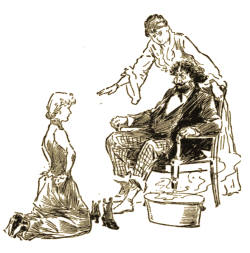
“Louise!” she cried, “get the foot-tub out of the closet while I spray his throat, or he can’t sing a note. Fill it up with warm water—102 degrees—there’s the thermometer—and bathe his feet.”
Trembling from head to foot, Louise obeyed her orders, and brought the foot-tub, full of steaming water. Then she knelt down and began to serve the maestro for the[18] first time. She took off his shoes. Then she looked at his socks. Could she do it?
“Eediot!” gasped the sufferer, “make haste! I die!”
“Hold your mouth open, dear,” said Madame, “I haven’t half sprayed you.”
“Ah! you!” cried the tenor. “Cat! Devil! It ees you zat have killed me!” And moved by an access of blind rage, he extended his arm, and thrust his wife violently from him.
Louise rose to her feet, with a hard, set, good old New England look on her face. She lifted the tub of water to the level of her breast, and then she inverted it on the tenor’s head. For one instant she gazed at the deluge, and at the bath-tub balanced on the maestro’s skull like a helmet several sizes too large—then she fled like the wind.
Once in the servants’ quarters, she snatched her hat and jacket. From below came mad yells of rage.
“I kill hare! give me my knife—give me my rivvolvare! Au secours! Assassin!”
Miss Slattery appeared in the doorway, still polishing her nails.
“What have you done to His Tonsils?” she inquired. “He’s pretty hot, this trip.”
“How can I get away from here?” cried Louise.
Miss Slattery pointed to a small door. Louise rushed down a long stairway—another—and yet others—through a great room where there was a smell of cooking and a noise of fires—past white-capped cooks and scullions—through a long stone corridor, and out[19] into the street. She cried aloud as she saw Esther’s face at the window of the coupé.
She drove home—cured.
| Owing to the Sudden Indisposition of M. Rémy, There will be no Concert This Evening. Money Refunded at the Box Office. |
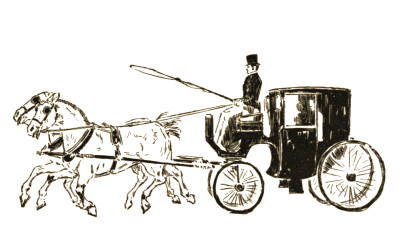
COL. BRERETON’S AUNTY.
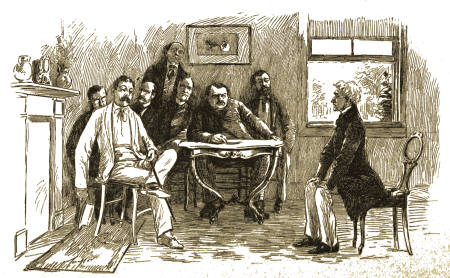
COL. BRERETON’S AUNTY.

The pleasant smell of freshly turned garden-mould and of young growing things came in through the open window of the Justice of the Peace. His nasturtiums were spreading, pale and weedy—I could distinguish their strange, acrid scent from the odor of the rest of the young vegetation. The tips of the morning-glory vines, already up their strings to the height of a man’s head, curled around the window-frame, and beckoned to me to come out and rejoice with them in the freshness of the mild June day. It was pleasant enough inside the Justice’s front parlor, with its bright ingrain carpet, its gilt clock, and its marble-topped centre-table. But the Justice and the five gentlemen who were paying him a business call—although it was Sunday morning—looked, the whole half dozen of them, ill in accord with the spirit of the Spring day. The Justice looked annoyed. The five assembled gentlemen looked stern.
“Well, as you say,” remarked the fat little Justice, who was an Irishman, “if this divilment goes on[24]—“
“It’s not a question of going on, Mr. O’Brien,” broke in Alfred Winthrop; “it has gone on too long.”
Alfred is a little inclined to be arrogant with the unwinthropian world; and, moreover, he was rushing the season in a very grand suit of white flannels. He looked rather too much of a lord of creation for a democratic community. Antagonism lit the Justice’s eye.
“I’m afraid we’ve got to do it, O’Brien,” I interposed, hastily. The Justice and I are strong political allies. He was mollified.
“Well, well,” he assented; “let’s have him up and see what he’s got to say for himself. Mike!” he shouted out the window; “bring up Colonel Brereton!”
Colonel Brereton had appeared in our village about a year before that Sunday. Why he came, whence he came, he never deigned to say. But he made no secret of the fact that he was an unreconstructed Southron. He had a little money when he arrived—enough to buy a tiny one-story house on the outskirts of the town. By vocation he was a lawyer, and, somehow or other, he managed to pick up enough to support him in his avocation, which, we soon found out, was that of village drunkard. In this capacity he was a glorious, picturesque and startling success. Saturated with cheap whiskey, he sat all day long in the bar-room or on the porch of the village groggery, discoursing to the neighborhood loafers of the days befo’ the wah, when he had a vast plantation in “Firginia”—“and five hundred niggehs, seh.”
So long as the Colonel’s excesses threatened only his own liver, no one interfered with him. But on the[25] night before we called upon the Justice, the Colonel, having brooded long over his wrongs at the hands of the Yankees, and having made himself a reservoir of cocktails, decided to enter his protest against the whole system of free colored labor by cutting the liver out of every negro in the town; and he had slightly lacerated Winthrop’s mulatto coachman before a delegation of citizens fell upon him, and finding him unwilling to relinquish his plan, placed him for the night in the lock-up in Squire O’Brien’s cellar.
We waited for the Colonel. From under our feet suddenly arose a sound of scuffling and smothered imprecations. A minute later, Mike, the herculean son of the Justice, appeared in the doorway, bearing a very small man hugged to his breast as a baby hugs a doll.
“Let me down, seh!” shouted the Colonel. Mike set him down, and he marched proudly into the room, and seated himself with dignity and firmness on the extreme edge of a chair.
The Colonel was very small indeed for a man of so much dignity. He could not have been more than five foot one or two; he was slender—but his figure was shapely and supple. He was unquestionably a handsome man, with fine, thin features and an aquiline profile—like a miniature Henry Clay. His hair was snow-white—prematurely, no doubt—and at the first glance you thought he was clean shaven. Then you saw that there was scarcely a hair on his cheeks, and that only the finest imaginable line of snowy white moustaches curled down his upper lip. His skin was smooth as a baby’s and of[26] the color of old ivory. His teeth, which he was just then exhibiting in a sardonic smile, were white, small, even. But if he was small, his carriage was large, and military. There was something military, too, about his attire. He wore a high collar, a long blue frock coat, and tight, light gray trousers with straps. That is, the coat had once been blue, the trousers once light gray, but they were now of many tints and tones, and, at that exact moment, they had here and there certain peculiar high lights of whitewash.
The Colonel did not wait to be arraigned. Sweeping his black, piercing eye over our little group, he arraigned us.
“Well, gentlemen,” with keen irony in his tone, “I reckon you think you’ve done a right smart thing, getting the Southern gentleman in a hole? A pro-dee-gious fine thing, I reckon, since it’s kept you away from chu’ch. Baptis’ church, I believe?” This was to poor Canfield, who was suspected of having been of that communion in his youth, and of being much ashamed of it after his marriage to an aristocratic Episcopalian. “Nice Sunday mo’ning to worry a Southern gentleman! Gentleman who’s owned a plantation that you could stick this hyeh picayune town into one co’neh of! Owned mo’ niggehs than you eveh saw. Robbed of his land and his niggehs by you Yankee gentlemen. Drinks a little wine to make him fo’get what he’s suffehed. Gets ovehtaken. Tries to avenge an insult to his honah. Put him in a felon’s cell and whitewash his gyarments. And now you come hyeh—you come hyeh—” here[27] his eye fell with deep disapproval upon Winthrop’s white flannels—“you come hyeh in youh underclothes, and you want to have him held fo’ Special Sessions.”
“You are mistaken, Colonel Brereton,” Winthrop interposed; “if we can have your promise—“
“I will promise you nothing, seh!” thundered the Colonel, who had a voice like a church-organ, whenever he chose to use it; “I will make no conventions with you! I will put no restrictions on my right to defend my honah. Put me in youh felon’s cell. I will rot in youh infehnal dungeons; but I will make no conventions with you. You can put me in striped breeches, but you cyan’t put my honah in striped breeches!”
“That settles it,” said the justice.
“And all,” continued the Colonel, oratorically, “and all this hyeh fuss and neglect of youh religious duties, fo’ one of the cheapest and most o’nery niggehs I eveh laid eyes on. Why, I wouldn’t have given one hundred dollahs fo’ that niggeh befo’ the wah. No, seh, I give you my wo’d, that niggeh ain’t wo’th ninety dollahs!”
“Mike!” said the Justice, significantly. The Colonel arose promptly, to insure a voluntary exit. He bowed low to Winthrop.
“Allow me to hope, seh,” he said, “that you won’t catch cold.” And with one lofty and comprehensive salute he marched haughtily back to his dungeon, followed by the towering Mike.
The Justice sighed. An elective judiciary has its trials, like the rest of us. It is hard to commit a voter[28] of your own party for Special Sessions. However—“I’ll drive him over to Court in the morning,” said the little Justice.
| ✳ | ✳ | ✳ | ✳ | ✳ |
I was sitting on my verandah that afternoon, reading. Hearing my name softly spoken, I looked up and saw the largest and oldest negress I had ever met. She was at least six feet tall, well-built but not fat, full black, with carefully dressed gray hair. I knew at once from her neat dress, her well-trained manner, the easy deference of the curtsey she dropped me, that she belonged to the class that used to be known as “house darkeys”—in contradistinction to the field hands.

“I understand, seh,” she said, in a gentle, low voice, “that you gentlemen have got Cunnle Bre’eton jailed?”
She had evidently been brought up among educated Southerners, for her grammar was good and her pronunciation correct, according to Southern standards. Only once or twice did she drop into negro talk.
I assented.
“How much will it be, seh, to get him out?” She produced a fat roll of twenty and fifty dollar bills. “I do fo’ Cunnle Bre’eton,” she explained: “I have always done fo’ him. I was his Mammy when he was a baby.”
I made her sit down—when she did there was modest deprecation in her attitude—and I tried to explain the situation to her.
“You may go surety for Colonel Brereton,” I said; “but he is certain to repeat the offense.”
“No, seh,” she replied, in her quiet, firm tone; “the Cunnle won’t make any trouble when I’m here to do fo’ him.”
“You were one of his slaves?”
“No, seh. Cunnle Bre’eton neveh had any slaves, seh. His father, Majah Bre’eton, he had slaves one time, I guess, but when the Cunnle was bo’n, he was playing kyards fo’ a living, and he had only me. When the Cunnle’s mother died, Majah Bre’eton he went to Mizzoura, and he put the baby in my ahms, and he said to me, ‘Sabrine,’ he sez, ‘you do fo’ him.’ And I’ve done fo’ him eveh since. Sometimes he gets away from me, and then he gets kind o’ wild. He was in Sandusky a year, and in Chillicothe six months, and he was in Tiffin once, and one time in a place in the state of Massachusetts—I disremembeh the name. This is the longest time he eveh got away from me. But I always find him, and then he’s all right.”
“But you have to deal with a violent man.”
“The Cunnle won’t be violent with me, seh[30].”
“But you’re getting old, Aunty—how old?”
“I kind o’ lost count since I was seventy-one, seh. But I’m right spry, yet.”
“Well, my good woman,” I said, decisively, “I can’t take the responsibility of letting the Colonel go at large unless you give me some better guarantee of your ability to restrain him. What means have you of keeping him in hand?”
She hesitated a long time, smoothing the folds of her neat alpaca skirt with her strong hands. Then she said:
“Well, seh, I wouldn’t have you say any thing about it, fo’ feah of huhting Cunnle Bre’eton’s feelings; but when he gets that way, I jes’ nachully tuhn him up and spank him. I’ve done it eveh since he was a baby,” she continued, apologetically, “and it’s the only way. But you won’t say any thing about it, seh? The Cunnle’s powerful sensitive.”
I wrote a brief note to the Justice. I do not know what legal formalities he dispensed with; but that afternoon the Colonel was free. Aunt Sabrine took him home, and he went to bed for two days while she washed his clothes. The next week he appeared in a complete new outfit—in cut and color the counterpart of its predecessor.
| ✳ | ✳ | ✳ | ✳ | ✳ |
Here began a new era for the Colonel. He was no longer the town drunkard. Aunty Sabrine “allowanced” him—one cocktail in the “mo’ning:” a “ho’n” at noon,[31] and one at night. On this diet he was a model of temperance. If occasionally he essayed a drinking bout, Aunty Sabrine came after him at eve, and led him home. From my window I sometimes saw the steady big figure and the wavering little one going home over the crest of the hill, equally black in their silhouettes against the sunset sky.
What happened to the Colonel we knew not. No man saw him for two days. Then he emerged—with unruffled dignity. The two always maintained genuine Southern relations. He called her his damn black nigger—and would have killed any man who spoke ill of her. She treated him with the humble and deferential familiarity of a “mammy” toward “young mahse.”
For herself, Aunty Sabrine won the hearts of the town. She was an ideal washerwoman, an able temporary cook in domestic interregna, a tender and wise nurse, and a genius at jam and jellies. The Colonel, too, made money in his line, and put it faithfully into the common fund.
In March of the next year, I was one of a Reform Town Committee, elected to oust the usual local ring. We discharged the inefficient Town Counsel, who had neglected our interests in a lot of suits brought by swindling road-contractors. Aunty Sabrine came to me, and solemnly nominated Colonel Brereton for the post. “He is sho’ly a fine loyyeh,” she said.
I know not whether it was the Great American sense of humor, or the Great American sense of fairness, but we engaged the Colonel, conditionally.
He was a positive, a marvelous, an incredible success, and he won every suit. Perhaps he did not know much law; but he was the man of men for country judges and juries. Nothing like his eloquence had ever before been heard in the county. He argued, he cajoled, he threatened, he pleaded, he thundered, he exploded, he confused, he blazed, he fairly dazzled—for silence stunned you when the Colonel ceased to speak, as the lightning blinds your eyes long after it has vanished.
The Colonel was utterly incapable of seeing any but his own side of the case. I remember a few of his remarks concerning Finnegan, the contractor, who was suing for $31.27 payments withheld.
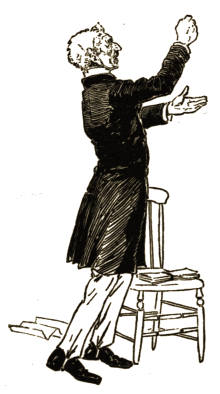
“Fohty yahds!” the Colonel roared: “fohty yahds! This hyeh man Finnegan, this hyeh cock-a-doodle-doo, he goes along this hyeh road, and he casts his eye oveh this hyeh excavation, and he comes hyeh and sweahs it’s fohty yahds good measure. Does he take a tape measure and measure it? NO! Does he even pace it off with those hyeh corkscrew legs of his that he’s trying to hide under his chaiah? NO!! He says, ‘I’m Finnegan, and this hyeh’s fohty yahds,’ and off he sashays up the hill, wondering wheah Finnegan’s going to bring up when he’s walked off the topmost peak of the snow-clad Himalayas of human omniscience! And[33] this hyeh man, this hyeh insult to humanity in a papeh collah, he comes hyeh, to this august tribunal, and he asks you, gentlemen of the jury, to let him rob you of the money you have earned in the sweat of youh brows, to take the bread out of the mouths of the children whom youh patient and devoted wives have bohne to you in pain and anguish—but I say to you, gen—tel—men—(suddenly exploding) HIS PAPEH COLLAH SHALL ROAST IN HADES BEFO’ I WILL BE A PAHTY TO THIS HYEH INFAMY!”
Finnegan was found in hiding in his cellar when his counsel came to tell him that he could not collect his $31.27. “Bedad, is that all?” he gasped; “I t’ought I’d get six mont’s.”
People flocked from miles about to hear the Colonel. Recalcitrant jurymen were bribed to service by the promise of a Brereton case on the docket. His performances were regarded in the light of a free show, and a verdict in his favor was looked upon as a graceful gratuity.
He made money—and he gave it meekly to Aunty Sabrine.
| ✳ | ✳ | ✳ | ✳ | ✳ |
It was the night of the great blizzard; but there was no sign of cold or wind when I looked out, half-an-hour after midnight, before closing my front door. I heard the drip of water from the trees, I saw a faint mist rising from the melting snow. At the foot of my lawn I dimly saw the Colonel’s familiar figure marching[34] homeward from some political meeting preliminary to Tuesday’s election. His form was erect, his step steady. He swung his little cane and whistled as he walked. I was proud of the Colonel.
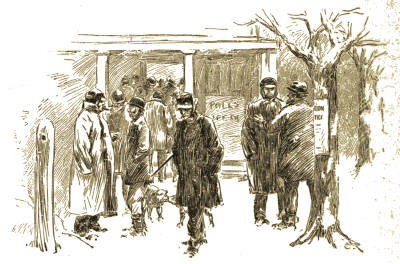
An hour later the storm was upon us. By noon of Monday, Alfred Winthrop’s house, two hundred yards away, might as well have been two thousand, so far as getting to it, or even seeing it, was concerned. Tuesday morning the snow had stopped, and we looked out over a still and shining deluge with sparkling fringes above the blue hollows of its frozen waves. Across it roared an icy wind, bearing almost invisible diamond dust to fill irritated eyes and throats. The election was held that day. The result was to be expected. All the “hard” citizens were at the polls. Most of the reformers were[35] stalled in railroad trains. The Reform Ticket failed of re-election, and Colonel Brereton’s term of office was practically at an end.
I was outdoors most of the day, and that night, when I awoke about three o’clock, suddenly and with a shock, thinking I had heard Aunty Sabrine’s voice crying: “Cunnle! wheah are you, Cunnle?” my exhausted brain took it for the echo of a dream. I must have dozed for an hour before I sprang up with a certainty in my mind that I had heard her voice in very truth. Then I hurried on my clothes, and ran to Alfred Winthrop’s. He looked incredulous; but he got into his boots like a man. We found Aunty Sabrine, alive but unconscious, on the crest of the hill. When we had secured an asylum for her, we searched for the Colonel. The next day we learned that he had heard the news of the election and had boarded a snow-clearing train that was returning to the Junction.
It was a week before Aunty Sabrine recovered. When I asked her if she was going to look for the Colonel, she answered with gentle resignation:
“No, seh. I’m ’most too old. I’ll stay hyeh, wheah he knows wheah to find me. He’ll come afteh me, sho’.”
| ✳ | ✳ | ✳ | ✳ | ✳ |
Sixteen months passed, and he did not come. Then, one evening, a Summer walk took me by the little house. I heard a voice I could not forget.
“Hyeh, you black niggeh, get along with that suppeh, or I come in theah and cut youh damn haid off[36]!”
Looking up, I saw Colonel Brereton, a little the worse for wear, seated on the snake fence. No ... he was not seated; he was hitched on by the crook of his knees, his toes braced against the inside of the lower rail. His coat-tails hung in the vacant air.
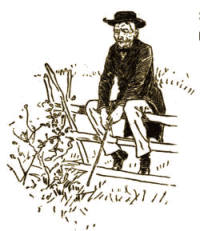
He descended, a little stiffly, I thought, and greeted me cordially, with affable dignity. His manner somehow implied that it was I who had been away.
He insisted on my coming into his front yard and sitting down on the bench by the house, while he condescendingly and courteously inquired after the health of his old friends and neighbors. I stayed until supper was announced. The Colonel was always the soul of hospitality; but on this occasion he did not ask me to join him. And I reflected, as I went away, that although he had punctiliously insisted on my sitting down, the Colonel had remained standing during our somewhat protracted conversation.

A ROUND-UP.
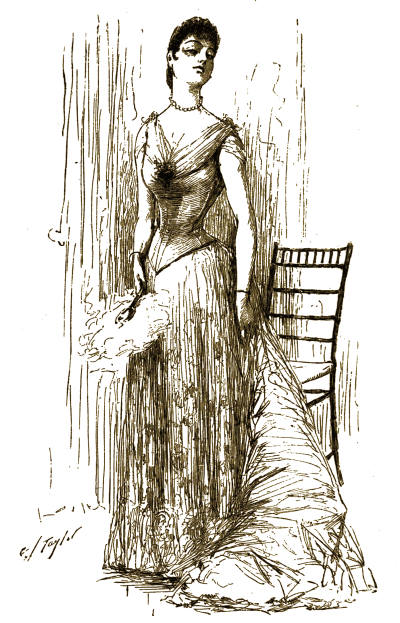
“She was beautiful as the Queen of Sheba was beautiful.”
A ROUND-UP.
I.
When Rhodora Boyd—Rhodora Pennington that was—died in her little house, with no one near her but one old maid who loved her, the best society of the little city of Trega Falls indulged in more or less complacent reminiscence.
Except to Miss Wimple, the old maid, Rhodora had been of no importance at all in Trega for ten long years, and yet she had once given Trega society the liveliest year it had ever known. (I should tell you that Trega people never mentioned the Falls in connection with Trega. Trega was too old to admit any indebtedness to the Falls.)
Rhodora Pennington came to Trega with her invalid mother as the guest of her uncle, the Commandant at the Fort—for Trega was a garrison town. She was a beautiful girl. I do not mean a pretty girl: there were pretty girls in Trega—several of them. She was beautiful as the Queen of Sheba was beautiful—grand, perfect, radiantly tawny of complexion, without a flaw or a failing in her pulchritude—almost too fine a being[40] for family use, except that she had plenty of hot woman’s blood in her veins, and was an accomplished, delightful, impartial flirt.
All the men turned to her with such prompt unanimity that all the girls of Trega’s best society joined hands in one grand battle for their prospective altars and hearths. From the June day when Rhodora came, to the Ash Wednesday of the next year when her engagement was announced, there was one grand battle, a dozen girls with wealth and social position and knowledge of the ground to help them, all pitted against one garrison girl, with not so much as a mother to back her—Mrs. Pennington being hopelessly and permanently on the sick-list.
Trega girls who had never thought of doing more than wait at their leisure for the local young men to marry them at their leisure now went in for accomplishments of every sort. They rode, they drove, they danced new dances, they read Browning and Herbert Spencer, they sang, they worked hard at archery and lawn-tennis, they rowed and sailed and fished, and some of the more desperate even went shooting in the Fall, and in the Winter played billiards and—penny ante. Thus did they, in the language of a somewhat cynical male observer, back Accomplishments against Beauty.
The Shakspere Club and the Lake Picnic, which had hitherto divided the year between them, were submerged in the flood of social entertainments. Balls and parties followed one another. Trega’s square stone houses were lit up night after night, and the broad[41] moss-grown gardens about them were made trim and presentable, and Chinese lanterns turned them into a fairy-land for young lovers.
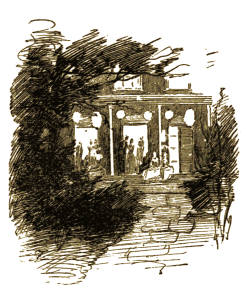
It was a great year for Trega! The city had been dead, commercially, ever since the New York Central Railroad had opened up the great West; but the unprecedented flow of champagne and Apollinaris actually started a little business boom, based on the inferable wealth of Trega, and two or three of Trega’s remaining firms went into bankruptcy because of the boom. And Rhodora Pennington did it all.
Have you ever seen the end of a sham-fight? You have been shouting and applauding, and wasting enough enthusiasm for a foot-ball match. And now it is all finished, and nothing has been done, and you go home somewhat ashamed of yourself, and glad only that the blue-coated participants must feel more ashamed of themselves; and the smell of the villainous saltpetre, that waked the Berserker in your heart an hour ago, is now noisome and disgusting, and makes you cough and sneeze.
Even so did the girls of Trega’s best society look each in the face of the other, when Ash Wednesday ended that nine months of riot, and ask of each other, “What has it all been about[42]?”
True, there were nine girls engaged to be married, and engagement meant marriage in Trega. Alma Lyle was engaged to Dexter Townsend, Mary Waite to John Lang, Winifred Peters to McCullom McIntosh, Ellen Humphreys to George Lister, Laura Visscher to William Jans, (Oranje boven!—Dutch blood stays Dutch,) Millicent Smith to Milo Smith, her cousin, Olive Cregier to Aleck Sloan, Aloha Jones, (niece of a Sandwich Islands missionary,) to Parker Hall, and Rhodora Pennington to Charley Boyd.
But all of these matches, save the last, would have been made in the ordinary course of things. The predestination of propinquity would have settled that. And even if Ellen Humphreys had married John Lang instead of George Lister, and George Lister had wedded Mary Waite—why, there would have been no great difference to admire or to deplore. The only union of the nine which came as a surprise to the community was the engagement of Rhodora to Charley Boyd. The beauty of the season had picked up the one crooked stick in the town—a dissolute, ne’er-do-well hanger-on of Trega’s best society, who would never have seen a dinner-card if he had not been a genius at amateur theatricals, an artist on the banjo, and a half-bred Adonis.
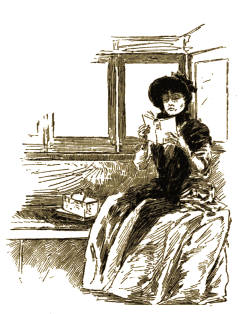
There the agony ended for the other girls, and there it began for Rhodora Boyd. In less than a year, Boyd had deserted her. The Commandant was transferred to the Pacific Coast. Rhodora moved, with her mother, bed-ridden now, into a little house in the unfashionable[43] outskirts of Trega. There she nursed the mother until the poor bed-ridden old lady died. Rhodora supported them both by teaching music and French at the Trega Seminary, down by the Falls. Morning and evening she went out and back on that weary, jingling horse-car line. She received the annual visits that her friends paid her, inspired by something between courtesy and charity, with her old stately simplicity and imperturbable calm; and no one of them could feel sure that she was conscious of their triumph or of her degradation. And she kept the best part of her stately beauty to the very last. In any other town she would have been taught what divorce-courts were made for; but Trega society was Episcopalian, and that communion is healthily and conservatively monogamous.
And so Rhodora Boyd, that once was Rhodora Pennington, died in her little house, and her pet old maid closed her eyes. And there was an end of Rhodora. Not quite an end, though.
| ✳ | |
| ✳ | ✳ |
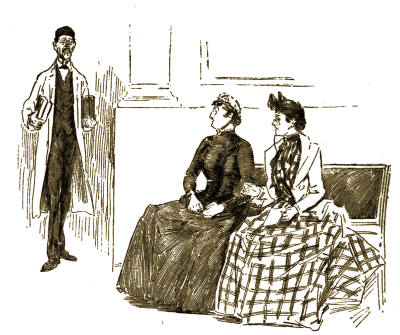
II.
Scene.—The Public Library of Trega. Mrs. George Lister and Mrs. John Lang are seated in the Rotunda. Mr. Libriver, the Librarian, advances to them with books in his hands.
Mrs. Lister.—Ah, here comes Mr. Libriver, with my “Intellectual Life.” Thank you, Mr. Libriver—you are always so kind!
Mrs. Lang.—And Mr. Libriver has brought me my “Status of Woman.” Oh, thank you, Mr. Libriver.
Mr. Libriver, a thin young man in a linen duster, retires, blushing.
Mrs. Lister.—Mr. Libriver does so appreciate women who are free from the bondage of the novel. Did you hear about poor Rhodora’s funeral?
Mrs. Lang (with a sweeping grasp at the intellectual side of the conversation).—Oh, I despise love-stories. In the church? Oh, yes, I heard. (Sweetly). Dr. Homly told me. Doesn’t it seem just a little—ostentatious?
Mrs. Lister.—Ostentatious—but, do you know, my dear, there are to be eight pall-bearers!
Mrs. Lang (turning defeat into victory).—No, I did not know. I don’t suppose that ridiculous old maid, that Miss Wimple, who seems to be conducting the affair, dared to tell that to Dr. Homly. And who are they?
Mrs. Lister (with exceeding sweetness).—Oh, I don’t know, dear. Only I met Mr. Townsend, and he told me that Dr. Homly had just told him that he was one of the eight.
Mrs. Lister.—Dexter Townsend! Why, it’s scandalous. Everybody knows that he proposed to her three times and that she threw him over. It’s an insult to—to—
Mrs. Lang.—To poor dear Alma Townsend. I quite agree with you. I should like to know how she feels—if she understands what it means.
Mrs. Lister.—Well, if I were in her place—
Enter Mrs. Dexter Townsend.
| Mrs. Lang. Mrs. Lister. |
} | Why, Alma! |
Mrs. Townsend.—Why, Ellen! Why, Mary! Oh, I’m so glad to meet you both. I want you to lunch with me to-morrow at one o’clock. I do so hate to be[46] left alone. And poor Rhodora Pennington—Mrs. Boyd, I mean—her funeral is at noon, and our three male protectors will have to go to the cemetery, and Mr. Townsend is just going to take a cold bite before he goes, and so I’m left to lunch—
Mrs. Lang (coldly).—I don’t think Mr. Lang will go to the cemetery—
Mrs. Lister.—There is no reason why Mr. Lister—
Mrs. Townsend.—But, don’t you know?—They’re all to be pall-bearers! They can’t refuse, of course.
Mrs. Lang (icily).—Oh, no, certainly not.
Mrs. Lister (below zero).—I suppose it is an unavoidable duty.
Mrs. Lang.—Alma, is that your old Surah? What did you do to it?
Mrs. Lister.—They do dye things so wonderfully nowadays!
Scene.—A Verandah in front of Mr. McCullom McIntosh’s house. Mrs. McCullom McIntosh seated, with fancy work. To her, enter Mr. William Jans and Mr. Milo Smith.
Mrs. McIntosh (with effusion).—Oh, Mr. Jans, I’m so delighted to see you! And Mr. Smith, too! I never expect to see you busy men at this time in the afternoon. And how is Laura?—and Millicent? Now don’t tell me that you’ve come to say that you can’t go fishing with Mr. McIntosh to-morrow! He’ll be so disappointed!
Mr. Jans.—Well, the fact is—
Mrs. McIntosh.—You haven’t been invited to be one of poor Rhodora Boyd’s pall-bearers, have you? That would be too absurd. They say she’s asked a regular party of her old conquests. Mr. Libriver just passed here and told me—Mr. Lister and John Lang and Dexter Townsend—
Mr. Jans.—Yes, and me.
Mrs. McIntosh.—Oh, Mr. Jans! And they do say—at least Mr. Libriver says—that she hasn’t asked a man who hadn’t proposed to her.
Mr. Jans (Dutchily).—I d’no. But I’m asked, and—
Mrs. McIntosh.—You don’t mean to tell me that Mr. Smith is asked, too? Oh, that would be too impossible. You don’t mean to tell me, Mr. Smith, that you furnished one of Rhodora’s scalps ten years ago?
Mr. Smith.—You ought to know, Mrs. McIntosh. Or—no—perhaps not. You and Mac were to windward of the centre-board on Townsend’s boat when I got the mitten. I suppose you couldn’t hear us. But we were to leeward, and Miss Pennington said she hoped all proposals didn’t echo.
Mrs. McIntosh.—The wretched c—— but she’s dead. Well, I’m thankful Mac—Mr. McIntosh never could abide that girl. He always said she was horribly bad form—poor thing, I oughtn’t to speak so, I suppose. She’s been punished enough.
Mr. Smith.—I’m glad you think so, Mrs. McIntosh. I hope you won’t feel it necessary to advise Mac to refuse her last dying request.
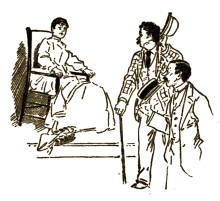
Mrs. McIntosh.—What—
Mr. Smith.—Oh, well, the fact is, Mrs. McIntosh, we only stopped in to say that as McIntosh and all the rest of us are asked to be pall-bearers at Mrs. Boyd’s funeral, you might ask Mac if it wouldn’t be just as well to postpone the fishing party for a week or so. If you remember—will you be so kind? Thank you, good afternoon.
Mr. Jans.—Good afternoon, Mrs. McIntosh.
Scene.—The Linen Closet, at the end of a sunny corridor in Mr. Alexander Sloan’s house. Mrs. Sloan inspecting her sheets and pillow-cases. To her, enter Bridget, her housemaid, with a basket full of linen, the Trega Evening Eagle on the top, folded.
Mrs. Sloan.—Why, that surely isn’t one of the new napkins!—oh, it’s the evening paper. Dear me! how near-sighted I am getting! (Takes it and opens it.) You may put those linen sheets on the top shelf, Bridget. We’ll hardly need them again this Fall. Oh, Bridget—here’s poor Mrs. Boyd’s obituary. You used to live at Colonel Pennington’s before she was married, didn’t you?
Bridget.—I did that, Mum.
Mrs. Sloan (reading).—“Mrs. Boyd’s pall-bearers are[49] fitly chosen from the most distinguished and prominent citizens of Trega.” I’m sure I don’t see why they should be. (Reads.) “Those invited to render the last honors to the deceased are Mr. George Lister—“
Bridget.—’Tis he was foriver at the house.
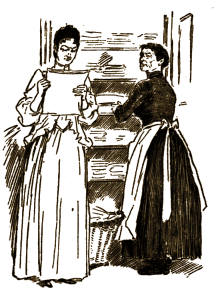
Mrs. Sloan (reads).—“Mr. John Lang—“
Bridget.—And him.
Mrs. Sloan (reads).—“Mr Dexter Townsend—“
Bridget.—And him, too.
Mrs. Sloan (reads).—“Mr. McIntosh, Mr. William Jans, Mr. Milo Smith—“
Bridget.—And thim. Mr. Smith was her siventh.
Mrs. Sloan.—Her what?
Bridget.—Her sivinth. There was eight of thim proposed to her in the wan week.
Mrs Sloan.—Why, Bridget! How can you possibly know that?
Bridget.—Sure, what does it mean whin a gintleman calls twice in th’ wake an’ thin stops like he was shot. An’ who is the eight’ gintleman to walk wid the corpse, Mum?
Mrs. Sloan.—That is all, Bridget. And those pillow-cases look shockingly! I never saw such ironing! (Exit, hastily and sternly.)
Bridget (sola).—Only siven of thim. Saints bless us! The pore lady’ll go wan-sided to her grave!
Scene.—The Private Office of Mr. Parker Hall. Mr. Hall writing. To him, enter Mr. Aleck Sloan.
Mr. Sloan.—Ah, there, Parker!
Mr. Hall.—Ah, there, Aleck! What brings you around so late in the day?
Mr. Sloan.—I just thought you might like to hear the names of the fellows Rhodora Pennington chose for her pall-bearers. (Produces list.)
Mr. Hall (sighs).—Poor Rhodora! Too bad! Fire ahead.
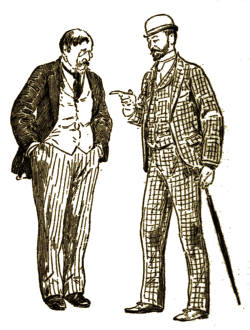
Mr. Sloan (reads list).—“George Lister.”
Mr. Hall.—Ah!
Mr. Sloan (reads).—“John Lang.”
Mr. Hall.—Oh!
Mr. Sloan (reads).—“Dexter Townsend.”
Mr. Hall.—Well!
Mr. Sloan (reads).—“McCullom McIntosh.”
Mr. Hall.—Say!—
Mr. Sloan (reads).—“William Jans.”
Mr. Hall.—The Deuce!
Mr. Sloan (reads).—“Milo Smith.”
Mr. Hall.—Great Cæsar’s ghost! This is getting very personal!
Mr. Sloan—Yes. (Reads, nervously.) “Alexander Sloan[51].”
Mr. Hall.—Whoo-o-o-o-up! You too?
Mr. Sloan (reads).—“Parker Hall.”
(A long silence.)
Mr. Hall (faintly).—Oh, lord, she rounded us up, didn’t she? Say, Parker, can’t this thing be suppressed, somehow?
Mr. Sloan.—It’s in the evening paper.
(Another long silence.)
Mr. Hall (desperately).—Come out and have a bottle with me?
Mr. Sloan.—I can’t. I’m going down to Bitts’s stable to buy that pony that Mrs. Sloan took such a shine to a month or so ago.
Mr. Hall.—If I could get out of this for a pony—Oh, lord!

THE TWO CHURCHES OF ’QUAWKET.
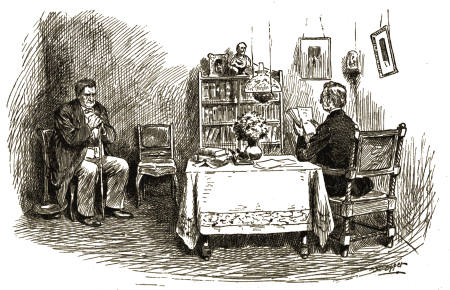
“’Read it!’ commanded Brother Joash. The minister grew pale.”
THE TWO CHURCHES OF ’QUAWKET.
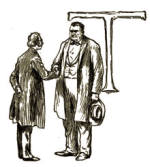
The Reverend Colton M. Pursly, of Aquawket, (commonly pronounced ’Quawket,) looked out of his study window over a remarkably pretty New England prospect, stroked his thin, grayish side-whiskers, and sighed deeply. He was a pale, sober, ill-dressed Congregationalist minister of forty-two or three. He had eyes of willow-pattern blue, a large nose, and a large mouth, with a smile of forced amiability in the corners. He was amiable, perfectly amiable and innocuous—but that smile sometimes made people with a strong sense of humor want to kill him. The smile lingered even while he sighed.
Mr. Pursly’s house was set upon a hill, although it was a modest abode. From his window he looked down one of those splendid streets that are the pride and glory of old towns in New England—a street fifty[56] yards wide, arched with grand Gothic elms, bordered with houses of pale yellow and white, some in the homelike, simple yet dignified colonial style, some with great Doric porticos at the street end. And above the billowy green of the tree-tops rose two shapely spires, one to the right, of granite, one to the left, of sand-stone. It was the sight of these two spires that made the Reverend Mr. Pursly sigh.
With a population of four thousand five hundred, ’Quawket had an Episcopal Church, a Roman Catholic Church, a Presbyterian Church, a Methodist Church, a Universalist Church, (very small,) a Baptist Church, a Hall for the “Seventh-Day Baptists,” (used for secular purposes every day but Saturday,) a Bethel, and—“The Two Churches”—as every one called the First and Second Congregational Churches. Fifteen years before, there had been but one Congregational Church, where a prosperous and contented congregation worshiped in a plain little old-fashioned red brick church on a side-street. Then, out of this very prosperity, came the idea of building a fine new free-stone church on Main Street. And, when the new church was half-built, the congregation split on the question of putting a “rain-box” in the new organ. It is quite unnecessary to detail how this quarrel over a handful of peas grew into a church war, with ramifications and interlacements and entanglements and side-issues and under-currents and embroilments of all sorts and conditions. In three years there was a First Congregational Church, in free-stone, solid, substantial, plain, and a Second Congregational[57] Church in granite, something gingerbready, but showy and modish—for there are fashions in architecture as there are in millinery, and we cut our houses this way this year and that way the next. And these two churches had half a congregation apiece, and a full-sized debt, and they lived together in a spirit of Christian unity, on Capulet and Montague terms. The people of the First Church called the people of the Second Church the “Sadduceeceders,” because there was no future for them, and the people of the Second Church called the people of the First Church the “Pharisee-mes”. And this went on year after year, through the Winters when the foxes hugged their holes in the ground within the woods about ’Quawket, through the Summers when the birds of the air twittered in their nests in the great elms of Main Street.
If the First Church had a revival, the Second Church had a fair. If the pastor of the First Church exchanged with a distinguished preacher from Philadelphia, the organist of the Second Church got a celebrated tenor from Boston and had a service of song. This system after a time created a class in both churches known as “the floats,” in contradistinction to the “pillars.” The floats went from one church to the other according to the attractions offered. There were, in the end, more floats than pillars.
The Reverend Mr. Pursly inherited this contest from his predecessor. He had carried it on for three years. Finally, being a man of logical and precise mental processes, he called the head men of his congregation[58] together, and told them what in worldly language might be set down thus:
There was room for one Congregational Church in ’Quawket, and for one only. The flock must be reunited in the parent fold. To do this a master stroke was necessary. They must build a Parish House. All of which was true beyond question—and yet—the church had a debt of $20,000 and a Parish House would cost $15,000.
And now the Reverend Mr. Pursly was sitting at his study window, wondering why all the rich men would join the Episcopal Church. He cast down his eyes, and saw a rich man coming up his path who could readily have given $15,000 for a Parish House, and who might safely be expected to give $1.50, if he were rightly approached. A shade of bitterness crept over Mr. Pursly’s professional smile. Then a look of puzzled wonder took possession of his face. Brother Joash Hitt was regular in his attendance at church and at prayer-meeting; but he kept office-hours in his religion, as in everything else, and never before had he called upon his pastor.
Two minutes later, the minister was nervously shaking hands with Brother Joash Hitt.
“I’m very glad to see you, Mr. Hitt,” he stammered, “very glad—I’m—I’m—“
“S’prised?” suggested Mr. Hitt, grimly.
“Won’t you sit down?” asked Mr. Pursly.
Mr. Hitt sat down in the darkest corner of the room, and glared at his embarrassed host. He was a[59] huge old man, bent, heavily-built, with grizzled dark hair, black eyes, skin tanned to a mahogany brown, a heavy square under-jaw, and big leathery dew-laps on each side of it that looked as hard as the jaw itself. Brother Joash had been all things in his long life—sea-captain, commission merchant, speculator, slave-dealer even, people said—and all things to his profit. Of late years he had turned over his capital in money-lending, and people said that his great claw-like fingers had grown crooked with holding the tails of his mortgages.
A silence ensued. The pastor looked up and saw that Brother Joash had no intention of breaking it.
“Can I do any thing for you, Mr. Hitt?” inquired Mr. Pursly.
“Ya-as,” said the old man. “Ye kin. I b’leeve you gin’lly git sump’n’ over ’n’ above your sellery when you preach a fun’l sermon?”
“Well, Mr. Hitt, it—yes—it is customary.”
“How much?”
“The usual honorarium is—h’m—ten dollars.”
“The—whut?”
“The—the fee.”
“Will you write me one for ten dollars?”
“Why—why—” said the minister, nervously; “I didn’t know that any one had—had died—“
“There hain’t no one died, ez I know. It’s my fun’l sermon I want.”
“But, my dear Mr. Hitt, I trust you are not—that you won’t—that—“
“Life’s a rope of sand, parson—you’d ought to[60] know that—nor we don’t none of us know when it’s goin’ to fetch loost. I’m most ninety now, ’n’ I don’t cal’late to git no younger.”
“Well,” said Mr. Pursly, faintly smiling; “when the time does come—“
“No, sir!” interrupted Mr. Hitt, with emphasis; “when the time doos come, I won’t have no use for it. Th’ ain’t no sense in the way most folks is berrid. Whut’s th’ use of puttin’ a man into a mahog’ny coffin, with a silver plate big’s a dishpan, an’ preachin’ a fun’l sermon over him, an’ costin’ his estate good money, when he’s only a poor deef, dumb, blind fool corpse, an’ don’t get no good of it? Naow, I’ve be’n to the undertaker’s, an’ hed my coffin made under my own sooperveesion—good wood, straight grain, no knots—nuthin’ fancy, but doorable. I’ve hed my tombstun cut, an’ chose my text to put onto it—’we brung nuthin’ into the world, an’ it is certain we can take nuthin’ out’—an’ now I want my fun’l sermon, jes’ as the other folks is goin’ to hear it who don’t pay nuthin’ for it. Kin you hev it ready for me this day week?”
“I suppose so,” said Mr. Pursly, weakly.
“I’ll call fer it,” said the old man. “Heern some talk about a Perrish House, didn’t I?”
“Yes,” began Mr. Pursly, his face lighting up.
“‘Tain’t no sech a bad idee,” remarked Brother Joash. “Wal, good day.” And he walked off before the minister could say any thing more.
| ✳ | ✳ | ✳ | ✳ | ✳ |
One week later, Mr. Pursly again sat in his study, looking at Brother Joash, who had a second time settled himself in the dark corner.
It had been a terrible week for Mr. Pursly. He and his conscience, and his dream of the Parish House, had been shut up together working over that sermon, and waging a war of compromises. The casualties in this war were all on the side of the conscience.
“Read it!” commanded Brother Joash. The minister grew pale. This was more than he had expected. He grew pale and then red and then pale again.
“Go ahead!” said Brother Joash.
“Brethren,” began Mr. Pursly, and then he stopped short. His pulpit voice sounded strange in his little study.
“Go ahead!” said Brother Joash.
“We are gathered together here to-day to pay a last tribute of respect and affection—“
“Clk!” There was a sound like the report of a small pistol. Mr. Pursly looked up. Brother Joash regarded him with stern intentness.
“—to one of the oldest and most prominent citizens of our town, a pillar of our church, and a monument of the civic virtues of probity, industry and wisdom, a man in whom we all took pride, and—“
“Clk!” Mr. Pursly looked up more quickly this time, and a faint suggestion of an expression just vanishing from Mr. Hitt’s lips awakened in his unsuspicious breast a horrible suspicion that Brother Joash had chuckled.
“—whose like we shall not soon again see in our[62] midst. The children on the streets will miss his familiar face—“
“Say!” broke in Brother Joash, “how’d it be for a delegation of child’n to foller the remains, with flowers or sump’n’? They’d volunteer if you give ’em the hint, wouldn’t they?”
“It would be—unusual,” said the minister.
“All right,” assented Mr. Hitt, “only an idee of mine. Thought they might like it. Go ahead!”
Mr. Pursly went ahead, haunted by an agonizing fear of that awful chuckle, if chuckle it was. But he got along without interruption until he reached a casual and guarded allusion to the widows and orphans without whom no funeral oration is complete. Here the metallic voice of Brother Joash rang out again.
“Say! Ef the widders and orphans send a wreath—or a Gates-Ajar—ef they do, mind ye!—you’ll hev it put a-top of the coffin, where folks’ll see it, wun’t ye?”
“Certainly,” said the Reverend Mr. Pursly, hastily; “his charities were unostentatious, as was the whole tenor of his life. In these days of spendthrift extravagance, our young men may well—“
“Say!” Brother Joash broke in once more. “Ef any one wuz to git up right there, an’ say that I wuz the derndest meanest, miserly, penurious, parsimonious old hunks in ’Quawket, you wouldn’t let him talk like that, would ye?”
“Unquestionably not, Mr. Hitt!” said the minister, in horror.
“Thought not. On’y thet’s whut I heern one o[63]’ your deacons say about me the other day. Didn’t know I heern him, but I did. I thought you wouldn’t allow no such talk as that. Go ahead!”
“I must ask you, Mr. Hitt,” Mr. Pursly said, perspiring at every pore, “to refrain from interruptions—or I—I really—can not continue.”
“All right,” returned Mr. Hitt, with perfect calmness. “Continner.”
Mr. Pursly continued to the bitter end, with no further interruption that called for remonstrance. There were soft inarticulate sounds that seemed to him to come from Brother Joash’s dark corner. But it might have been the birds in the Ampelopsis Veitchii that covered the house.
Brother Joash expressed no opinion, good or ill, of the address. He paid his ten dollars, in one-dollar bills, and took his receipt. But as the anxious minister followed him to the door, he turned suddenly and said:
“You was talkin’ ’bout a Perrish House?”
“Yes—“
“Kin ye keep a secret?”
“I hope so—yes, certainly, Mr. Hitt.”
“The’ ’ll be one.”
| ✳ | ✳ | ✳ | ✳ | ✳ |
“I feel,” said the Reverend Mr. Pursly to his wife, “as if I had carried every stone of that Parish House on my shoulders and put it in its place. Can you make me a cup of tea, my dear?”
| ✳ | ✳ | ✳ | ✳ | ✳ |
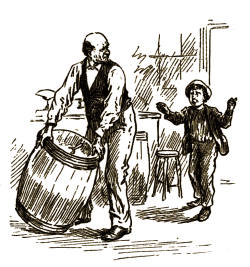
The Summer days had begun to grow chill, and the great elms of ’Quawket were flecked with patches and spots of yellow, when, early one morning, the meagre little charity-boy whose duty it was to black Mr. Hitt’s boots every day—it was a luxury he allowed himself in his old age—rushed, pale and frightened, into a neighboring grocery, and cried:
“Mist’ Hitt’s dead!”
“Guess not,” said the grocer, doubtfully. “Brother Hitt’s gut th’ Old Nick’s agency for ’Quawket, ’n’ I ain’t heerd th’t he’s been discharged for inattention to dooty.”
“He’s layin’ there smilin’,” said the boy.
“Smilin’?” repeated the grocer. “Guess I’d better go ’n’ see.”
In very truth, Brother Joash lay there in his bed, dead and cold, with a smile on his hard old lips, the first he had ever worn. And a most sardonic and discomforting smile it was.
| ✳ | ✳ | ✳ | ✳ | ✳ |
The Reverend Mr. Pursly read Mr. Hitt’s funeral address for the second time, in the First Congregational Church of ’Quawket. Every seat was filled; every ear[65] was attentive. He stood on the platform, and below him, supported on decorously covered trestles, stood the coffin that enclosed all that was mortal of Brother Joash Hitt. Mr. Pursly read with his face immovably set on the line of the clock in the middle of the choir-gallery railing. He did not dare to look down at the sardonic smile in the coffin below him; he did not dare to let his eye wander to the dark left-hand corner of the church, remembering the dark left-hand corner of his own study. And as he repeated each complimentary, obsequious, flattering platitude, a hideous, hysterical fear grew stronger and stronger within him that suddenly he would be struck dumb by the “clk!” of that mirthless chuckle that had sounded so much like a pistol-shot. His voice was hardly audible in the benediction.
| ✳ | ✳ | ✳ | ✳ | ✳ |
The streets of ’Quawket were at their gayest and brightest when the mourners drove home from the cemetery at the close of the noontide hour. The mourners were principally the deacons and elders of the First Church. The Reverend Mr. Pursly lay back in his seat with a pleasing yet fatigued consciousness of duty performed and martyrdom achieved. He was exhausted, but humbly happy. As they drove along, he looked with a speculative eye on one or two eligible sites for the Parish House. His companion in the carriage was Mr. Uriel Hankinson, Brother Joash’s lawyer, whose entire character had been aptly summed up by one of his[66] fellow-citizens in conferring on him the designation of “a little Joash for one cent.”
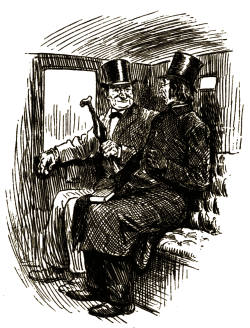
“Parson,” said Mr. Hankinson, breaking a long silence, “that was a fust-rate oration you made.”
“I’m glad to hear you say so,” replied Mr. Pursly, his chronic smile broadening.
“You treated the deceased right handsome, considerin’,” went on the lawyer Hankinson.
“Considering what?” inquired Mr. Pursly, in surprise.
“Considerin’—well, considerin’—“ replied Mr. Hankinson, with a wave of his hand. “You must feel to be reel disapp’inted ’bout the Parish House, I sh’d s’pose.”
“The Parish House?” repeated the Reverend Mr. Pursly, with a cold chill at his heart, but with dignity in his voice. “You may not be aware, Mr. Hankinson, that I have Mr. Hitt’s promise that we should have a Parish House. And Mr. Hitt was—was—a man of his word.” This conclusion sounded to his own ears a trifle lame and impotent.
“Guess you had his promise that there should be[67] a Parish House,” corrected the lawyer, with a chuckle that might have been a faint echo of Brother Joash’s.
“Well?”
“Well—the Second Church gits it. I draw’d his will. Good day, parson, I’ll ’light here. Air’s kind o’ cold, ain’t it?”
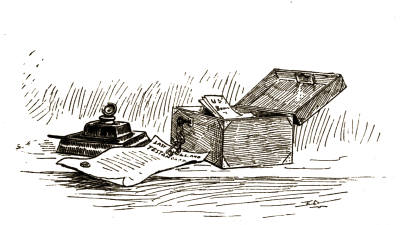
THE LOVE-LETTERS OF SMITH.
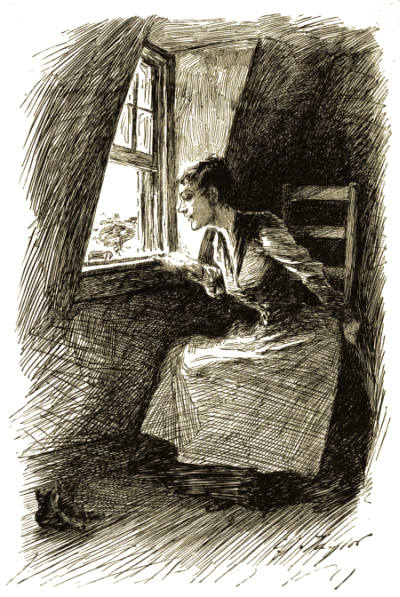
“A peculiar gritting noise made her look down.”
THE LOVE-LETTERS OF SMITH.
When the little seamstress had climbed to her room in the story over the top story of the great brick tenement house in which she lived, she was quite tired out. If you do not understand what a story over a top story is, you must remember that there are no limits to human greed, and hardly any to the height of tenement houses. When the man who owned that seven-story tenement found that he could rent another floor, he found no difficulty in persuading the guardians of our building laws to let him clap another story on the roof, like a cabin on the deck of a ship; and in the southeasterly of the four apartments on this floor the little seamstress lived. You could just see the top of her window from the street—the huge cornice that had capped the original front, and that served as her window-sill now, quite hid all the lower part of the story on top of the top-story.
The little seamstress was scarcely thirty years old, but she was such an old-fashioned little body in so many of her looks and ways that I had almost spelled her sempstress, after the fashion of our grandmothers. She[72] had been a comely body, too; and would have been still, if she had not been thin and pale and anxious-eyed.
She was tired out to-night because she had been working hard all day for a lady who lived far up in the “New Wards” beyond Harlem River, and after the long journey home, she had to climb seven flights of tenement-house stairs. She was too tired, both in body and in mind, to cook the two little chops she had brought home. She would save them for breakfast, she thought. So she made herself a cup of tea on the miniature stove, and ate a slice of dry bread with it. It was too much trouble to make toast.
But after dinner she watered her flowers. She was never too tired for that: and the six pots of geraniums that caught the south sun on the top of the cornice did their best to repay her. Then she sat down in her rocking chair by the window and looked out. Her eyry was high above all the other buildings, and she could look across some low roofs opposite, and see the further end of Tompkins Square, with its sparse Spring green showing faintly through the dusk. The eternal roar of the city floated up to her and vaguely troubled her. She was a country girl, and although she had lived for ten years in New York, she had never grown used to that ceaseless murmur. To-night she felt the languor of the new season as well as the heaviness of physical exhaustion. She was almost too tired to go to bed.
She thought of the hard day done and the hard day to be begun after the night spent on the hard little bed. She thought of the peaceful days in the country, when[73] she taught school in the Massachusetts village where she was born. She thought of a hundred small slights that she had to bear from people better fed than bred. She thought of the sweet green fields that she rarely saw nowadays. She thought of the long journey forth and back that must begin and end her morrow’s work, and she wondered if her employer would think to offer to pay her fare. Then she pulled herself together. She must think of more agreeable things, or she could not sleep. And as the only agreeable things she had to think about were her flowers, she looked at the garden on top of the cornice.
A peculiar gritting noise made her look down, and she saw a cylindrical object that glittered in the twilight, advancing in an irregular and uncertain manner toward her flower-pots. Looking closer, she saw that it was a pewter beer-mug, which somebody in the next apartment was pushing with a two-foot rule. On top of the beer-mug was a piece of paper, and on this paper was written, in a sprawling, half-formed hand:
porter
pleas excuse the libberty And
drink it
The seamstress started up in terror, and shut the window. She remembered that there was a man in the next apartment. She had seen him on the stairs, on Sundays. He seemed a grave, decent person; but—he must be drunk. She sat down on her bed, all a-tremble. Then she reasoned with herself. The man was drunk,[74] that was all. He probably would not annoy her further. And if he did, she had only to retreat to Mrs. Mulvaney’s apartment in the rear, and Mr. Mulvaney, who was a highly respectable man and worked in a boiler-shop, would protect her. So, being a poor woman who had already had occasion to excuse—and refuse—two or three “libberties” of like sort, she made up her mind to go to bed like a reasonable seamstress, and she did. She was rewarded, for when her light was out, she could see in the moonlight that the two-foot rule appeared again, with one joint bent back, hitched itself into the mug-handle, and withdrew the mug.
The next day was a hard one for the little seamstress, and she hardly thought of the affair of the night before until the same hour had come around again, and she sat once more by her window. Then she smiled at the remembrance. “Poor fellow,” she said in her charitable heart, “I’ve no doubt he’s awfully ashamed of it now. Perhaps he was never tipsy before. Perhaps he didn’t know there was a lone woman in here to be frightened.”
Just then she heard a gritting sound. She looked down. The pewter pot was in front of her, and the two-foot rule was slowly retiring. On the pot was a piece of paper, and on the paper was:
porter
good for the helth
it makes meet
This time the little seamstress shut her window[75] with a bang of indignation. The color rose to her pale cheeks. She thought that she would go down to see the janitor at once. Then she remembered the seven flights of stairs; and she resolved to see the janitor in the morning. Then she went to bed and saw the mug drawn back just as it had been drawn back the night before.
The morning came, but, somehow, the seamstress did not care to complain to the janitor. She hated to make trouble—and the janitor might think—and—and—well, if the wretch did it again she would speak to him herself, and that would settle it.
And so, on the next night, which was a Thursday, the little seamstress sat down by her window, resolved to settle the matter. And she had not sat there long, rocking in the creaking little rocking-chair which she had brought with her from her old home, when the pewter pot hove in sight, with a piece of paper on the top.
This time the legend read:
Perhaps you are afrade i will
adress you
i am not that kind
The seamstress did not quite know whether to laugh or to cry. But she felt that the time had come for speech. She leaned out of her window and addressed the twilight heaven.
“Mr.—Mr.—sir—I—will you please put your head out of the window so that I can speak to you[76]?”
The silence of the other room was undisturbed. The seamstress drew back, blushing. But before she could nerve herself for another attack, a piece of paper appeared on the end of the two-foot rule.
when i Say a thing i
mene it
i have Sed i would not
Adress you and i
Will not
What was the little seamstress to do? She stood by the window and thought hard about it. Should she complain to the janitor? But the creature was perfectly respectful. No doubt he meant to be kind. He certainly was kind, to waste these pots of porter on her. She remembered the last time—and the first—that she had drunk porter. It was at home, when she was a young girl, after she had had the diphtheria. She remembered how good it was, and how it had given her back her strength. And without one thought of what she was doing, she lifted the pot of porter and took one little reminiscent sip—two little reminiscent sips—and became aware of her utter fall and defeat. She blushed now as she had never blushed before, put the pot down, closed the window, and fled to her bed like a deer to the woods.
And when the porter arrived the next night, bearing the simple appeal:
Dont be afrade of it
drink it all
the little seamstress arose and grasped the pot firmly by the handle, and poured its contents over the earth around her largest geranium. She poured the contents out to the last drop, and then she dropped the pot, and ran back and sat on her bed and cried, with her face hid in her hands.
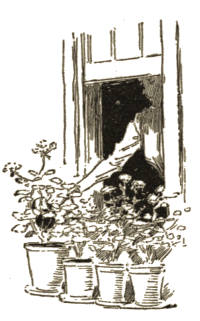
“Now,” she said to herself, “you’ve done it! And you’re just as nasty and hard-hearted and suspicious and mean as—as pusley!”
And she wept to think of her hardness of heart. “He will never give me a chance to say I am sorry,” she thought. And, really, she might have spoken kindly to the poor man, and told him that she was much obliged to him, but that he really mustn’t ask her to drink porter with him.
“But it’s all over and done now,” she said to herself as she sat at her window on Saturday night. And then she looked at the cornice, and saw the faithful little pewter pot traveling slowly toward her.
She was conquered. This act of Christian forbearance was too much for her kindly spirit. She read the inscription on the paper:
porter is good for Flours
but better for Fokes
and she lifted the pot to her lips, which were not half[78] so red as her cheeks, and took a good, hearty, grateful draught.

She sipped in thoughtful silence after this first plunge, and presently she was surprised to find the bottom of the pot in full view.
On the table at her side a few pearl buttons were screwed up in a bit of white paper. She untwisted the paper and smoothed it out, and wrote in a tremulous hand—she could write a very neat hand—
Thanks.
This she laid on the top of the pot, and in a moment the bent two-foot-rule appeared and drew the mail-carriage home. Then she sat still, enjoying the warm glow of the porter, which seemed to have permeated her entire being with a heat that was not at all like the unpleasant and oppressive heat of the atmosphere, an atmosphere heavy with the Spring damp. A gritting on the tin aroused her. A piece of paper lay under her eyes.
fine groing weather
Smith
it said.
Now it is unlikely that in the whole round and range of conversational commonplaces there was one other greeting that could have induced the seamstress to[79] continue the exchange of communications. But this simple and homely phrase touched her country heart. What did “groing weather” matter to the toilers in this waste of brick and mortar? This stranger must be, like herself, a country-bred soul, longing for the new green and the upturned brown mould of the country fields. She took up the paper, and wrote under the first message:
Fine
But that seemed curt; for she added: “for” what? She did not know. At last in desperation she put down potatos. The piece of paper was withdrawn and came back with an addition:
Too mist for potatos.
And when the little seamstress had read this, and grasped the fact that m-i-s-t represented the writer’s pronunciation of “moist,” she laughed softly to herself. A man whose mind, at such a time, was seriously bent upon potatos, was not a man to be feared. She found a half-sheet of note-paper, and wrote:
I lived in a small village before I came to New York, but I am afraid I do not know much about farming. Are you a farmer?
The answer came:
have ben most Every thing
farmed a Spel in Maine
Smith
As she read this, the seamstress heard a church clock strike nine.
“Bless me, is it so late?” she cried, and she hurriedly penciled Good Night, thrust the paper out, and closed the window. But a few minutes later, passing by, she saw yet another bit of paper on the cornice, fluttering in the evening breeze. It said only good nite, and after a moment’s hesitation, the little seamstress took it in and gave it shelter.
| ✳ | ✳ | ✳ | ✳ | ✳ |
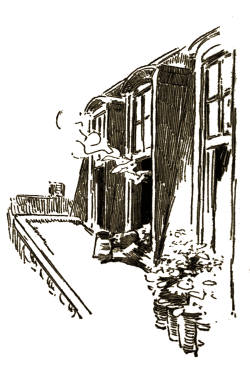
After this, they were the best of friends. Every evening the pot appeared, and while the seamstress drank from it at her window, Mr. Smith drank from its twin at his; and notes were exchanged as rapidly as Mr. Smith’s early education permitted. They told each other their histories, and Mr. Smith’s was one of travel and variety, which he seemed to consider quite a matter of course. He had followed the sea, he had farmed, he had been a logger and a hunter in the Maine woods. Now he was foreman of an East River lumber yard, and he[81] was prospering. In a year or two he would have enough laid by to go home to Bucksport and buy a share in a ship-building business. All this dribbled out in the course of a jerky but variegated correspondence, in which autobiographic details were mixed with reflections, moral and philosophical.
A few samples will give an idea of Mr. Smith’s style:
i was one trip to van demens
land
To which the seamstress replied:
It must have been very interesting.
But Mr. Smith disposed of this subject very briefly:
it wornt
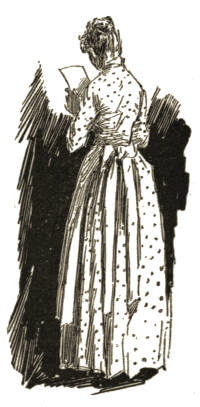
Further he vouchsafed:
i seen a chinese cook in hong kong could cook flapjacks like your Mother
a mishnery that sells Rum is the menest of Gods crechers
a bulfite is not what it is cract up to Be
the dagos are wussen the brutes
i am 6 1¾ but my Father was 6 foot 4
The seamstress had taught school one Winter, and[82] she could not refrain from making an attempt to reform Mr. Smith’s orthography. One evening, in answer to this communication:
i killd a Bare in Maine 600 lbs waight
she wrote:
Isn’t it generally spelled Bear?
but she gave up the attempt when he responded:
a bare is a mene animle any way you spel him
The Spring wore on, and the Summer came, and still the evening drink and the evening correspondence brightened the close of each day for the little seamstress. And the draught of porter put her to sleep each night, giving her a calmer rest than she had ever known during her stay in the noisy city; and it began, moreover, to make a little “meet” for her. And then the thought that she was going to have an hour of pleasant companionship somehow gave her courage to cook and eat her little dinner, however tired she was. The seamstress’s cheeks began to blossom with the June roses.
And all this time Mr. Smith kept his vow of silence unbroken, though the seamstress sometimes tempted him with little ejaculations and exclamations to which he might have responded. He was silent and invisible. Only the smoke of his pipe, and the clink of his mug as he set it down on the cornice, told her that a living, material Smith was her correspondent. They never met[83] on the stairs, for their hours of coming and going did not coincide. Once or twice they passed each other in the street—but Mr. Smith looked straight ahead of him, about a foot over her head. The little seamstress thought he was a very fine-looking man, with his six feet one and three-quarters and his thick brown beard. Most people would have called him plain.
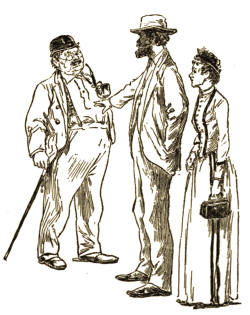
Once she spoke to him. She was coming home one Summer evening, and a gang of corner-loafers stopped her and demanded money to buy beer, as is their custom. Before she had time to be frightened, Mr. Smith appeared—whence, she knew not—scattered the gang like chaff, and, collaring two of the human hyenas, kicked them, with deliberate, ponderous, alternate kicks, until they writhed in ineffable agony. When he let them crawl away, she turned to him and thanked him warmly, looking very pretty now, with the color in her cheeks. But Mr. Smith answered no word. He stared over her head, grew red in the face, fidgeted nervously, but held his peace until his eyes fell on a rotund Teuton, passing by.
“Say, Dutchy!” he roared.
The German stood aghast.
“I ain’t got nothing to write with!” thundered Mr. Smith, looking him in the eye. And then the man of his word passed on his way.
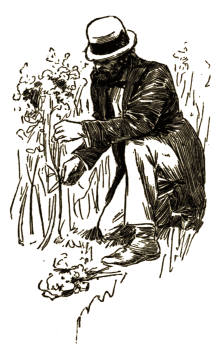
And so the Summer went on, and the two correspondents chatted silently from window to window, hid from sight of all the world below by the friendly cornice. And they looked out over the roof, and saw the green of Tompkins Square grow darker and dustier as the months went on.
Mr. Smith was given to Sunday trips into the suburbs, and he never came back without a bunch of daisies or black-eyed Susans or, later, asters or golden-rod for the little seamstress. Sometimes, with a sagacity rare in his sex, he brought her a whole plant, with fresh loam for potting.
He gave her also a reel in a bottle, which, he wrote, he had “maid” himself, and some coral, and a dried flying-fish, that was somewhat fearful to look upon, with its sword-like fins and its hollow eyes. At first, she could not go to sleep with that flying-fish hanging on the wall.
But he surprised the little seamstress very much one cool September evening, when he shoved this letter along the cornice:
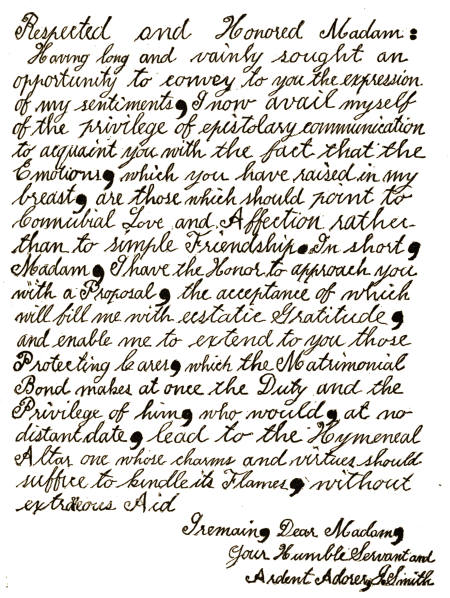
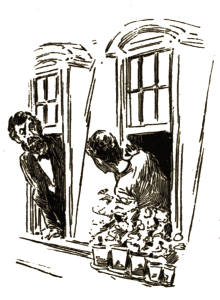
The little seamstress gazed at this letter a long time. Perhaps she was wondering in what Ready Letter-Writer of the last century Mr. Smith had found his form. Perhaps she was amazed at the results of his first attempt at punctuation. Perhaps she was thinking of something else, for there were tears in her eyes and a smile on her small mouth.
But it must have been a long time, and Mr. Smith must have grown nervous, for presently another communication came along the line where the top of the cornice was worn smooth. It read:
If not understood will you mary me
The little seamstress seized a piece of paper and wrote:
If I say Yes, will you speak to me?
Then she rose and passed it out to him, leaning out of the window, and their faces met.
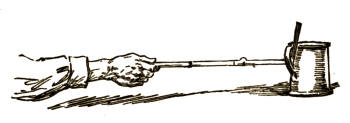
ZENOBIA’S INFIDELITY.
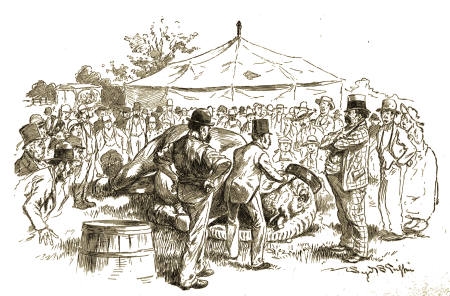
“’That there elephant’s been like my own child,’ groaned the keeper.”
ZENOBIA’S INFIDELITY
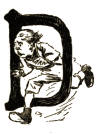
Dr. Tibbitt stood on the porch of Mrs. Pennypepper’s boarding-house, and looked up and down the deserted Main Street of Sagawaug with a contented smile, the while he buttoned his driving-gloves. The little doctor had good cause to be content with himself and with everything else—with his growing practice, with his comfortable boarding-house, with his own good-looks, with his neat attire, and with the world in general. He could not but be content with Sagawaug, for there never was a prettier country town. The Doctor looked across the street and picked out the very house that he proposed to buy when the one remaining desire of his soul was gratified. It was a house with a hip-roof and with a long garden running down to the river.
There was no one in the house to-day, but there was no one in any of the houses. Not even a pair of round bare arms was visible among the clothes that waved in the August breeze in every back-yard. It was Circus Day in Sagawaug.
The Doctor was climbing into his gig when a yell startled him. A freckled boy with saucer eyes dashed around the corner.
“Doctor!” he gasped, “come quick! The circus got a-fire an’ the trick elephant’s most roasted!”
“Don’t be silly, Johnny,” said the Doctor, reprovingly.
“Hope to die—Honest Injun—cross my breast!” said the boy. The Doctor knew the sacredness of this juvenile oath.
“Get in here with me,” he said, “and if I find you’re trying to be funny, I’ll drop you in the river.”
As they drove toward the outskirts of the town, Johnny told his tale.
“Now,” he began, “the folks was all out of the tent after the show was over, and one of the circus men, he went to the oil-barrel in the green wagon with Dan’l in the Lion’s Den onto the outside of it, an’ he took in a candle an’ left it there, and fust thing the barrel busted, an’ he wasn’t hurted a bit, but the trick elephant she was burned awful, an’ the ring-tailed baboon, he was so scared he had a fit. Say, did you know baboons had fits?”
When they reached the circus-grounds, they found a crowd around a small side-show tent. A strong odor of burnt leather confirmed Johnny’s story. Dr. Tibbitt pushed his way through the throng, and gazed upon the huge beast, lying on her side on the grass, her broad shoulder charred and quivering. Her bulk expanded and contracted with spasms of agony, and from time to[91] time she uttered a moaning sound. On her head was a structure of red cloth, about the size of a bushel-basket, apparently intended to look like a British soldier’s forage-cap. This was secured by a strap that went under her chin—if an elephant has a chin. This scarlet cheese-box every now and then slipped down over her eye, and the faithful animal patiently, in all her anguish, adjusted it with her prehensile trunk.
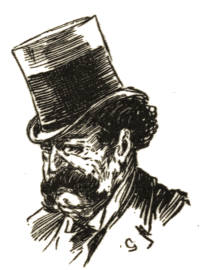
By her side stood her keeper and the proprietor of the show, a large man with a dyed moustache, a wrinkled face, and hair oiled and frizzed. These two bewailed their loss alternately.
“The boss elephant in the business!” cried the showman. “Barnum never had no trick elephant like Zenobia. And them lynes and Dan’l was painted in new before I took the road this season. Oh, there’s been a hoodoo on me since I showed ag’inst the Sunday-school picnic!”
“That there elephant’s been like my own child,” groaned the keeper, “or my own wife, I may say. I’ve slep’ alongside of her every night for fourteen damn years.”
The Doctor had been carefully examining his patient.
“If there is any analogy—” he began.
“Neuralogy!” snorted the indignant showman; “‘t ain’t neuralogy, you jay pill-box, she’s cooked!”
“If there is any analogy,” repeated Dr. Tibbitt,[92] flushing a little, “between her case and that of a human being, I think I can save your elephant. Get me a barrel of linseed oil, and drive these people away.”
The Doctor’s orders were obeyed with eager submission. He took off his coat, and went to work. He had never doctored an elephant, and the job interested him. At the end of an hour, Zenobia’s sufferings were somewhat alleviated. She lay on her side, chained tightly to the ground, and swaddled in bandages. Her groans had ceased.
“I’ll call to-morrow at noon,” said the Doctor—“good gracious, what’s that?” Zenobia’s trunk was playing around his waistband.
“She wants to shake hands with you,” her keeper explained. “She’s a lady, she is, and she knows you done her good.”
“I’d rather not have any thing of the sort,” said the Doctor, decisively.
When Dr. Tibbitt called at twelve on the morrow, he found Zenobia’s tent neatly roped in, an amphitheatre of circus-benches constructed around her, and this amphitheatre packed with people.
“Got a quarter apiece from them jays,” whispered the showman, “jest to see you dress them wownds.” Subsequently the showman relieved his mind to a casual acquaintance. “He’s got a heart like a gun-flint, that doctor,” he said; “made me turn out every one of them jays and give ’em their money back before he’d lay a hand to Zenobia.”
But if the Doctor suppressed the clinic, neither he[93] nor the showman suffered. From dawn till dusk people came from miles around to stare a quarter’s worth at the burnt elephant. Once in a while, as a rare treat, the keeper lifted a corner of her bandages, and revealed the seared flesh. The show went off in a day or two, leaving Zenobia to recover at leisure; and as it wandered westward, it did an increased business simply because it had had a burnt trick elephant. Such, dear friends, is the human mind.
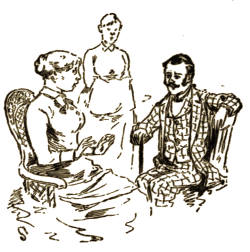
The Doctor fared even better. The fame of his new case spread far and wide. People seemed to think that if he could cure an elephant he could cure any thing. He was called into consultation in neighboring towns. Women in robust health imagined ailments, so as to send for him and ask him shuddering questions about “that wretched animal.” The trustees of the orphan-asylum made him staff-physician—in this case the Doctor thought he could trace a connection of ideas, in which children and a circus were naturally associated. And the local newspaper called him a savant.
He called every day upon Zenobia, who greeted him with trumpetings of joyful welcome. She also desired to shake hands with him, and her keeper had to sit on her head and hold her trunk to repress the familiarity. In two weeks she was cured, except for extensive[94] and permanent scars, and she waited only for a favorable opportunity to rejoin the circus.
The Doctor had got his fee in advance.
| ✳ | ✳ | ✳ | ✳ | ✳ |
Upon a sunny afternoon in the last of August, Dr. Tibbitt jogged slowly toward Sagawaug in his neat little gig. He had been to Pelion, the next town, to call upon Miss Minetta Bunker, the young lady whom he desired to install in the house with the garden running down to the river. He had found her starting out for a drive in Tom Matson’s dog-cart. Now, the Doctor feared no foe, in medicine or in love; but when a young woman is inscrutable as to the state of her affections, when the richest young man in the county is devoting himself to her, and when the young lady’s mother is backing the rich man, a young country doctor may well feel perplexed and anxious over his chance of the prize.
The Doctor was so troubled, indeed, that he paid no heed to a heavy, repeated thud behind him, on the macadamized road. His gentle little mare heard it, though, and began to curvet and prance. The Doctor was pulling her in, and calming her with a “Soo—Soo—down, girl, down!” when he interrupted himself to shout:
“Great Cæsar! get off me!”
Something like a yard of rubber hose had come in through the side of the buggy, and was rubbing itself against his face. He looked around, and the cold sweat stood out on him as he saw Zenobia, her chain dragging[95] from her hind-foot, her red cap a-cock on her head, trotting along by the side of his vehicle, snorting with joy, and evidently bent on lavishing her pliant, serpentine, but leathery caresses upon his person.
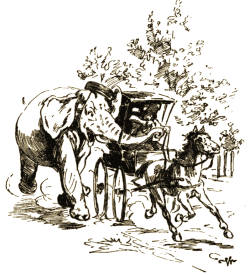
His fear vanished in a moment. The animal’s intentions were certainly pacific, to put it mildly. He reflected that if he could keep his horse ahead of her, he could toll her around the block and back toward her tent. He had hardly guessed, as yet, the depth of the impression which he had made upon Zenobia’s heart, which must have been a large organ, if the size of her ears was any indication—according to the popular theory.
He was on the very edge of the town, and his road took him by a house where he had a new and highly valued patient, the young wife of old Deacon Burgee. Her malady being of a nature that permitted it, Mrs. Burgee was in the habit of sitting at her window when the Doctor made his rounds, and indicating the satisfactory state of her health by a bow and a smile. On this occasion she fled from the window with a shriek. Her mother, a formidable old lady under a red false-front, came to the window, shrieked likewise, and slammed down the sash.
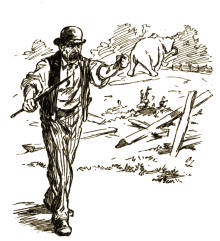
The Doctor tolled his elephant around the block without further misadventure, and they started up the road toward Zenobia’s tent, Zenobia caressing her benefactor while shudders of antipathy ran over his frame. In a few minutes the keeper hove in sight. Zenobia saw him first, blew a shrill blast on her trumpet, close to the Doctor’s ear, bolted through a snake fence, lumbered across a turnip-field, and disappeared in a patch of woods, leaving the Doctor to quiet his excited horse and to face the keeper, who advanced with rage in his eye.
“What do you mean, you cuss,” he began, “weaning a man’s elephant’s affections away from him? You ain’t got no more morals than a Turk, you ain’t. That elephant an’ me has been side-partners for fourteen years, an’ here you come between us.”
“I don’t want your confounded elephant,” roared the Doctor; “why don’t you keep it chained up?”
“She busted her chain to git after you,” replied the keeper. “Oh, I seen you two lally-gaggin’ all along the road. I knowed you wa’n’t no good the first time I set eyes on yer, a-sayin’ hoodoo words over the poor dumb beast.”
The Doctor resolved to banish “analogy” from his vocabulary.
| ✳ | ✳ | ✳ | ✳ | ✳ |
The next morning, about four o’clock, Dr. Tibbitt awoke with a troubled mind. He had driven home after midnight from a late call, and he had had an uneasy fancy that he saw a great shadowy bulk ambling along in the mist-hid fields by the roadside. He jumped out of bed and went to the window. Below him, completely covering Mrs. Pennypepper’s nasturtium bed, her prehensile trunk ravaging the early chrysanthemums, stood Zenobia, swaying to and fro, the dew glistening on her seamed sides beneath the early morning sunlight. The Doctor hastily dressed himself and slipped downstairs and out, to meet this Frankenstein’s-monster of affection.
There was but one thing to do. Zenobia would follow him wherever he went—she rushed madly through Mrs. Pennypepper’s roses to greet him—and his only course was to lead her out of the town before people began to get up, and to detain her in some remote meadow until he could get her keeper to come for her and secure her by force or stratagem. He set off by the least frequented streets, and he experienced a pang of horror as he remembered that his way led him past the house of his one professional rival in Sagawaug. Suppose Dr. Pettengill should be coming home or going out as he passed!
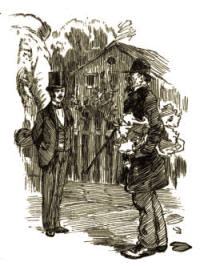
He did not meet Dr. Pettengill. He did meet Deacon Burgee, who stared at him with more of rage than of amazement in his wrinkled countenance. The Deacon was carrying a large bundle of embroidered linen and flannel, that must have been tied up in a hurry.
“Good morning, Deacon,” the Doctor hailed him,[98] with as much ease of manner as he could assume. “How’s Mrs. Burgee?”
“She’s doin’ fust rate, no thanks to no circus doctors!” snorted the Deacon. “An’ if you want to know any thing further concernin’ her health, you ask Dr. Pettengill. He’s got more sense than to go trailin’ around the streets with a parboiled elephant behind him, a-frightening women-folks a hull month afore the’r time.”
“Why, Deacon!” cried the Doctor, “what—what is it?”
“It’s a boy,” responded the Deacon, sternly; “and it’s God’s own mercy that ’twa’n’t born with a trunk and a tail.”
| ✳ | ✳ | ✳ | ✳ | ✳ |
The Doctor found a secluded pasture, near the woods that encircled the town, and there he sat him down, in the corner of a snake-fence, to wait until some farmer or market-gardener should pass by, to carry his message to the keeper. He had another message to[99] send, too. He had several cases that must be attended to at once. Unless he could get away from his pachydermatous familiar, Pettengill must care for his cases that morning. It was hard—but what was he to do?
Zenobia stood by his side, dividing her attention between the caresses she bestowed on him and the care she was obliged to take of her red cap, which was not tightly strapped on, and slipped in various directions at every movement of her gigantic head. She was unmistakably happy. From time to time she trumpeted cheerily. She plucked up tufts of grass, and offered them to the Doctor. He refused them, and she ate them herself. Once he took a daisy from her, absent-mindedly, and she was so greatly pleased that she smashed his hat in her endeavors to pet him. The Doctor was a kind-hearted man. He had to admit that Zenobia meant well. He patted her trunk, and made matters worse. Her elephantine ecstasy came near being the death of him.
Still the farmer came not, nor the market-gardener. Dr. Tibbitt began to believe that he had chosen a meadow that was too secluded. At last two boys appeared. After they had stared at him and at Zenobia for half-an-hour, one of them agreed to produce Dr. Pettengill and Zenobia’s keeper for fifty cents. Dr. Pettengill was the first to arrive. He refused to come nearer than the furthest limit of the pasture.
“Hello, Doctor,” he called out, “hear you’ve been seeing elephants. Want me to take your cases? Guess I can. Got a half-hour free. Brought some bromide down for you, if you’d like to try it[100].”
To judge from his face, Zenobia was invisible. But his presence alarmed that sensitive animal. She crowded up close to the fence, and every time she flicked her skin to shake off the flies she endangered the equilibrium of the Doctor, who was sitting on the top rail, for dignity’s sake. He shouted his directions to his colleague, who shouted back professional criticisms.
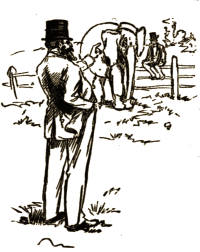
“Salicylate of soda for that old woman? What’s the matter with salicylate of cinchonidia? Don’t want to kill her before you get out of this swamp, do you?”
Dr. Tibbitt was not a profane man; but at this moment he could not restrain himself.
“Damn you!” he said, with such vigor that the elephant gave a convulsive start. The Doctor felt his seat depart from under him—he was going—going into space for a brief moment, and then he scrambled up out of the soft mud of the cow-wallow back of the fence on which he had been sitting. Zenobia had backed against the fence.
The keeper arrived soon after. He had only reached the meadow when Zenobia lifted her trunk in the air, emitted a mirthful toot, and struck out for the woods with the picturesque and cumbersome gallop of a mastodon pup.
“Dern you,” said the keeper to Dr. Tibbitt, who was trying to fasten his collar, which had broken loose in his fall; “if the boys was here, and I hollered ‘Hey[101] Rube!’—there wouldn’t be enough left of yer to spread a plaster fer a baby’s bile!”
The Doctor made himself look as decent as the situation allowed, and then he marched toward the town with the light of a firm resolve illuminating his face. The literature of his childhood had come to his aid. He remembered the unkind tailor who pricked the elephant’s trunk. It seemed to him that the tailor was a rather good fellow.
“If that elephant’s disease is gratitude,” thought the Doctor, “I’ll give her an antidote.”
He went to the drug-store, and, as he went, he pulled out a blank pad and wrote down a prescription, from mere force of habit. It read thus:
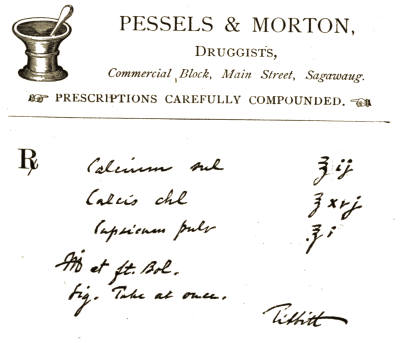
When the druggist looked at it, he was taken short of breath.
“What’s this?” he asked—“a bombshell?”
“Put it up,” said the Doctor, “and don’t talk so much.” He lingered nervously on the druggist’s steps, looking up and down the street. He had sent a boy to order the stable-man to harness his gig. By-and-by, the druggist put his head out of the door.
“I’ve got some asafœtida pills,” he said, “that are kind o’ tired, and half a pound of whale-oil soap that’s higher’n Haman—“
“Put ’em in!” said the Doctor, grimly, as he saw Zenobia coming in sight far down the street.
She came up while the Doctor was waiting for the bolus. Twenty-three boys were watching them, although it was only seven o’clock in the morning.
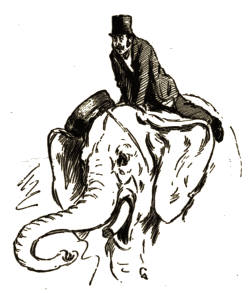
“Down, Zenobia!” said the Doctor, thoughtlessly, as he might have addressed a dog. He was talking with the druggist, and Zenobia was patting his ear with her trunk. Zenobia sank to her knees. The Doctor did not notice her. She folded her trunk about him, lifted him to her back, rose, with a heave and a sway, to her feet, and started up the road. The boys cheered. The Doctor got off on the end of an elm-branch. His descent was watched from nineteen second-story windows.
His gig came to meet him at last, and he entered it and drove rapidly out of town, with Zenobia trotting contentedly behind him. As soon as he had passed Deacon Burgee’s house, he drew rein, and Zenobia approached, while his perspiring mare stood on her hind-legs.
“Zenobia—pill!” said the Doctor.
As she had often done in her late illness, Zenobia opened her mouth at the word of command, and swallowed the infernal bolus. Then they started up again, and the Doctor headed for Zenobia’s tent.
But Zenobia’s pace was sluggish. She had been dodging about the woods for two nights, and she was tired. When the Doctor whipped up, she seized the buggy by any convenient projection, and held it back. This damaged the buggy and frightened the horse; but it accomplished Zenobia’s end. It was eleven o’clock before Jake Bumgardner’s “Half-Way-House” loomed up white, afar down the dusty road, and the Doctor knew that his round-about way had at length brought him near to the field where the circus-tent had been pitched.
He drove on with a lighter heart in his bosom. He had not heard Zenobia behind him, for some time. He did not know what had become of her, or what she was doing, but he learned later.
The Doctor had compounded a pill well calculated to upset Zenobia’s stomach. That it would likewise give her a consuming thirst he had not considered. But chemistry was doing its duty without regard to him. A[104] thirst like a furnace burned within Zenobia. Capsicum and chloride of lime were doing their work. She gasped and groaned. She searched for water. She filled her trunk at a wayside trough and poured the contents into her mouth. Then she sucked up a puddle or two. Then she came to Bumgardner’s, where a dozen kegs of lager-beer and a keg of what passed at Bumgardner’s for gin stood on the sidewalk. Zenobia’s circus experience had taught her what a water-barrel meant. She applied her knowledge. With her forefoot she deftly staved in the head of one keg after another, and with her trunk she drew up the beer and the gin, and delivered them to her stomach. If you think her taste at fault, remember the bolus.
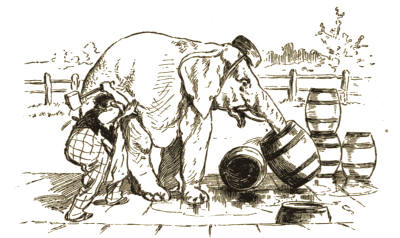
Bumgardner rushed out and assailed her with a bung-starter. She turned upon him and squirted lager-beer over him until he was covered with an iridescent lather of foam from head to foot. Then she finished the kegs and went on her way, to overtake the Doctor.
| ✳ | ✳ | ✳ | ✳ | ✳ |
The Doctor was speeding his mare merrily along, grateful for even a momentary relief from Zenobia’s attentions, when, at one and the same time, he heard a heavy, uncertain thumping on the road behind him, and the quick patter of a trotter’s hoofs on the road ahead of him. He glanced behind him first, and saw Zenobia. She swayed from side to side, more than was her wont. Her red cap was far down over her left eye. Her aspect was rakish, and her gait was unsteady. The Doctor did not know it, but Zenobia was drunk.
Zenobia was sick, but intoxication dominated her sickness. Even sulphide of calcium withdrew courteously before the might of beer and gin. Rocking from side to side, reeling across the road and back, trumpeting in imbecile inexpressive tones, Zenobia advanced.
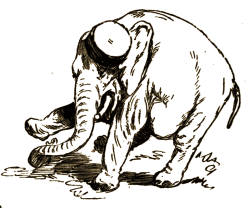
The Doctor looked forward. Tom Matson sat in his dog-cart, with Miss Bunker by his side. His horse had caught sight of Zenobia, and he was rearing high in air, and whinnying in terror. Before Tom could pull him down, he made a sudden break, overturned the dog-cart, and flung Tom and Miss Minetta Bunker on a bank by the side of the road. It was a soft bank, well-grown with mint and stinging-nettles, just above a creek. Tom had scarce landed before he was up and off, running hard across the fields.
Miss Minetta rose and looked at him with fire in her eyes.
“Well!” she said aloud; “I’d like Mother to see you now!”
The Doctor had jumped out of his gig and let his little mare go galloping up the road. He had his arm about Miss Minetta’s waist when he turned to face his familiar demon—which may have accounted for the pluck in his face.
But Zenobia was a hundred yards down the road, and she was utterly incapable of getting any further. She trumpeted once or twice, then she wavered like a reed in the wind; her legs weakened under her, and she sank on her side. Her red cap had slipped down, and she picked it up with her trunk, broke its band in a reckless swing that resembled the wave of jovial farewell, gave one titanic hiccup, and fell asleep by the roadside.
| ✳ | ✳ | ✳ | ✳ | ✳ |
An hour later, Dr. Tibbitt was driving toward Pelion, with Miss Bunker by his side. His horse had been stopped at the toll-gate. He was driving with one hand. Perhaps he needed the other to show how they could have a summer-house in the garden that ran down to the river.
| ✳ | ✳ | ✳ | ✳ | ✳ |
But it was evening when Zenobia awoke to find her keeper sitting on her head. He jabbed a cotton-hook[107] firmly and decisively into her ear, and led her homeward down the road lit by the golden sunset. That was the end of Zenobia’s infidelity.
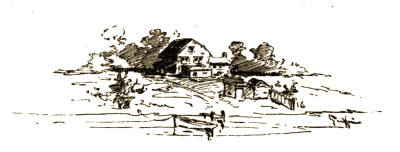
THE NINE CENT-GIRLS.
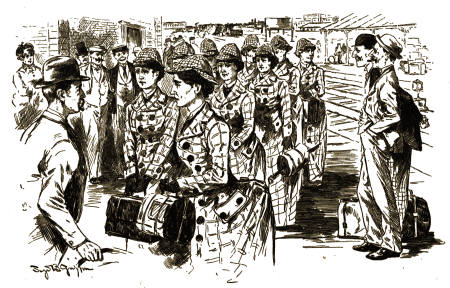
“He had an uneasy feeling that they were noticed.”
THE NINE CENT-GIRLS.
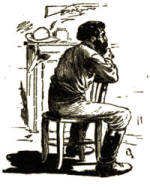
Miss Bessie Vaux, of Baltimore, paid a visit to her aunt, the wife of the Commandant at old Fort Starbuck, Montana. She had at her small feet all the garrison and some two dozen young ranch-owners, the flower of the younger sons of the best society of New York, Boston, and Philadelphia. Thirty-seven notches in the long handle of her parasol told the story of her three months’ stay. The thirty-seventh was final. She accepted a measly Second-Lieutenant, and left all the bachelors for thirty miles around the Fort to mourn her and to curse the United States Army. This is the proem.
| ✳ | ✳ | ✳ | ✳ | ✳ |
Mr. John Winfield, proprietor of the Winfield Ranch, sat a-straddle a chair in front of the fire in his big living room, and tugged at his handsome black beard as he discussed the situation with his foreman,[112] who was also his confidant, his best friend and his old college mate. Mr. Richard Cutter stood with his back to the fire, twirled a very blonde moustache and smoked cigarettes continually while he ministered to his suffering friend, who was sore wounded in his vanity, having been notch No. 36 on Miss Vaux’s parasol. Dick had been notch No. 1; but Dick was used to that sort of thing.
“By thunder,” said Mr. Winfield, “I’m going to get married this year, if I have to marry a widow with six children. And I guess I’ll have to. I’ve been ten years in this girlless wilderness, and I never did know any girls to speak of, at home. Now you, you always everlastingly knew girls. What’s that place you lived at in New York State—where there were so many girls?”
“Tusculum,” replied Mr. Cutter, in a tone of complacent reminiscence. “Nice old town, plastered so thick with mortgages that you can’t grow flowers in the front yard. All the fellows strike for New York as soon as they begin to shave. The crop of girls remains, and they wither on the stem. Why, one Winter they had a hump-backed man for their sole society star in the male line. Nice girls, too. Old families. Pretty, lots of them. Good form, too, for provincials.”
“Gad!” said Jack Winfield, “I’d like to live in Tusculum for a year or so.”
“No, you wouldn’t. It’s powerful dull. But the girls were nice. Now, there were the Nine Cent-Girls.”
“The Nine-cent Girls?”
“No, the Nine Cent-Girls. Catch the difference? They were the daughters of old Bailey, the civil engineer.[113] Nine of ’em, ranging from twenty-two, when I was there—that’s ten years ago—down to—oh, I don’t know—a kid in a pinafore. All looked just alike, barring age, and every one had the face of the Indian lady on the little red cent. Do you remember the Indian lady on the little red cent?”
“Hold on,” suggested Jack, rising; “I’ve got one. I’ve had it ever since I came.” He unlocked his desk, rummaged about in its depths, and produced a specimen of the neatest and most artistic coin that the United States government has ever struck.
“That’s it,” said Dick, holding the coppery disk in his palm. “It would do for a picture of any one of ’em—only the Bailey girls didn’t wear feathers in their hair. But there they were, nine of ’em, nice girls, every way, and the whole lot named out of the classics. Old Bailey was strong on the classics. His great-grandfather named Tusculum, and Bailey’s own name was M. Cicero Bailey. So he called all his girls by heathen names, and had a row with the parson every christening. Let me see—there was Euphrosyne, and Clelia, and Lydia, and Flora and Aurora—those were the twins—I was sweet on one of the twins—and Una—and, oh, I can’t remember them all. But they were mighty nice girls.”
“Probably all married by this time,” Jack groaned. “Let me look at that cent.” He held it in the light of the fire, and gazed thoughtfully upon it.
“Not a one,” Dick assured him. “I met a chap from Tusculum last time I was in Butte City, and I[114] asked him. He said there’d been only one wedding in Tusculum in three years, and then the local paper had a wire into the church and got out extras.”
“What sort of girls were they?” Winfield asked, still regarding the coin.
“Just about like that, for looks. Let me see it again.” Dick examined the cent critically, and slipped it into his pocket, in an absent-minded way. “Just about like that. First rate girls. Old man was as poor as a church mouse; but you would never have known it, the way that house was run. Bright girls, too—at least, my twin was. I’ve forgotten which twin it was; but she was too bright for me.”
“And how old did you say they were? How old was the youngest?”
“Oh, I don’t know,” replied Dick, with a bachelor’s vagueness on the question of a child’s age, “five—six—seven, may be. Ten years ago, you know.”
“Just coming in to grass,” observed Mr. Winfield, meditatively.
| ✳ | ✳ | ✳ | ✳ | ✳ |
Two months after the evening on which this conversation took place, Mr. Richard Cutter walked up one of the quietest and most eminently respectable of the streets of Tusculum.
Mr. Cutter was nervous. He was, for the second time, making up his mind to attempt a difficult and delicate task. He had made up his mind to it, or had had it made up for him; but now he felt himself obliged[115] to go over the whole process in his memory, in order to assure himself that the mind was really made up.
The suggestion had come from Winfield. He remembered with what a dazed incomprehension he had heard his chum’s proposition to induce Mr. Bailey and all his family to migrate to Montana and settle at Starbuck.
“We’ll give the old man all the surveying he wants. And he can have Ashford’s place on the big dam when Ashford goes East in August. Why, the finger of Providence is pointing Bailey straight for Starbuck.”
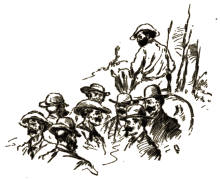
With a clearer remembrance of Eastern conventionalities than Mr. Winfield, Dick Cutter had suggested various obstacles in the way of this apparently simple scheme. But Winfield would hear of no opposition, and he joined with him eight other young ranchmen, who entered into the idea with wild Western enthusiasm and an Arcadian simplicity that could see no chance of failure. These energetic youths subscribed a generous fund to defray the expenses of Mr. Cutter as a missionary to Tusculum; and Mr. Cutter had found himself committed to the venture before he knew it.
Now, what had seemed quite feasible in Starbuck’s wilds wore a different face in prim and proper Tusculum. It dawned on Mr. Cutter that he was about to make a most radical and somewhat impudent proposition to a conservative old gentleman. The atmosphere of[116] Tusculum weighed heavy on its spirits, which were light and careless enough in his adopted home in Montana.
Therefore Mr. Cutter found his voice very uncertain as he introduced himself to the young lady who opened, at his ring, the front door of one of the most respectable houses in that respectable street of Tusculum.
“Good morning,” he said, wondering which one of the Nine Cent-Girls he saw before him; and then, noting a few threads of gray in her hair, he ventured:
“It’s Miss—Miss Euphrosyne, isn’t it? You don’t remember me—Mr. Cutter, Dick Cutter? Used to live on Ovid Street. Can I see your father?”
“My father?” repeated Miss Euphrosyne, looking a little frightened.
“Yes—I just want—“
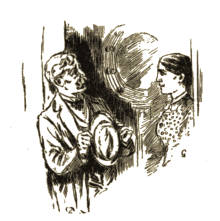
“Why, Mr. Cutter—I do remember you now—didn’t you know that Papa died nine years ago—the year after you left Tusculum?”
Dick Cutter leaned against the door-jamb and stared speechlessly at Euphrosyne. He noted vaguely that she looked much the same as when he had last seen her, except that she looked tired and just a shade sad. When he was able to think, he said that he begged her pardon. Then she smiled, faintly.
“We couldn’t expect you to know,” she said, simply. “Won’t you come in?”
“N-N-No,” stuttered Dick. “I-I-I’ll call later—this[117] evening, if you don’t mind. Ah—ah—good day.” And he fled to his hotel, to pull himself together, leaving Miss Euphrosyne smiling.
He sat alone in his room all the afternoon, pondering over the shipwreck of his scheme. What should he tell the boys? What would the boys say? Why had he not thought to write before he came? Why on earth had Bailey taken it into his head to die?
After supper, he resolved to call as he had promised. Mrs. Bailey, he knew, had died a year after the appearance of her ninth daughter. But, he thought, with reviving hope, there might be a male head to the family—an uncle, perhaps.
The door was opened by Clytie, the youngest of the nine. She ushered him at once into a bright little parlor, hung around with dainty things in artistic needlework and decorative painting. A big lamp glowed on a centre-table, and around it sat seven of the sisters, each one engaged in some sort of work, sewing, embroidering or designing. Nearest, the lamp sat Euphrosyne, reading Macaulay aloud. She stopped as he entered, and welcomed him in a half-timid but wholly friendly fashion.
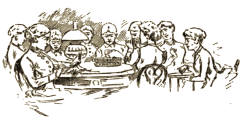
Dick sat down, very much embarrassed, in spite of the greeting. It was many years since he had talked to nine ladies at once. And, in truth, a much less embarrassed man might have found himself more or less[118] troubled to carry on a conversation with nine young women who looked exactly like each other, except for the delicate distinctions of age which a masculine stranger might well be afraid to note. Dick looked from one to the other of the placid classic faces, and could not help having an uneasy idea that each new girl that he addressed was only the last one who had slipped around the table and made herself look a year or two older or younger.
But after a while the pleasant, genial, social atmosphere of the room, sweet with a delicate, winning virginity, thawed out his awkward reserve, and Dick began to talk of the West and Western life until the nine pairs of blue eyes, stretched to their widest, fixed upon him as a common focus. It was eleven when he left, with many apologies for his long call. He found the night and the street uncommonly dark, empty and depressing.
“Just the outfit!” he observed to himself. “And old Bailey dead and the whole scheme busted.”
For he had learned that the Nine Cent-Girls had not a relative in the world. Under these circumstances, it was clearly his duty to take the morning train for the West. And yet, the next evening, he presented himself, shamefaced and apologetic, at the Bailey’s door.
He thought that he wanted to make some sort of explanation to Miss Euphrosyne. But what explanation could he make? There was no earthly reason for his appearance in Tusculum. He talked of the West until eleven o’clock, and then he took a hesitating leave.
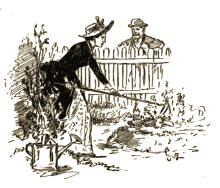
The next day he made a weak pretense of casually[119] passing by when he knew that Miss Euphrosyne was working in the garden; but he found it no easier to explain across the front fence. The explanation never would have been made if it had not been for Miss Euphrosyne. A curious nervousness had come over her, too, and suddenly she spoke out.
“Mr. Cutter—excuse me—but what has brought you here? I mean is it any thing that concerns us—or—or—Papa’s affairs! I thought everything was settled—I had hoped—“
There was nothing for it now but to tell the whole story, and Dick told it.
“I suppose you’ll think we’re a pack of barbarians,” he said, when he had come to the end, “and, of course, it’s all impracticable now.”
But Miss Euphrosyne did not seem to be offended—only thoughtful.
“Can you call here to-morrow at this time, Mr. Cutter?” she inquired.
| ✳ | ✳ | ✳ | ✳ | ✳ |
Miss Euphrosyne blushed faintly when Dick presented himself to hear judgement pronounced.
“I suppose you will think it strange,” she said, “but if your plan is feasible, I should wish to carry it[120] out. Frankly, I do want to see the girls married. Clelia and Lydia and I are past the time when women think about such things—but Clytie—and the rest. And, you know, I can remember how Papa and Mama lived together, and sometimes it seems cruelly hard that those dear girls should lose all that happiness—I’m sure it’s the best happiness in the world. And it can never be, here. Now, if I could get occupation—you know that I’m teaching school, I suppose—and if the rest of the girls could keep up their work for the New York people—why—don’t you know, if I didn’t tell—if I put it on business grounds, you know—I think they would feel that it was best, after all, to leave Tusculum....”
Her voice was choked when she recommenced.
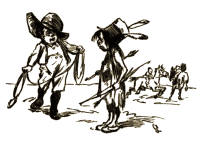
“It seems awful for me to talk to you in this cold-blooded way about such a thing; but—what can we do, Mr. Cutter? You don’t know how poor we are. There’s nothing for my little Clytie to do but to be a dressmaker—and you know what that means, in Tusculum. Oh, do you think I could teach school out in Star—Star—Starbuckle?”
Miss Euphrosyne was crying.
Dick’s census of possible pupils in the neighborhood of Starbuck satisfied Miss Euphrosyne. It troubled Dick’s conscience a bit, as he walked back to the hotel. “But they’ll all be married off before she finds it out, so I guess it’s all right,” he reflected.
| ✳ | ✳ | ✳ | ✳ | ✳ |
The next week Dick went to New York. This was in pursuance of an idea which he had confided to Winfield, on the eve of his forth-setting.
“Why,” Winfield had said to him, “you are clean left out of this deal, aren’t you?”
“Of course I am,” said Dick. “How am I going to marry a poor girl on a hundred dollars a month?”
“I might set you up for yourself—” began his employer.
“Hold on!” broke in Dick Cutter, with emphasis. “You wouldn’t talk that way if you’d ever been hungry yourself. I ’most starved that last time I tried for myself; and I’d starve next trip, sure. You’ve been a good friend to me, Jack Winfield. Don’t you make a damn fool of yourself and spoil it all.”
“But,” he added, after a pause, “I have a little racket of my own. There’s a widow in New York who smiled on yours affectionately once, ere she wed Mammon. I’m going just to see if she feels inclined to divide the late lamented’s pile with a blonde husband.”
So, the business at Tusculum being determined, and preparations for the hegira well under way, Dick went to look after his own speculation.
He reached New York on Tuesday morning, and called on the lady of his hopes that afternoon. She was out. He wrote to her in the evening, asking when he might see her. On Thursday her wedding-cards came to his hotel by special messenger. He cursed his luck, and went cheerfully about attending to a commission which Miss Euphrosyne, after much urging, had given[122] him, trembling at her own audacity. The size of it had somewhat staggered him. She asked him to take an order to a certain large dry-goods house for nine traveling ulsters, (ladies’, medium weight, measurements enclosed,) for which he was to select the materials.
“Men have so much taste,” said Miss Euphrosyne. “Papa always knew when we were well dressed.”
Dick had to wait while another customer was served. He stared at her in humble admiration. It was a British actress, recently imported.
| ✳ | ✳ | ✳ | ✳ | ✳ |
When Mr. Richard Cutter sat on the platform of Tusculum station and saw his nine charges approach, ready for the long trip to the Far West, it struck him that the pinky-dun ulsters with the six-inch-square checks of pale red and blue did not look, on these nine virgins, as they looked on the British actress. It struck him, moreover, that the nine “fore-and-aft,” or “deer-stalker” caps which he had thrown in as Friendship’s Offering only served to more accentuate a costume already accentuated.
But it was too late for retreat. The Baileys had burned their bridges behind them. The old house was sold. Their lot was cast in Montana. He had his misgivings; but he handed them gallantly into the train—it was not a vestibule express, for economy forbade—and they began their journey.
He had an uneasy feeling that they were noticed;[123] that the nine ladies in the ulsters of one pattern—and of the pattern of his choosing—were attracting more attention than any ladies not thus uniformed would have attracted; but he was not seriously disturbed until a loquacious countryman sat down beside him.
“Runnin’ a lady base-ball nine, be ye?” he inquired. “I seen one, wunst, down to Ne’ York. They can’t play ball not to speak of; but it’s kinder fun lookin’ at ’em. Couldn’t ye interdooce me to the pitcher?”
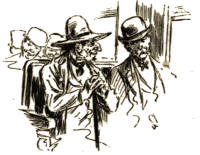
Mr. Cutter made a dignified reply, and withdrew to the smoking-car. There a fat and affable stranger tapped him on the back and talked in his ear from the seat behind.
“It don’t pay, young man,” he said. “I’ve handled ’em. Female minstrels sounds first rate; but they don’t give the show that catches the people. You’ve gotter have reel talent kinder mixed in with them if you want to draw.”
“Them ladies in your comp’ny, where do they show?” inquired the Conductor, as he examined the ten tickets that Dick presented.
“What do you mean?” asked the irritated pioneer.
“If they show in Cleveland, I’d like to go, first rate,” the Conductor explained.
“Those ladies,” Dick thundered, at the end of his patience, “are not actresses!”
“Hmf! What be they then?” asked the Conductor.
| ✳ | ✳ | ✳ | ✳ | ✳ |
They had arrived at Buffalo. They had gone to the Niagara Hotel, and had been told that there were no rooms for them; and to the Tifft House, where there were no rooms; and to the Genesee, where every room was occupied. Finally they had found quarters in a very queer hotel, where the clerk, as he dealt out the keys, said:
“One for Lily, and one for Daisy and one for Rosie—here, Boss, sort out the flower-bed yourself,” as he handed over the bunch.
Dick was taking a drink in the dingy bar-room, and trying to forget the queer looks that had been cast at his innocent caravan all the day, when the solitary hall-boy brought a message summoning him to Miss Euphrosyne’s room. He went, with his moral tail between his mental legs.
“Mr. Cutter,” said Miss Euphrosyne, firmly, “we have made a mistake.”
“It looks that way,” replied Dick, feebly; “but may be it’s only the—the ulsters.”
“No,” said Miss Euphrosyne. “The ulsters are a part of it; but the whole thing is wrong, Mr. Cutter; and I see it all now. I didn’t realize what it meant. But my eyes have been opened. Nine young unmarried women can not go West with a young man—if you had heard what people were saying all around us in the cars—you don’t know. We’ve got to give up the idea. Oh, but it was awful!”
Miss Euphrosyne, trembling, hid her face in her hands. Her tears trickled out through her thin fingers.
“And the old house is sold! What shall we do? Where shall we go?” she cried, forgetting Dick utterly, lost and helpless.
Dick was stalking up and down the room.
“It would be all right,” he demanded, “if there was a married woman to lead the gang, and if—if—if we caught on to something new in the ulster line?”
“It might be different,” Miss Euphrosyne admitted, with a sob. Speaking came hard to her. She was tired: well nigh worn out.
“THEN,” said Dick, with tremendous emphasis, “what’s the matter with my marrying one of you?”
“Why, Mr. Cutter!” Miss Euphrosyne cried, “I had no idea that you—you—ever—thought of—is it Clytie?”
“No,” said Mr. Cutter, “it isn’t Clytie.”
“Is it—is it—” Miss Euphrosyne’s eyes lit up with hope long since extinguished, “is it Aurora?”
“No!”
Dick Cutter could have been heard three rooms off.
“No!” he said, with all his lungs. “It ain’t Clytie, nor it ain’t Aurora, nor it ain’t Flora, nor Melpomene nor Cybele nor Alveolar Aureole nor none of ’em. It’s YOU—Y-O-U! I want to marry you, and what’s more, I’m going to!”
“Oh! oh! oh! oh!” said poor Miss Euphrosyne, and hid her face in her hands. She had never thought to be happy, and now she was happy for one moment. That seemed quite enough for her modest soul. And yet more was to come.
For once in his life, Dick Cutter seized the right moment to do the right thing. One hour later, Miss Euphrosyne Bailey was Mrs. Richard Cutter. She did not know quite how it happened. Clytie told her she had been bullied into it. But oh! such sweet bullying!
| ✳ | ✳ | ✳ | ✳ | ✳ |
“No,” said Mr. Richard Cutter one morning in September of the next year, to Mr. Jack Winfield and his wife, (Miss Aurora Bailey that was,) “I can’t stop a minute. We’re too busy up at the ranch. The Wife has just bought out Wilkinson; and I’ve got to round up all his stock. I’ll see you next month, at Clytie’s wedding. Queer, she should have gone off the last, ain’t it? Euphrosyne and I are going down to Butte City Monday, to buy her a present. Know anybody who wants to pay six per cent. for a thousand?”

THE NICE PEOPLE.
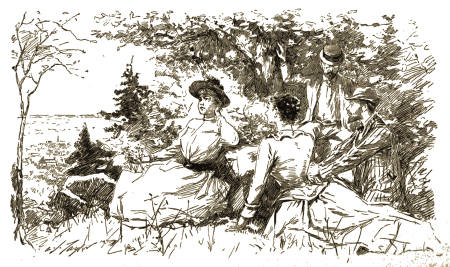
“We looked off from the brow of the mountain over fifteen miles of billowing green.”
THE NICE PEOPLE.
“They certainly are nice people,” I assented to my wife’s observation, using the colloquial phrase with a consciousness that it was any thing but “nice” English, “and I’ll bet that their three children are better brought up than most of—“
“Two children,” corrected my wife.
“Three, he told me.”
“My dear, she said there were two.”
“He said three.”
“You’ve simply forgotten. I’m sure she told me they had only two—a boy and a girl.”
“Well, I didn’t enter into particulars.”
“No, dear, and you couldn’t have understood him. Two children.”
“All right,” I said; but I did not think it was all right. As a near-sighted man learns by enforced observation to recognize persons at a distance when the face is not visible to the normal eye, so the man with a bad memory learns, almost unconsciously, to listen carefully and report accurately. My memory is bad; but I had not had time to forget that Mr. Brewster Brede had told[130] me that afternoon that he had three children, at present left in the care of his mother-in-law, while he and Mrs. Brede took their Summer vacation.
“Two children,” repeated my wife; “and they are staying with his aunt Jenny.”
“He told me with his mother-in-law,” I put in. My wife looked at me with a serious expression. Men may not remember much of what they are told about children; but any man knows the difference between an aunt and a mother-in-law.
“But don’t you think they’re nice people?” asked my wife.
“Oh, certainly,” I replied. “Only they seem to be a little mixed up about their children.”
“That isn’t a nice thing to say,” returned my wife.
I could not deny it.
| ✳ | ✳ | ✳ | ✳ | ✳ |
And yet, the next morning, when the Bredes came down and seated themselves opposite us at table, beaming and smiling in their natural, pleasant, well-bred fashion, I knew, to a social certainty, that they were “nice” people. He was a fine-looking fellow in his neat tennis-flannels, slim, graceful, twenty-eight or thirty years old, with a Frenchy pointed beard. She was “nice” in all her pretty clothes, and she herself was pretty with that type of prettiness which outwears most other types—the prettiness that lies in a rounded figure, a dusky skin, plump, rosy cheeks, white teeth and black[131] eyes. She might have been twenty-five; you guessed that she was prettier than she was at twenty, and that she would be prettier still at forty.
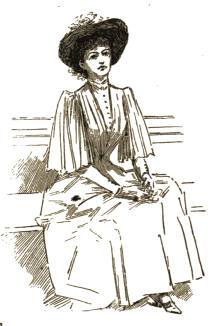
And nice people were all we wanted to make us happy in Mr. Jacobus’s Summer boarding-house on top of Orange Mountain. For a week we had come down to breakfast each morning, wondering why we wasted the precious days of idleness with the company gathered around the Jacobus board. What joy of human companionship was to be had out of Mrs. Tabb and Miss Hoogencamp, the two middle-aged gossips from Scranton, Pa.—out of Mr. and Mrs. Biggle, an indurated head-bookkeeper and his prim and censorious wife—out of old Major Halkit, a retired business man, who, having once sold a few shares on commission, wrote for circulars of every stock company that was started, and tried to induce every one to invest who would listen to him? We looked around at those dull faces, the truthful indices of mean and barren minds, and decided that we would leave that morning. Then we ate Mrs. Jacobus’s biscuit, light as Aurora’s cloudlets, drank her honest coffee, inhaled the perfume of the late azaleas with which she decked her table, and decided to postpone our departure one more day. And then we wandered out to take our morning glance at what we called “our view;” and it seemed to us as if[132] Tabb and Hoogencamp and Halkit and the Biggleses could not drive us away in a year.
I was not surprised when, after breakfast, my wife invited the Bredes to walk with us to “our view.” The Hoogencamp-Biggle-Tabb-Halkit contingent never stirred off Jacobus’s verandah; but we both felt that the Bredes would not profane that sacred scene. We strolled slowly across the fields, passed through the little belt of woods, and as I heard Mrs. Brede’s little cry of startled rapture, I motioned to Brede to look up.
“By Jove!” he cried, “heavenly!”
We looked off from the brow of the mountain over fifteen miles of billowing green, to where, far across a far stretch of pale blue lay a dim purple line that we knew was Staten Island. Towns and villages lay before us and under us; there were ridges and hills, uplands and lowlands, woods and plains, all massed and mingled in that great silent sea of sunlit green. For silent it was to us, standing in the silence of a high place—silent with a Sunday stillness that made us listen, without taking thought, for the sound of bells coming up from the spires that rose above the tree-tops—the tree-tops that lay as far beneath us as the light clouds were above us that dropped great shadows upon our heads and faint specks of shade upon the broad sweep of land at the mountain’s foot.
“And so that is your view?” asked Mrs. Brede, after a moment; “you are very generous to make it ours, too.”
Then we lay down on the grass, and Brede began[133] to talk, in a gentle voice, as if he felt the influence of the place. He had paddled a canoe, in his earlier days, he said, and he knew every river and creek in that vast stretch of landscape. He found his landmarks, and pointed out to us where the Passaic and the Hackensack flowed, invisible to us, hidden behind great ridges that in our sight were but combings of the green waves upon which we looked down. And yet, on the further side of those broad ridges and rises were scores of villages—a little world of country life, lying unseen under our eyes.
“A good deal like looking at humanity,” he said: “there is such a thing as getting so far above our fellow-men that we see only one side of them.”
Ah, how much better was this sort of talk than the chatter and gossip of the Tabb and the Hoogencamp—than the Major’s dissertations upon his everlasting circulars! My wife and I exchanged glances.
“Now, when I went up the Matterhorn,” Mr. Brede began.
“Why, dear,” interrupted his wife; “I didn’t know you ever went up the Matterhorn.”
“It—it was five years ago,” said Mr. Brede, hurriedly. “I—I didn’t tell you—when I was on the other side, you know—it was rather dangerous—well, as I was saying—it looked—oh, it didn’t look at all like this.”
A cloud floated overhead, throwing its great shadow over the field where we lay. The shadow passed over the mountain’s brow and reappeared far below, a rapidly decreasing blot, flying eastward over the golden green. My wife and I exchanged glances once more.
Somehow, the shadow lingered over us all. As we went home, the Bredes went side by side along the narrow path, and my wife and I walked together.
“Should you think,” she asked me, “that a man would climb the Matterhorn the very first year he was married?”
“I don’t know, my dear,” I answered, evasively; “this isn’t the first year I have been married, not by a good many, and I wouldn’t climb it—for a farm.”
“You know what I mean,” she said.
I did.
| ✳ | ✳ | ✳ | ✳ | ✳ |
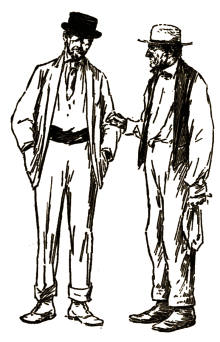
When we reached the boarding-house, Mr. Jacobus took me aside.
“You know,” he began his discourse, “my wife, she used to live in N’ York!”
I didn’t know; but I said “Yes.”
“She says the numbers on the streets runs criss-cross like. Thirty-four’s on one side o’ the street an’ thirty-five on t’ other. How’s that?”
“That is the invariable rule, I believe.”
“Then—I say—these here new folk that you ’n’ your wife seem so mighty taken up with—d’ ye know any thing about ’em?”
“I know nothing about the character of your boarders, Mr. Jacobus,” I replied, conscious of some[135] irritability. “If I choose to associate with any of them—“
“Jess so—jess so!” broke in Jacobus. “I hain’t nothin’ to say ag’inst yer sosherbil’ty. But do ye know them?”
“Why, certainly not,” I replied.
“Well—that was all I wuz askin’ ye. Ye see, when he come here to take the rooms—you wasn’t here then—he told my wife that he lived at number thirty-four in his street. An’ yistiddy she told her that they lived at number thirty-five. He said he lived in an apartment-house. Now there can’t be no apartment-house on two sides of the same street, kin they?”
“What street was it?” I inquired, wearily.
“Hunderd ’n’ twenty-first street.”
“May be,” I replied, still more wearily. “That’s Harlem. Nobody knows what people will do in Harlem.”
I went up to my wife’s room.
“Don’t you think it’s queer?” she asked me.
“I think I’ll have a talk with that young man to-night,” I said, “and see if he can give some account of himself.”
“But, my dear,” my wife said, gravely, “she doesn’t know whether they’ve had the measles or not.”
“Why, Great Scott!” I exclaimed, “they must have had them when they were children.”
“Please don’t be stupid,” said my wife. “I meant their children.”
| ✳ | ✳ | ✳ | ✳ | ✳ |
After dinner that night—or rather, after supper, for we had dinner in the middle of the day at Jacobus’s—I walked down the long verandah to ask Brede, who was placidly smoking at the other end, to accompany me on a twilight stroll. Half way down I met Major Halkit.
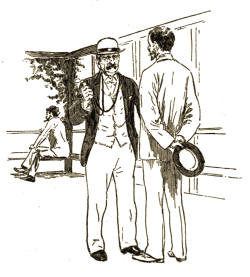
“That friend of yours,” he said, indicating the unconscious figure at the further end of the house, “seems to be a queer sort of a Dick. He told me that he was out of business, and just looking round for a chance to invest his capital. And I’ve been telling him what an everlasting big show he had to take stock in the Capitoline Trust Company—starts next month—four million capital—I told you all about it. ‘Oh, well,’ he says, ‘let’s wait and think about it.’ ‘Wait!’ says I, ‘the Capitoline Trust Company won’t wait for you, my boy. This is letting you in on the ground floor,’ says I ‘and it’s now or never.’ ‘Oh, let it wait,’ says he. I don’t know what’s in-to the man.”
“I don’t know how well he knows his own business, Major,” I said as I started again for Brede’s end of the verandah. But I was troubled none the less. The Major could not have influenced the sale of one share of[137] stock in the Capitoline Company. But that stock was a great investment; a rare chance for a purchaser with a few thousand dollars. Perhaps it was no more remarkable that Brede should not invest than that I should not—and yet, it seemed to add one circumstance more to the other suspicious circumstances.
| ✳ | ✳ | ✳ | ✳ | ✳ |
When I went upstairs that evening, I found my wife putting her hair to bed—I don’t know how I can better describe an operation familiar to every married man. I waited until the last tress was coiled up, and then I spoke.
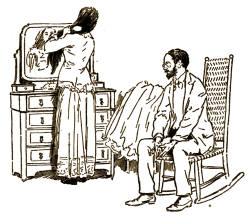
“I’ve talked with Brede,” I said, “and I didn’t have to catechize him. He seemed to feel that some sort of explanation was looked for, and he was very out-spoken. You were right about the children—that is, I must have misunderstood him. There are only two. But the Matterhorn episode was simple enough. He didn’t realize how dangerous it was until he had got so far into it that he couldn’t back out; and he didn’t tell her, because he’d left her here, you see, and under the circumstances[138]—“
“Left her here!” cried my wife. “I’ve been sitting with her the whole afternoon, sewing, and she told me that he left her at Geneva, and came back and took her to Basle, and the baby was born there—now I’m sure, dear, because I asked her.”
“Perhaps I was mistaken when I thought he said she was on this side of the water,” I suggested, with bitter, biting irony.
“You poor dear, did I abuse you?” said my wife. “But, do you know, Mrs. Tabb said that she didn’t know how many lumps of sugar he took in his coffee. Now that seems queer, doesn’t it.”
It did. It was a small thing. But it looked queer. Very queer.
| ✳ | ✳ | ✳ | ✳ | ✳ |
The next morning, it was clear that war was declared against the Bredes. They came down to breakfast somewhat late, and, as soon as they arrived, the Biggleses swooped up the last fragments that remained on their plates, and made a stately march out of the dining-room. Then Miss Hoogencamp arose and departed, leaving a whole fish-ball on her plate. Even as Atalanta might have dropped an apple behind her to tempt her pursuer to check his speed, so Miss Hoogencamp left that fish-ball behind her, and between her maiden self and Contamination.
We had finished our breakfast, my wife and I, before the Bredes appeared. We talked it over, and[139] agreed that we were glad that we had not been obliged to take sides upon such insufficient testimony.
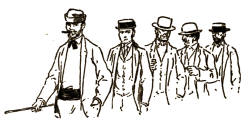
After breakfast, it was the custom of the male half of the Jacobus household to go around the corner of the building and smoke their pipes and cigars where they would not annoy the ladies. We sat under a trellis covered with a grape-vine that had borne no grapes in the memory of man. This vine, however, bore leaves, and these, on that pleasant Summer morning, shielded from us two persons who were in earnest conversation in the straggling, half-dead flower-garden at the side of the house.
“I don’t want,” we heard Mr. Jacobus say, “to enter in no man’s pry-vacy; but I do want to know who it may be, like, that I hev in my house. Now what I ask of you, and I don’t want you to take it as in no ways personal, is—hev you your merridge-license with you?”
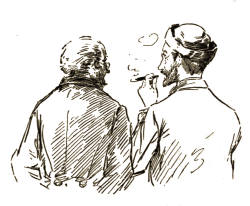
“No,” we heard the voice of Mr. Brede reply. “Have you yours?”
I think it was a chance shot; but it told all the same. The Major (he was a widower), and Mr. Biggle[140] and I looked at each other; and Mr. Jacobus, on the other side of the grape-trellis, looked at—I don’t know what—and was as silent as we were.
Where is your marriage-license, married reader? Do you know? Four men, not including Mr. Brede, stood or sate on one side or the other of that grape-trellis, and not one of them knew where his marriage-license was. Each of us had had one—the Major had had three. But where were they? Where is yours? Tucked in your best-man’s pocket; deposited in his desk—or washed to a pulp in his white waistcoat (if white waistcoats be the fashion of the hour), washed out of existence—can you tell where it is? Can you—unless you are one of those people who frame that interesting document and hang it upon their drawing-room walls?
Mr. Brede’s voice arose, after an awful stillness of what seemed like five minutes, and was, probably, thirty seconds:
“Mr. Jacobus, will you make out your bill at once, and let me pay it? I shall leave by the six o’clock train. And will you also send the wagon for my trunks?”
“I hain’t said I wanted to hev ye leave—” began Mr. Jacobus; but Brede cut him short.
“Bring me your bill.”
“But,” remonstrated Jacobus, “ef ye ain’t—“
“Bring me your bill!” said Mr. Brede.
| ✳ | ✳ | ✳ | ✳ | ✳ |
My wife and I went out for our morning’s walk. But it seemed to us, when we looked at “our view,” as[141] if we could only see those invisible villages of which Brede had told us—that other side of the ridges and rises of which we catch no glimpse from lofty hills or from the heights of human self-esteem. We meant to stay out until the Bredes had taken their departure; but we returned just in time to see Pete, the Jacobus darkey, the blacker of boots, the brusher of coats, the general handy-man of the house, loading the Brede trunks on the Jacobus wagon.
And, as we stepped upon the verandah, down came Mrs. Brede, leaning on Mr. Brede’s arm, as though she were ill; and it was clear that she had been crying. There were heavy rings about her pretty black eyes.
My wife took a step toward her.
“Look at that dress, dear,” she whispered; “she never thought any thing like this was going to happen when she put that on.”
It was a pretty, delicate, dainty dress, a graceful, narrow-striped affair. Her hat was trimmed with a narrow-striped silk of the same colors—maroon and white—and in her hand she held a parasol that matched her dress.
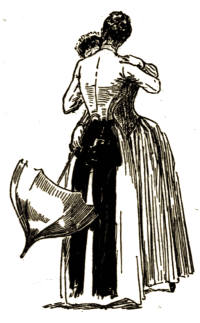
“She’s had a new dress on twice a day,” said my wife; “but that’s the prettiest yet. Oh, somehow—I’m awfully sorry they’re going!”
But going they were. They moved toward the steps. Mrs. Brede looked toward my wife, and my wife moved toward Mrs. Brede. But the ostracised woman, as though she felt the deep humiliation of her position, turned sharply away, and opened her parasol to shield[142] her eyes from the sun. A shower of rice—a half-pound shower of rice—fell down over her pretty hat and her pretty dress, and fell in a spattering circle on the floor, outlining her skirts—and there it lay in a broad, uneven band, bright in the morning sun.
Mrs. Brede was in my wife’s arms, sobbing as if her young heart would break.
“Oh, you poor, dear, silly children!” my wife cried, as Mrs. Brede sobbed on her shoulder, “why didn’t you tell us?”
“W-W-W-We didn’t want to be t-t-taken for a b-b-b-b-bridal couple,” sobbed Mrs. Brede; “and we d-d-didn’t dream what awful lies we’d have to tell, and all the aw-aw-ful mixed-up-ness of it. Oh, dear, dear, dear!”
| ✳ | ✳ | ✳ | ✳ | ✳ |
“Pete!” commanded Mr. Jacobus, “put back them trunks. These folks stays here’s long’s they wants ter. Mr. Brede—” he held out a large, hard hand—“I’d orter’ve known better,” he said. And my last doubt of Mr. Brede vanished as he shook that grimy hand in manly fashion.
The two women were walking off toward “our view,” each with an arm about the other’s waist—touched by a sudden sisterhood of sympathy.
“Gentlemen,” said Mr. Brede, addressing Jacobus, Biggle, the Major and me, “there is a hostelry down[143] the street where they sell honest New Jersey beer. I recognize the obligations of the situation.”
We five men filed down the street. The two women went toward the pleasant slope where the sunlight gilded the forehead of the great hill. On Mr. Jacobus’s verandah lay a spattered circle of shining grains of rice. Two of Mr. Jacobus’s pigeons flew down and picked up the shining grains, making grateful noises far down in their throats.
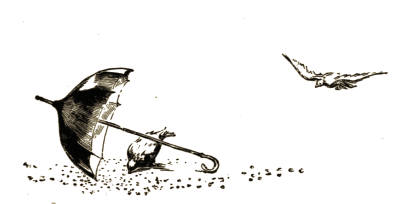
MR. COPERNICUS AND THE PROLETARIAT.
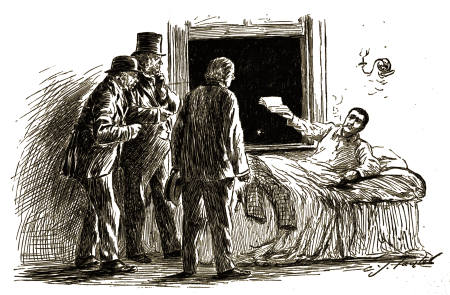
“’Gentlemen,’ he drawled, ‘you’ll excuse my not gig-gig-getting up.’”
MR. COPERNICUS AND THE PROLETARIAT.
The old publishing house of T. Copernicus & Son was just recovering from the rush of holiday business—a rush of perhaps a dozen purchasers. Christmas shoppers rarely sought out the dingy building just around the corner from Astor Place, and T. C. & Son had done no great business since young T. C., the “Son,” died, fifteen years before. The house lived on two or three valuable copyrights; and old Mr. Copernicus kept it alive just for occupation’s sake, now that Tom was dead. But he liked to maintain the assumption that his queer old business, with its publication of half-a-dozen scientific or theological works per annum, was the same flourishing concern that it had been in his prime. That it did not flourish was nothing to him. He was rich, thanks to himself; his wife was rich, thanks to her aunt; his daughter was rich, thanks to her grandmother. So he played at business, and every Christmas-time he bought a lot of fancy stationery and gift-books that nobody called for, and hired a couple of extra porters for whom[148] the head-porter did his best to find some work. Then, the week after New Year’s, he would discharge his holiday hands, and give each of them a dollar or two apiece out of his own pocket.
“Barney,” he said to the old porter, “you don’t need those two extra men any longer?”
“‘Deed an’ we do not, sorr!” said Barney; “th’ wan o’ thim wint off av himself the mornin’, an’ t’ other do be readin’ books the whole day long.”
“Send him to me,” Mr. Copernicus ordered, and Barney yelled unceremoniously, “Mike!”
The figure of a large and somewhat stout youth, who might have been eighteen or twenty-eight years old, appeared, rising from the sub-cellar. His hair was black, his face was clean-shaven, and although he held in his hand the evidence of his guilt, a book kept partly open with his forefinger, he had an expression of imperturbable calm, and placid, ox-like fixity of purpose. He wore a long, seedy, black frock-coat, buttoned up to the neck-band of his collarless shirt.

“How’s this?” inquired Mr. Copernicus. “I’m told that you spend your time reading my books.” The young man slowly opened his mouth and answered in a deliberate drawl, agreeably diversified by a peculiar stutter.
“I haven’t been reading your b-b-books, sir; I’ve[149] been reading my own. All I had to do was to hand up boxes of fuf-fuf-fancy stationery, and—“
“I see,” interposed Mr. Copernicus, hurriedly, “there hasn’t been any very great call for fancy stationery this year.”
“And when there wasn’t any c-c-call for it, I read. I ain’t going to be a pip-pip-porter all my life. Would you?”
“Why, of course, my boy,” said Mr. Copernicus, “if you are reading to improve your mind, in your leisure time—let’s see your book.”
The young man handed him a tattered duodecimo.
“Why, it’s Virgil!” exclaimed his employer. “You can’t read this.”
“Some of it I kik-kik-can,” returned the employee, “and some of it I kik-kik-can’t.”
Mr. Copernicus sought out “Arma virumque” and “Tityre, tu patulæ,” and one or two other passages he was sure of, and the studious young porter read them in the artless accent which the English attribute to the ancient Romans, and translated them with sufficient accuracy.
“Where did you learn to read Latin?”
“I p-p-picked it up in odd hours.”
“What else have you studied?”
“A little Gig-Gig-Greek.”
“Any thing else?”
“Some algebra and some Fif-Fif-French.”
“Where do you come from?”
“From Baltimore,” drawled the prodigy, utterly[150] unmoved by his employer’s manifest astonishment. “I was janitor of a school there, and the principal lent me his bib-bib-books.”
“What is your name?”
“M-M-Michael Quinlan.”
“And what was your father’s business?”
“He was a bib-bib-bricklayer,” the young man replied calmly, adding, reflectively, “when he wasn’t did-did-drunk.”
“Bless my old soul!” said Mr. Copernicus to himself, “this is most extraordinary! I’ll see you again, young man. Barney!” he called to the head porter, “this young man will remain with us for the present.”
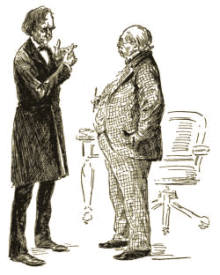
A couple of days later, Mr. Copernicus sent for Michael Quinlan, and invited him to call at the Copernican residence on Washington Square, that evening.
“I want to have Professor Barcalow talk with you,” he explained.
At the hour appointed, Mr. M. Quinlan presented himself at the basement door of the old house, and was promptly translated to the library, where Professor Barcalow, once President of Clear Creek University, Indiana, rubbed his bald head and examined the young man at length.
Quinlan underwent an hour’s ordeal without the shadow of discomposure.
He drawled and stuttered with a placid face, whether his answers were right or wrong. At the end of the hour, the Professor gave his verdict.
“Our young friend,” he said, “has certainly done[151] wonders for himself in the way of self-tuition. He is almost able—mind, I say almost—to pass a good Freshman examination. Of course, he is not thorough. There is just the same difference, Mr. Copernicus, between the tuition you do for yourself and the tuition that you receive from a competent teacher as there is between the carpentering you do for yourself and the carpentering a regular carpenter does for you. I can see the marks of self-tuition all over this young man’s conversation. He has never met a competent instructor in his life. But he has done very well for himself—wonderfully well. He in entitled to great credit. Try to remember, Quinlan, what I told you about the use of the ablative absolute.”
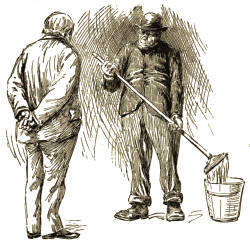
Quinlan said he would, and made his exit by the basement door.
“If he works hard,” remarked the Professor, “he will be able to enter Clear Creek by June, and work his way through.”
“And as it happens,” said Mr. Copernicus, “I’m going to lose my night-watchman next week, and I think I’ll put Quinlan in. And then I’ve been thinking—there are all poor Tom’s books that he had when[152] he went to Columbia. I’ll let the boy come here and borrow them, and I can keep an eye on him and see how he’s getting along.”
“H’m! yes, of course,” the Professor assented hesitatingly, dubious of Mr. Copernicus’s classics.
| ✳ | ✳ | ✳ | ✳ | ✳ |
“Well, Barney,” Mr. Copernicus hailed his head-porter a month or two later, “how does our new night-watchman do?”
“Faith, I’ve seen worse than him,” said Barney. “He’s a willing lad.”
Barney’s heart had been won. He came down to the store each morning and found that Quinlan had saved him the trouble of taking off the long sheets of cotton cloth that protected the books on the counters from the dust.
| ✳ | ✳ | ✳ | ✳ | ✳ |
Every week thereafter, Quinlan presented himself at the basement door, shabby, but no longer collarless, was admitted to the library, by way of the back-stairs, and received from Mrs. Copernicus the books that Mr. Copernicus had set aside for him. But one day Mr.[153] Copernicus forgot the books, and Mrs. Copernicus asked the young man into the parlor to explain to him how it had happened. When she had explained, being a kindly soul, she made a little further conversation, and asked Quinlan some questions about his studies. Greek was Greek indeed to her; but when he spoke of French, she felt as though she had a sort of second-hand acquaintance with the language.
“Floretta,” she said to her daughter, “talk to Mr. Quinlan in French, and find out how much he knows.”
Floretta blushed. She was a wren-like little thing, with soft brown hair, rather pretty, and yet the sort of girl whom men never notice. To address this male stranger was an agony to her. But she knew that her French had been bought at a fashionable boarding-school, and bought for show, and her mother had a right to demand its exhibition. She asked M. Quinlan how he portrayed himself, and M. Quinlan, with no more expression on his face than a Chinese idol, but with a fluency checked only by his drawl and his stutter, poured forth what sounded to Mrs. Copernicus like a small oration.
“What did he say then, Floretta?” she demanded.
“He said how grateful he was to Papa for giving him such a chance, and how he wants to be a teacher when he knows enough. And, oh, Mama, he speaks ever so much better than I do.”
“Where did you learn to speak so well?” inquired Mrs. Copernicus, incredulously.
“I lived for some years in a French house, Ma’am.[154] At least, the lady of the house was French, and she never spoke any thing else.”
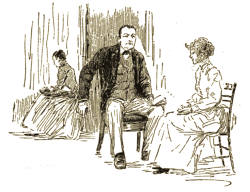
Beneficence is quick to develop into an insidious habit. When Mr. Copernicus heard this new thing of his prodigy and protegé, a new idea came to him.
“Old Haverhill, down at the office, speaks French like a native. I’ll let him feel Quinlan’s teeth, and if he is as good as you say he is, he’d better come once a week and talk French to Floretta for an hour. You can sit in the room. She ought to keep up her French.”
And every Wednesday, from four to five, Mr. Quinlan and Miss Floretta conversed, Floretta blushing ever, Quinlan retaining his idol-like stolidity. Sometimes the dull monotony of his drawl, broken only by his regular and rhythmic stutter, lulled Mrs. Copernicus into a brief nap over her book or her fancy work.
| ✳ | ✳ | ✳ | ✳ | ✳ |
Spring had come. The trees had brought out their pale and gauzy green veils, the beds of tulips and Alpine daisies made glad spots in the parks, and Quinlan, at his employer’s suggestion, had purchased a ready made Spring suit, in which he looked so presentable that Mr. Copernicus was half minded to ask him to dinner.
For Mrs. Copernicus had said something to Mr. Copernicus that had set him to thinking of many things. The Chinese idol had abated no jot of his stolidity, and yet—perhaps—he had found a worshiper. Floretta began blushing of Wednesdays, a full hour before the lesson.
What was to come of it? On the face of it, it seemed impossible. A Quinlan and a Copernicus! And yet—great-grandfather Copernicus, who founded the family in America—was not he a carpenter? And did not his descendants point with pride to his self-made solidity? And here was native worth; high ambition; achievement that promised more. And Floretta was twenty-four, and had never had an offer. “What,” inquired Mr. Copernicus of himself, “is my duty toward the proletariat?”
One thing was certain. If the question was not settled in the negative at once, Quinlan must be educated. So, instead of inviting Quinlan to dinner, he invited Mr. Joseph Mitts, the traveling agent of the Hopkinsonian Higher Education Association, who, by a rare chance, was in town.
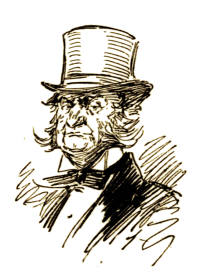
Cynical folk said that the Hopkinsonian Association existed only to sell certain textbooks and curious forms of stationery which were necessary to the Hopkinsonian system. But no such idea had ever entered the head of Mr. Mitts. He roamed about the land, introducing the System wherever he could, and a brisk business agent followed him and sold[156] the Hopkinsonian Blackboards and the Hopkinsonian Ink and the Hopkinsonian Teachers’ Self-Examination Blanks, on commission.
As they smoked their cigars in the Library after dinner, Mr. Copernicus told Mr. Mitts about Quinlan. Mr. Mitts was interested. He knew a Professor at a fresh-water college who would put Quinlan through his studies during the vacation.
“Well, that’s settled,” Mr. Copernicus said, and he beamed with satisfaction. “I knew you’d help me out, Mitts. Only it’s so hard ever to get a sight of you—you are always traveling about.”
“We don’t often meet,” Mr. Mitts assented. “And it is curious that this visit should have been the means of giving me sight of a man in whom I want to interest you. His name is Chester—Dudley Winthrop Chester. He is the son of my old clergyman, and he has given his parents a deal of trouble. I don’t know that Dud ever was vicious or dissolute. But he was the most confirmed idler and spendthrift I ever knew. He couldn’t even get through college, and he never would do a stroke of work. He made his father pay his debts half a dozen times, and when that was stopped, he drifted away, and his family quite lost sight of him. I met him in Baltimore last year, and lent him money to come to New York. He said he was going to work. And just as I came in your front door, I saw him going out of your basement door with a package under his arm, so I infer he is employed by one of your trades-people—your grocer, perhaps[157].”
“Just as you came in? Why—a large, dark-haired young man?”
“Yes; clean-shaven.”
“Why, that was Quinlan!”
“No,” said Mr. Mitts, with the smile of superior knowledge. “It was Chester, and if I’m not mistaken, he was kissing the cook.”
“Then you are mistaken!” cried Mr. Copernicus; “my cook is as black as the ace of spades. There isn’t a white servant in the house.”
“Why, that’s so!” Mr. Mitts was staggered for the moment. “But—wait a minute—does your man Quinlan speak with a drawl, and just one stutter to the sentence?”
“I think he does,” replied his host; “but—“
“Dudley Chester!” said Mr. Mitts.
“But, my dear Mitts, where did he get the Latin and Greek?”
“He had to learn something at Yale.”
“And the French?”
“His mother was a French Canadian. That’s where he gets his French—and his laziness.”
Mr. Copernicus made one last struggle.
“But he has been most industrious and faithful in my employ.”
“What is he?”
“My—my night-watchman.”
“Mr. Copernicus,” inquired Mr. Mitts, “have you a watchman’s clock in your building?”
“No, sir,” said Mr. Copernicus, indignantly. “I[158] have none of those degrading new-fangled machines. I prefer to trust my employees.”
“Then Dudley Chester is asleep in your store at this minute.”
| ✳ | ✳ | ✳ | ✳ | ✳ |
A soft, moist breeze, with something of the sea in it, blew gently in at an open window of the second floor of the business establishment of T. Copernicus & Son. Near the window a gas-jet flickered. Under the gas-jet, on, or rather in, a bed ingeniously constructed of the heaped-up covering-cloths from the long counters, lay Mr. Michael Quinlan, half-supported on his left elbow. In his other hand he held, half-open, a yellow-covered French novel. Between his lips was a cigarette. A faint shade of something like amusement lent expression to his placid features as he listened to Mr. Copernicus puffing his way up the stairs, followed by Mr. Mitts and Barney. The hands on the clock pointed to eleven. Mr. Quinlan’s attire was appropriate to the hour. He wore only a frayed cotton night-shirt. His other clothes were carelessly disposed about his couch.
He waited calmly until his visitors had appeared before him, and then he greeted them with a gracious wave of his hand—an easy gesture that seemed to dismiss Quinlan and announce Chester.
“Gentlemen,” he drawled, “you’ll excuse my not gig-gig-getting up to welcome you. Ah, Joseph! I saw you this evening, and I supposed the j-j-jig was up.”
Mr. Copernicus was purple and speechless for the[159] better part of a minute. Then he demanded, in a husky whisper:
“Who are you?”
Mr. Chester, with nothing of the Quinlan left about him, waved his hand once more.
“Mr. Joseph Mitts is a gentleman of irre-pip-pip-proachable veracity,” he said. “I can kik-kik-confidently confirm any statements he has made about me.”
“And why—” Mr. Copernicus had found his voice—“why have you humbugged me in this iniquitous—infamous way?”
The late Quinlan gazed at him with blank surprise.
“My dear sir, did-did-don’t you see? If I’d told you who I was, you’d have thought I was a did-did-damn fool not to know more than I did. Whereas, don’t you see? you thought I was a did-did-devil of a fellow.”
“Get up and dress yourself and get out of here!” said his employer.
“The jig, then,” inquired Mr. Dudley Chester, slowly rising, “is did-did-definitely up? No more Fif-Fif-French lessons? No? Well,” he continued, as he leisurely pulled on his trousers, “that’s the kik-kik-cussèd inconsistency. The j-j-jig is up for the gentleman; but when you thought I was a did-did-damn Mick, I was right in the bib-bib-bosom of the blooming family.”
“Here are your week’s wages,” said Mr. Copernicus, trembling with rage. “Now, get out!”
“Not exactly,” responded the unperturbed sinner: “a ticket to Chicago[160]!”
“I’m afraid you had best yield,” whispered Mr. Mitts. “Your family, you know. It wouldn’t do to have this get out.”
Mr. Copernicus had a minute of purple rage. Then he handed the money to Mr. Mitts.
“Put him on the train,” he said. “There’s one at twelve.”
“We can make it if we hurry,” said the obliging Mr. Mitts. “Where’s your lodging-house, Chester?”
Chester opened his eyes inquiringly. “Why, this is all I’ve got,” he said; “what’s the mim-mim-matter with this?”
“But your—your luggage?” inquired Mr. Mitts.
Mr. Chester waved a much-worn tooth-brush in the air.
“Man wants but lil-lil-little here below,” he remarked.
| ✳ | ✳ | ✳ | ✳ | ✳ |
“You see,” explained Mr. Dudley Winthrop Chester, formerly Quinlan, as he stepped out into the night air with Mr. Mitts, “the scheme is bib-bib-busted here, but I’ve got confidence in it. It’s good—it’ll gig-gig-go. Chicago’s the pip-pip-place for me. I suppose if you flash up ‘amo, amas’ to a Chicago man, he thinks you’re Elihu Burritt, the learned bib-bib-blacksmith.”

“Aren’t you tired of this life of false pretences?” asked Mr. Mitts, sternly.
“You can bib-bib-bet I am,” responded Chester,[161] frankly; “I haven’t said a cuss-word in six months. Did-did-did-damn—damn—damn—damn!” he vociferated into the calm air of night, by way of relieving his pent-up feelings. “How long is it, Dudley,” pursued the patient Mitts, “since your parents heard from you?”
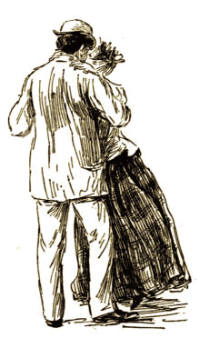
“Two years, I gig-gig-guess,” said Chester. “By Jove,” he added, as his eye fell on the blue sign of a telegraph office, “did-did-damn if I don’t telegraph them right now.”
Mr. Mitts was deeply gratified. “That’s a good idea,” he said.
“Lend me a kik-kik-quarter,” said Dudley Chester.
| ✳ | ✳ | ✳ | ✳ | ✳ |
At midnight sharp, Mr. Mitts saw his charge ascend the rear platform of the Chicago train just as it moved out of the gloomy Jersey City station of the Pennsylvania Railroad.
A young woman of slight figure, with a veil about her face, emerged from the interior of the car and threw her arms around the neck of Mr. Chester, late Quinlan.
“I thought I wasn’t mistaken,” said Mr. Mitts to himself.
The next week he received an envelope containing a scrap roughly torn out of a daily paper. It read as follows:
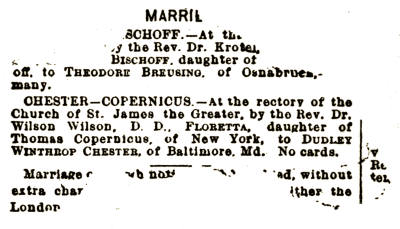
| ✳ | ✳ | ✳ | ✳ | ✳ |
And yet, within six months, Mr. Mitts received cards. They bade him to a reception given by Mr. and Mrs. Chester at the house of Mr. Thomas Copernicus.
“I couldn’t have done that,” said Mr. Mitts to himself.

HECTOR.
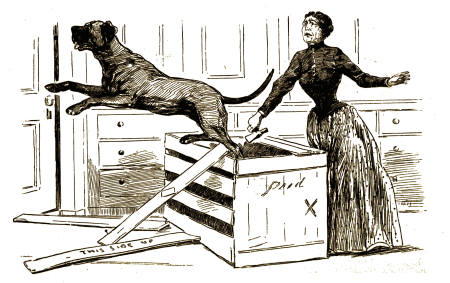
“Three slats!—and a vast black body leaped high in the air.”
HECTOR.
It was such a quiet old home, so comfortably covered with wistaria from basement to chimney-tops, and it stood on the corner of two such quiet, old-fashioned streets on the East side of New York that you would never have imagined that it held six of the most agitated and perturbed women in the great city. But the three Miss Pellicoes, their maid, their waitress and their cook, could not have been more troubled in their feminine minds had they been six exceptionally attractive Sabines with the Roman soldiery in full cry.
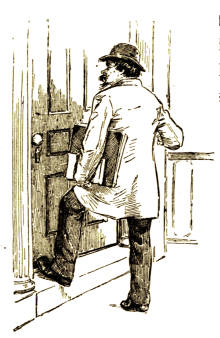
For twenty years—ever since the death of old Mr. Pellicoe—these six women had lived in mortal fear of the marauding man, and the Man had come at last. That very evening, at a quarter past eight o’clock, a creature who called himself a book-agent had rung the[166] front door bell. Honora, the waitress, had opened the door a couple of inches, inquired the stranger’s business, learned it, told him to depart, tried to close the door, and discovered that the man had inserted his toe in the opening. She had closed the door violently, and the man had emitted a single oath of deep and sincere profanity. He had then kicked the door and departed, with a marked limp.
At least this was the story as Honora first related it. But as she stood before the assembled household and recounted it for the seventh time, it had assumed proportions that left no room for the charitable hypothesis that an innocent vendor of literature had been the hapless victim of his own carelessness or clumsiness.
“And whin he had the half of his big ugly body in the crack o’ th’ dure,” she said, in excited tones and with fine dramatic action, “and him yellin’ an’ swearin’ and cussin’ iv’ry holy name he could lay his black tongue to, and me six years cook in a convent, and I t’rew th’ whole weight o’ me on th’ dure, an’—“
“That will do, Honora,” said Miss Pellicoe, who was the head of the household. She perceived that the combat was deepening too rapidly. “You may go. We will decide what is to be done.”
And Miss Pellicoe had decided what was to be done.
“Sisters,” she said to her two juniors, “we must keep a dog.”
“A dog!” cried Miss Angela, the youngest; “oh, how nice!”
“I do not think it is nice at all,” said Miss Pellicoe,[167] somewhat sternly, “nor would you, Angela, if you had any conception of what it really meant. I do not propose to keep a lap-dog, or a King Charles spaniel, but a dog—a mastiff, or a bloodhound, or some animal of that nature, such as would spring at the throat of an invader, and bear him to the ground!”
“Oh, dear!” gasped Miss Angela. “I should be afraid of him!”
“You do not understand as yet, Angela,” Miss Pellicoe explained, knitting her brows. “My intention is to procure the animal as a—in fact—a puppy, and thus enable him to grow up and to regard us with affection, and be willing to hold himself at all times in readiness to afford us the protection we desire. It is clearly impossible to have a man in the house. I have decided upon a mastiff.”
When Miss Pellicoe decided upon a thing, Miss Angela Pellicoe and her other sister promptly acquiesced. On this occasion they did not, even in their inmost hearts, question the wisdom of the decision of the head of the house. A man, they knew, was not to be thought of. For twenty years the Pellicoe house had been a bower of virginity. The only men who ever entered it were the old family doctor, the older family lawyer, and annually, on New Year’s Day, in accordance with an obsolete custom, Major Kitsedge, their father’s old partner, once junior of the firm of Pellicoe & Kitsedge. Not ever the butcher or the baker or the candlestick-maker forced an entrance to that innocent dovecote. They handed in their wares through a wicket-gate in the[168] back yard and were sent about their business by the chaste Honora.
The next morning, having awakened to find themselves and the silver still safe, Miss Pellicoe and Miss Angela set out for a dog store which they had seen advertised in the papers. It was in an unpleasantly low and ill-bred part of the town, and when the two ladies reached it, they paused outside the door, and listened, with lengthened faces, to the combined clamor and smell that emanated from its open door.
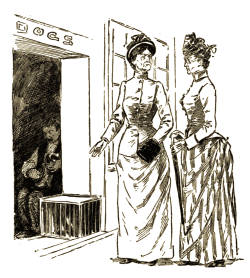
“This,” said Miss Pellicoe, after a brief deliberation, “is not a place for us. If we are to procure a dog, he must be procured in some other way. It need not entail a loss of self-respect.”
“I have it!” she added with a sudden inspiration. “I will write to Hector.”
Hector was the sole male representative of the Pellicoe family. He was a second cousin of the Misses Pellicoe. He lived out West—his address varying from year to year. Once in a long while Miss Pellicoe wrote to him, just to keep herself in communication with the[169] Man of the family. It made her feel more secure, in view of possible emergencies. She had not seen Hector since he was nineteen. He was perhaps the last person of any positive virility who had had the freedom of the Pellicoe household. He had used that freedom mainly in making attempts to kiss Honora, who was then in her buxom prime, and in decorating the family portraits with cork moustaches and whiskers. Miss Pellicoe clung to the Man of the family as an abstraction; but she was always glad that he lived in the West. Addressing him in his capacity of Man of the family, she wrote to him and asked him to supply her with a young mastiff, and to send her bill therefor. She explained the situation to him, and made him understand that the dog must be of a character to be regarded as a male relative.
Hector responded at once. He would send a mastiff pup within a week. The pup’s pedigree was, unfortunately, lost, but the breed was high. Fifty dollars would cover the cost and expenses of transportation. The pup was six months old.
For ten days the Pellicoe household was in a fever of expectation. Miss Pellicoe called in a carpenter, and, chaperoned by the entire household, held an interview with him, and directed him how to construct a dog-house in the back-yard—a dog-house with one door about six inches square, to admit the occupant in his innocent puphood, and with another door about four feet in height to emit him, when, in the pride of his mature masculinity, he should rush forth upon the burglar and the book-agent. The carpenter remarked that he “never[170] seen no such a dorg as that;” but Miss Pellicoe thought him at once ignorant and ungrammatical, and paid no heed to him.
In conclave assembled, the Misses Pellicoe decided to name the dog Hector. Beside the consideration of the claims of gratitude and family affection, they remembered that Hector was a classical hero.
The ten days came to an end when, just at dusk of a dull January day, two stalwart expressmen, with much open grumbling and smothered cursing, deposited a huge packing-case in the vestibule of the Pellicoe house, and departed, slamming the doors behind them. From this box proceeded such yelps and howls that the entire household rushed affrighted to peer through the slats that gridironed the top. Within was a mighty black beast, as high as a table, that flopped itself wildly about, clawed at the sides of the box, and swung in every direction a tail as large as a policeman’s night-club.
It was Hector. There was no mistake about it, for Mr. Hector Pellicoe’s card was nailed to a slat. It was Hector, the six-months-old pup, for whose diminutive proportions the small door in the dog-house had been devised; Hector, for whom a saucer of lukewarm milk was even then waiting by the kitchen range.
“Oh, Sister!” cried Miss Angela, “we never can get him out! You’ll have to send for a man!”
“I certainly shall not send for a man at this hour of the evening,” said Miss Pellicoe, white, but firm; “and I shall not leave the poor creature imprisoned during the night.” Here Hector yawped madly.
“I shall take him out,” concluded Miss Pellicoe, “myself!”
They hung upon her neck, and entreated her not to risk her life; but Miss Pellicoe had made up her mind. The three maids shoved the box into the butler’s pantry, shrieking with terror every time that Hector leaped at the slats, and at last, with the two younger Pellicoes holding one door a foot open, and the three maids holding the other door an inch open, Miss Pellicoe seized the household hatchet, and began her awful task. One slat! Miss Pellicoe was white but firm. Two slats! Miss Pellicoe was whiter and firmer. Three slats!—and a vast black body leaped high in the air. With five simultaneous shrieks, the two doors were slammed to, and Miss Pellicoe and Hector were left together in the butler’s pantry.
The courage of the younger Pellicoes asserted itself after a moment, and they flung open the pantry door. Miss Pellicoe, looking as though she needed aromatic vinegar, leaned against the wall. Hector had his fore-paws on her shoulders, and was licking her face in exuberant affection.
“Sisters,” gasped Miss Pellicoe, “will you kindly remove him? I should like to faint.”
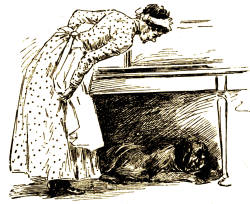
But Hector had already released her to dash at Miss Angela, who frightened him by going into such hysterics that Miss Pellicoe was obliged to deny herself the luxury of a faint. Then he found the maids, and, after driving them before him like chaff for five minutes, succeeded in convincing Honora of the affectionate purpose of[172] his demonstrations, and accepted her invitation to the kitchen, where he emptied the saucer of milk in three laps.
“I think, Honora,” suggested Miss Pellicoe, who had resumed command, “that you might, perhaps, give him a slice or two of last night’s leg of mutton. Perhaps he needs something more sustaining.”
Honora produced the mutton-leg. It was clearly what Hector wanted. He took it from her without ceremony, bore it under the sink and ate all of it except about six inches of the bone, which he took to bed with him.
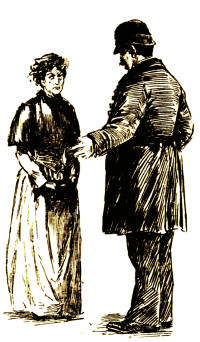
The next day, feeling the need of masculine advice, Miss Pellicoe resolved to address herself to the policeman on the beat, and she astonished him with the following question:
“Sir,” she said, in true Johnsonian style, “what height should a mastiff dog attain at the age of six months?”
The policeman stared at her in utter astonishment.
“They do be all sizes, Mum,” he replied, blankly, “like a piece of cheese.”
“My relative in the West,” explained Miss Pellicoe, “has sent me a dog, and I am given to understand that his age is six months. As he is phenomenally large,[173] I have thought it best to seek for information. Has my relative been imposed upon?”
“It’s har-r-rd to tell, Mum,” replied the policeman, dubiously. Then his countenance brightened. “Does his feet fit him?” he inquired.
“What—what do you mean?” asked Miss Pellicoe, shrinking back a little.
“Is his feet like blackin’-boxes on th’ ind of his legs?”
“They are certainly very large.”
“Thin ’tis a pup. You see, Mum, with a pup, ’tis this way. The feet starts first, an’ the pup grows up to ’em, like. Av they match him, he’s grown. Av he has arctics on, he’s a pup.”
| ✳ | ✳ | ✳ | ✳ | ✳ |
Hector’s growth in the next six months dissipated all doubts as to his puphood. He became a four-legged Colossus, martial toward cats, aggressive toward the tradesmen at the wicket-gate, impartially affectionate toward all the household, and voracious beyond all imagining. But he might have eaten the gentle ladies out of house and home, and they would never have dreamed of protesting. The house had found a Head—even a Head above Miss Pellicoe.
The deposed monarch gloried in her subjection. She said “Hector likes this,” or “Hector likes that[174],” with the tone of submissive deference in which you may hear a good wife say, “Mr. Smith will not eat cold boiled mutton,” or “Mr. Smith is very particular about his shirt-bosoms.”
As for Miss Angela, she never looked at Hector, gamboling about the back-yard in all his superabundance of strength and vitality, without feeling a half-agreeable nervous shock, and a flutter of the heart. He stood for her as the type of that vast outside world of puissant manhood of which she had known but two specimens—her father and Cousin Hector. Perhaps, in the old days, if Cousin Hector had not been so engrossed in frivolity and making of practical jokes, he might have learned of something to his advantage. But he never did.
| ✳ | ✳ | ✳ | ✳ | ✳ |
For the first time in her life, Miss Angela found herself left to watch the house through the horrors of the Fourth of July. This had always been Miss Pellicoe’s duty; but this year Miss Pellicoe failed to come back from the quiet place in the Catskills, where no children were admitted, and where the Pellicoe family, two at a time, spent the Summer in the society of other old maids and of aged widows.
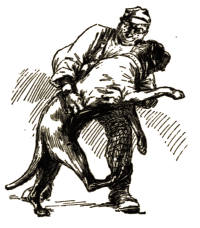
“I feel that you are safe with Hector,” she wrote.
Alack and alack for Miss Pellicoe’s faith in Hector! The first fire-cracker filled him with excitement, and before the noises of the day had fairly begun, he was careering around the yard, barking in uncontrollable[175] frenzy. At twelve o’clock, when the butcher-boy came with the chops for luncheon, Hector bounded through the open wicket, right into the arms of a dog-catcher. Miss Angela wrung her hands as she gazed from her window and saw the Head of the House cast into the cage with a dozen curs of the street and driven rapidly off.
In her lorn anguish she sought the functionary who was known in the house as “Miss Pellicoe’s policeman.”
“Be aisy, Miss,” he said. “Av the dog is worth five dollars, say, to yez, I have a friend will get him out for th’ accommodation.”
“Oh, take it, take it!” cried Miss Angela, trembling and weeping.
| ✳ | ✳ | ✳ | ✳ | ✳ |
After six hours of anxious waiting, Miss Angela received Hector at the front door, from a boy who turned and fled as soon as his mission was accomplished. Hector was extremely glad to be at home, and his health seemed to be unimpaired; but to Miss Angela’s delicate fancy, contact with the vulgar of his kind had left a vague aroma of degradation about him. With her own hands she washed him in tepid water and sprinkled him with eau de cologne. And even then she could not help feeling that to some extent the bloom had been brushed from the peach.
| ✳ | ✳ | ✳ | ✳ | ✳ |
Hector was ill—very ill. The family conclave assembled every night and discussed the situation with knit brows and tearful eyes. They could not decide whether the cause of his malady was the unwholesomeness of the Summer air in the city, or whether it was simply over-feeding. He was certainly shockingly fat, and much indisposed to exertion. He had lost all his activity; all his animal spirits. He spent most of the time in his house. Even his good-nature was going. He had actually snapped at Honora. They had tried to make up their minds to reduce his rations; but their hearts had failed them. They had hoped that the cool air of September would help him; but September was well nigh half gone; and Hector grew worse and worse.
“Sisters,” said Miss Pellicoe, at last, “we shall have to send for a Veterinary!” She spoke as though she had just decided to send for an executioner. And even as the words left her lips there came from Hector such a wail of anguish that Miss Pellicoe’s face turned a ghastly white.
“He is going mad!” she cried.
There was no sleep in the Pellicoe household that night, although Hector wailed no more. At the break of day, Miss Pellicoe led five other white-faced women into the back yard.
Hector’s head lay on the sill of his door. He seemed too weak to rise, but he thrashed his tail pleasantly against the walls, and appeared amiable and even cheerful. The six advanced.
Miss Pellicoe knelt down and put her hand in to pet him. Then a strange expression came over her face.
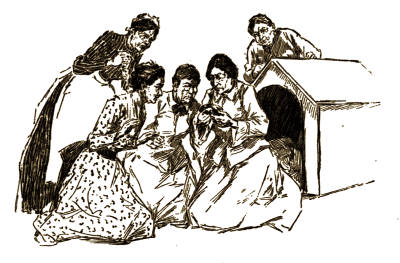
“Sister,” she said, “I think—a cat has got in and bitten him.”
She closed her hand on something soft, lifted it out and laid it on the ground. It was small, it was black, it was dumpy. It moved a round head in an uncertain, inquiring way, and tried to open its tightly-closed eyes. Then it squeaked.
Thrice more did Miss Pellicoe thrust her hand into the house. Thrice again did she bring out an object exactly similar.
“Wee-e-e-e!” squeaked the four objects. Hector thrashed her tail about and blinked joyfully, all unconscious of the utter wreck of her masculinity, looking as though it were the most natural thing in the world for her to have a litter of pups—as, indeed, it was.
Honora broke the awful silence,—Miss Angela was sobbing so softly you could scarcely hear her.
“Be thim Hector’s?” Honora inquired.
“Honora!” said Miss Pellicoe, rising, “never utter that name in my presence again.”
“An’ fwat shall I call the dog?”
“Call it”—and Miss Pellicoe made a pause of impressive severity, “call it—Andromache.”
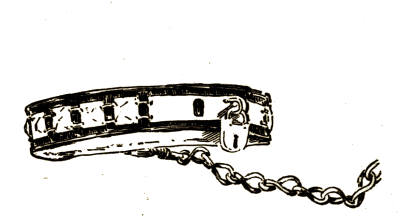
A SISTERLY SCHEME.
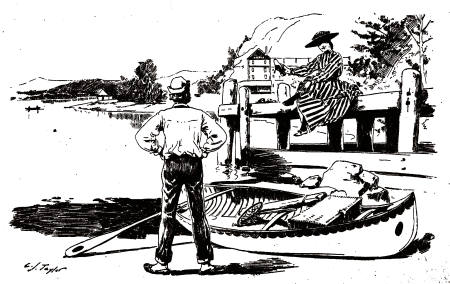
“The young man looked up and saw a saucy face laughing at him.”
A SISTERLY SCHEME.
Away up in the very heart of Maine there is a mighty lake among the mountains. It is reached after a journey of many hours from the place where you “go in.” That is the phrase of the country, and when you have once “gone in,” you know why it is not correct to say that you have gone through the woods, or, simply, to your destination. You find that you have plunged into a new world—a world that has nothing in common with the world that you live in; a world of wild, solemn, desolate grandeur, a world of space and silence; a world that oppresses your soul—and charms you irresistibly. And after you have once “come out” of that world, there will be times, to the day of your death, when you will be homesick for it, and will long with a childlike longing to go back to it.
Up in this wild region you will find a fashionable Summer-hotel, with electric bells and seven-course dinners, and “guests” who dress three times a day. It is perched on a little flat point, shut off from the rest of the mainland by a huge rocky cliff. It is an impertinence in that majestic wilderness, and Leather-Stocking would[182] doubtless have had a hankering to burn such an affront to Nature; but it is a good hotel, and people go to it and breathe the generous air of the great woods.
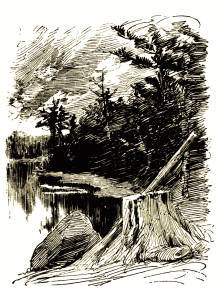
On the beach near this hotel, where the canoes were drawn up in line, there stood one Summer morning a curly-haired, fair young man—not so very young, either—whose cheeks were uncomfortably red as he looked first at his own canoe, high and dry, loaded with rods and landing-net and luncheon-basket, and then at another canoe, fast disappearing down the lake, wherein sat a young man and a young woman.
“Dropped again, Mr. Morpeth?”
The young man looked up and saw a saucy face laughing at him. A girl was sitting on the string-piece of the dock. It was the face of a girl between childhood and womanhood. By the face and the figure, it was a woman grown. By the dress, you would have judged it a girl.
And you would have been confirmed in the latter opinion by the fact that the young person was doing something unpardonable for a young lady, but not inexcusable in the case of a youthful tomboy. She had taken off her canvas shoe, and was shaking some small[183] stones out of it. There was a tiny hole in her black stocking, and a glimpse of her pink toe was visible. The girl was sunburnt, but the toe was prettily pink.
“Your sister,” replied the young man with dignity, “was to have gone fishing with me; but she remembered at the last moment that she had a prior engagement with Mr. Brown.”
“She hadn’t,” said the girl. “I heard them make it up last evening, after you went upstairs.”
The young man clean forgot himself.
“She’s the most heartless coquette in the world!” he cried, and clinched his hands.
“She is all that,” said the young person on the string-piece of the dock, “and more too. And yet, I suppose, you want her all the same?”
“I’m afraid I do,” said the young man, miserably.
“Well,” said the girl, putting her shoe on again, and beginning to tie it up, “I’ll tell you what it is, Mr. Morpeth. You’ve been hanging around Pauline for a year, and you are the only one of the men she keeps on a string who hasn’t snubbed me. Now, if you want me to, I’ll give you a lift.”
“A—a—what?”
“A lift. You’re wasting your time. Pauline has no use for devotion. It’s a drug in the market with her—has been for five seasons. There’s only one way to get her worked up. Two fellows tried it, and they nearly got there; but they weren’t game enough to stay to the bitter end. I think you’re game, and I’ll tell you. You’ve got to make her jealous[184].”
“Make her jealous of me?”
“No!” said his friend, with infinite scorn; “make her jealous of the other girl. Oh! but you men are stupid!”
The young man pondered a moment.
“Well, Flossy,” he began, and then he became conscious of a sudden change in the atmosphere, and perceived that the young lady was regarding him with a look that might have chilled his soul.
“Miss Flossy—Miss Belton—” he hastily corrected himself. Winter promptly changed to Summer in Miss Flossy Belton’s expressive face.
“Your scheme,” he went on, “is a good one. Only—it involves the discovery of another girl.”
“Yes,” assented Miss Flossy, cheerfully.
“Well,” said the young man, “doesn’t it strike you that if I were to develop a sudden admiration for any one of these other young ladies whose charms I have hitherto neglected, it would come tardy off—lack artistic verisimilitude, so to speak?”
“Rather,” was Miss Flossy’s prompt and frank response; “especially as there isn’t one of them fit to flirt with.”
“Well, then, where am I to discover the girl?”
Miss Flossy untied and retied her shoe. Then she said, calmly:
“What’s the matter with—” a hardly perceptible hesitation—“me?”
“With you?” Mr. Morpeth was startled out of his manners.
“Yes!”
Mr. Morpeth simply stared.
“Perhaps,” suggested Miss Flossy, “I’m not good-looking enough?”
“You are good-looking enough,” replied Mr. Morpeth, recovering himself, “for anything—” and he threw a convincing emphasis into the last word as he took what was probably his first real inspection of his adored one’s junior—“but—aren’t you a trifle—young?”
“How old do you suppose I am?”
“I know. Your sister told me. You are sixteen.”
“Sixteen!” repeated Miss Flossy, with an infinite and uncontrollable scorn, “yes, and I’m the kind of sixteen that stays sixteen till your elder sister’s married. I was eighteen years old on the third of last December—unless they began to double on me before I was old enough to know the difference—it would be just like Mama to play it on me in some such way,” she concluded, reflectively.
“Eighteen years old!” said the young man. “The deuce!” Do not think that he was an ill-bred young man. He was merely astonished, and he had much more astonishment ahead of him. He mused for a moment.
“Well,” he said, “what’s your plan of campaign? I am to—to discover you.”
“Yes,” said Miss Flossy, calmly, “and to flirt with me like fun.”
“And may I ask what attitude you are to take when you are—discovered[186]?”
“Certainly,” replied the imperturbable Flossy. “I am going to dangle you.”
“To—to dangle me?”
“As a conquest, don’t you know. Let you hang round and laugh at you.”
“Oh, indeed?”
“There, don’t be wounded in your masculine pride. You might as well face the situation. You don’t think that Pauline’s in love with you, do you?”
“No!” groaned the young man.
“But you’ve got lots of money. Mr. Brown has got lots more. You’re eager. Brown is coy. That’s the reason that Brown is in the boat and you are on the cold, cold shore, talking to Little Sister. Now if Little Sister jumps at you, why, she’s simply taking Big Sister’s leavings; it’s all in the family, any way, and there’s no jealousy, and Pauline can devote her whole mind to Brown. There, don’t look so limp. You men are simply childish. Now, after you’ve asked me to marry you—“
“Oh, I’m to ask you to marry me?”
“Certainly. You needn’t look frightened, now. I won’t accept you. But then you are to go around like a wet cat, and mope, and hang on worse then ever. Then Big Sister will see that she can’t afford to take that sort of thing from Little Sister, and then—there’s your chance.”
“Oh, there’s my chance, is it?” said Mr. Morpeth. He seemed to have fallen into the habit of repetition.
“There’s your only chance,” said Miss Flossy, with decision.
Mr. Morpeth meditated. He looked at the lake, where there was no longer sign or sound of the canoe, and he looked at Miss Flossy, who sat calm, self-confident and careless, on the string-piece of the dock.
“I don’t know how feasible—” he began.
“It’s feasible,” said Miss Flossy, with decision. “Of course Pauline will write to Mama, and of course Mama will write and scold me. But she’s got to stay in New York, and nurse Papa’s gout; and the Miss Redingtons are all the chaperons we’ve got up here, and they don’t amount to any thing—so I don’t care.”
“But why,” inquired the young man; and his tone suggested a complete abandonment to Miss Flossy’s idea: “why should you take so much trouble for me?”
“Mr. Morpeth,” said Miss Flossy, solemnly, “I’m two years behind the time-table, and I’ve got to make a strike for liberty, or die. And besides,” she added, “if you are nice, it needn’t be such an awful trouble.”
Mr. Morpeth laughed.
“I’ll try to make it as little of a bore as possible,” he said, extending his hand. The girl did not take it.
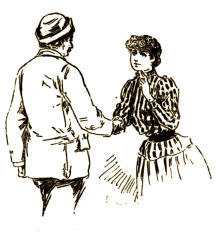
“Don’t make any mistake,” she cautioned him, searching his face with her eyes; “this isn’t to be any little-girl affair. Little Sister doesn’t want any kind, elegant, supercilious encouragement from Big Sister’s young man. It’s got to be a real flirtation—devotion no end, and ten times as much as ever Pauline could get out of you—and you’ve got to keep your end ’way—’—’way up!”
The young man smiled.
“I’ll keep my end up,” he said; “but are you certain that you can keep yours up?”
“Well, I think so,” replied Miss Flossy. “Pauline will raise an awful row; but if she goes too far, I’ll tell my age, and hers, too.”
Mr. Morpeth looked in Miss Flossy’s calm face. Then he extended his hand once more.
“It’s a bargain, so far as I’m concerned,” he said.
This time a soft and small hand met his with a firm, friendly, honest pressure.
“And I’ll refuse you,” said Miss Flossy.
| ✳ | ✳ | ✳ | ✳ | ✳ |
Within two weeks, Mr. Morpeth found himself entangled in a flirtation such as he had never dreamed of. Miss Flossy’s scheme had succeeded only too brilliantly. The whole hotel was talking about the outrageous behavior of “that little Belton girl” and Mr. Morpeth, who certainly ought to know better.
Mr. Morpeth had carried out his instructions. Before the week was out, he found himself giving the most life-like imitation of an infatuated lover that ever delighted the old gossips of a Summer-resort. And yet he had only done what Flossy told him to do.
He got his first lesson just about the time that Flossy, in the privacy of their apartments, informed her elder sister that if she, Flossy, found Mr. Morpeth’s[189] society agreeable, it was nobody’s concern but her own, and that she was prepared to make some interesting additions to the census statistics if any one thought differently.
The lesson opened his eyes.
“Do you know,” she said, “that it wouldn’t be a bit of a bad idea to telegraph to New York for some real nice candy and humbly present it for my acceptance? I might take it—if the bonbonnière was pretty enough.”
He telegraphed to New York and received, in the course of four or five days, certain marvels of sweets in a miracle of an upholstered box. The next day he found her on the verandah, flinging the bonbons on the lawn for the children to scramble for.
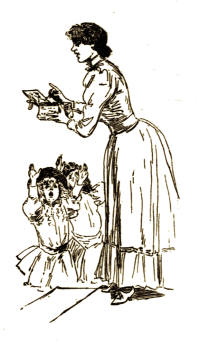
“Awfully nice of you to send me these things,” she said languidly, but loud enough for the men around her to hear—she had men around her already: she had been discovered—“but I never eat sweets, you know. Here, you little mite in the blue sash, don’t you want this pretty box to put your doll’s clothes in?”
And Maillard’s finest bonbonnière went to a yellow-haired brat of three.
But this was the slightest and lightest of her caprices. She made him send for his dog-cart and his horses, all the way from New York, only that he might drive her[190] over the ridiculous little mile-and-a-half of road that bounded the tiny peninsula. And she christened him “Muffets,” a nickname presumably suggested by “Morpeth”; and she called him “Muffets” in the hearing of all the hotel people.
And did such conduct pass unchallenged? No. Pauline scolded, raged, raved. She wrote to Mama. Mama wrote back and reproved Flossy. But Mama could not leave Papa. His gout was worse. The Miss Redingtons must act. The Miss Redingtons merely wept, and nothing more. Pauline scolded; the flirtation went on; and the people at the big hotel enjoyed it immensely.
And there was more to come. Four weeks had passed. Mr. Morpeth was hardly on speaking terms with the elder Miss Belton; and with the younger Miss Belton he was on terms which the hotel gossips characterized as “simply scandalous.” Brown glared at him when they met, and he glared at Brown. Brown was having a hard time. Miss Belton the elder was not pleasant of temper in those trying days.
“And now,” said Miss Flossy to Mr. Morpeth, “it’s time you proposed to me, Muffets.”
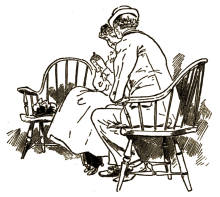
They were sitting on the hotel verandah, in the evening darkness. No one was near them, except an old lady in a Shaker chair.
“There’s Mrs. Melby. She’s pretending to be asleep,[191] but she isn’t. She’s just waiting for us. Now walk me up and down and ask me to marry you so that she can hear it. It’ll be all over the hotel inside of half an hour. Pauline will just rage.”
With this pleasant prospect before him, Mr. Morpeth marched Miss Flossy Belton up and down the long verandah. He had passed Mrs. Melby three times before he was able to say, in a choking, husky, uncertain voice:
“Flossy—I—I—I love you!”
Flossy’s voice was not choking nor uncertain. It rang out clear and silvery in a peal of laughter.
“Why, of course you do, Muffets, and I wish you didn’t. That’s what makes you so stupid half the time.”
“But—” said Mr. Morpeth, vaguely; “but I—“
“But you’re a silly boy,” returned Miss Flossy; and she added in a swift aside: “You haven’t asked me to marry you!”
“W-W-W-Will you be my wife?” stammered Mr. Morpeth.
“No!” said Miss Flossy, emphatically, “I will not. You are too utterly ridiculous. The idea of it! No, Muffets, you are charming in your present capacity; but you aren’t to be considered seriously.”
They strolled on into the gloom at the end of the great verandah.
“That’s the first time,” he said, with a feeling of having only the ghost of a breath left in his lungs, “that I ever asked a woman to marry me.”
“I should think so,” said Miss Flossy, “from the way you did it. And you were beautifully rejected,[192] weren’t you. Now—look at Mrs. Melby, will you? She’s scudding off to spread the news.”
And before Mr. Morpeth went to bed, he was aware of the fact that every man and woman in the hotel knew that he had “proposed” to Flossy Belton, and had been “beautifully rejected.”
| ✳ | ✳ | ✳ | ✳ | ✳ |
Two sulky men, one sulky woman, and one girl radiant with triumphant happiness started out in two canoes, reached certain fishing-grounds known only to the elect, and began to cast for trout. They had indifferent luck. Miss Belton and Mr. Brown caught a dozen trout; Miss Flossy Belton and Mr. Morpeth caught eighteen or nineteen, and the day was wearing to a close. Miss Flossy made the last cast of the day, just as her escort had taken the paddle. A big trout rose—just touched the fly—and disappeared.
“It’s this wretched rod!” cried Miss Flossy; and she rapped it on the gunwale of the canoe so sharply that the beautiful split-bamboo broke sharp off in the middle of the second-joint. Then she tumbled it overboard, reel and all.
“I was tired of that rod, any way, Muffets,” she said; “row me home, now; I’ve got to dress for dinner.”
Miss Flossy’s elder sister, in the other boat, saw and heard this exhibition of tyranny; and she was so much moved that she stamped her small foot, and endangered the bottom of the canoe. She resolved that Mama should come back, whether Papa had the gout or not.
Mr. Morpeth, wearing a grave expression, was paddling Miss Flossy toward the hotel. He had said nothing whatever, and it was a noticeable silence that Miss Flossy finally broke.
“You’ve done pretty much everything that I wanted you to do, Muffets,” she said; “but you haven’t saved my life yet, and I’m going to give you a chance.”
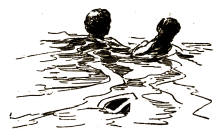
It is not difficult to overturn a canoe. One twist of Flossie’s supple body did it, and before he knew just what had happened, Morpeth was swimming toward the shore, holding up Flossy Belton with one arm, and fighting for life in the icy water of a Maine lake.
The people were running down, bearing blankets and brandy, as he touched bottom in his last desperate struggle to keep the two of them above water. One yard further, and there would have been no strength left in him.
He struggled up on shore with her, and when he got breath enough, he burst out:
“Why did you do it? It was wicked! It was cruel!”
“There!” she said, as she reclined composedly in his arms, “that will do, Muffets. I don’t want to be scolded.”
A delegation came along, bringing blankets and brandy, and took her from him.
| ✳ | ✳ | ✳ | ✳ | ✳ |
At five o’clock of that afternoon, Mr. Morpeth presented himself at the door of the parlor attached to the apartments of the Belton sisters. Miss Belton, senior, was just coming out of the room. She received his inquiry after her sister’s health with a white face and a quivering lip.
“I should think, Mr. Morpeth,” she began, “that you had gone far enough in playing with the feelings of a m-m-mere child, and that—oh! I have no words to express my contempt for you!”
And in a most unladylike rage Miss Pauline Belton swept down the hotel corridor.
She had left the door open behind her. Morpeth heard a voice, weak, but cheery, addressing him from the far end of the parlor.
“You’ve got her!” it said. “She’s crazy mad. She’ll make up to you to-night—see if she don’t.”
Mr. Morpeth looked up and down the long corridor. It was empty. He pushed the door open, and entered. Flossy was lying on the sofa, pale, but bright-eyed.
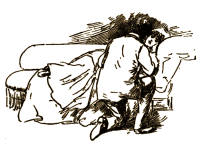
“You can get her,” she whispered, as he knelt down beside her.
“Flossy,” he said, “don’t you know that that is all ended? Don’t you know that I love you and you only? Don’t you know that I haven’t thought about any one else since—since—oh, Flossy, don’t you—is it possible that you don’t understand[195]?”
Flossy stretched out two weak arms, and put them around Mr. Morpeth’s neck.
“Why have I had you in training all Summer?” said she. “Did you think it was for Pauline?”
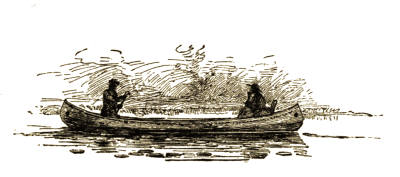
ZOZO.
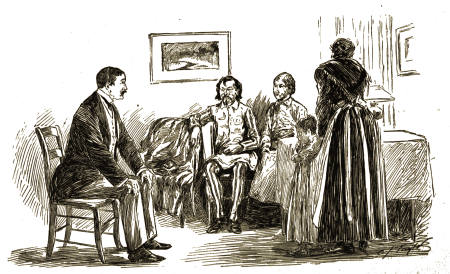
“‘Yes, Mother, you’d oughter’ve seen that place burn’.”
ZOZO.

Through a thickly falling snow, on the outskirts of one of New York’s suburban towns, (a hamlet of some two hundred thousand population,) walked a man who had but one desire in the world ungratified. His name was Richard Brant, and he was a large, deep-chested, handsome man—a man’s man; hardly a woman’s man at all: and yet the sort of man that is likely to make a pretty serious matter of it if he loves a woman, or if a woman loves him.
Mr. Richard Brant came from the West, the Western-born child of Eastern-born parents. He made his fortune before he was thirty-five, and for five years he had been trying to find out what he wanted to do with that fortune. He was a man of few tastes, of no vices, and of a straight-forward, go-ahead spirit that set him apart from the people who make affectation the spice of life. He wanted only one thing in the world, and that[200] one thing money would not buy for him. So he was often puzzled as to how he might best spend his money; and he often spent it foolishly. As he walked through the suburban streets of the suburban city, this sharp Winter’s night, he was reflecting on the folly of spending money on a fur coat. He was wearing the coat—a magnificent affair of bearskin and sable.
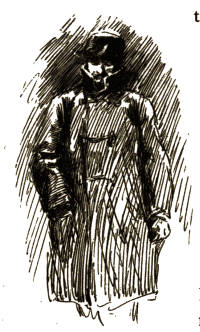
“South of Canada,” he said to himself, “this sort of thing is vulgar and unnecessary. I don’t need it, any more than a cow needs a side-pocket. It’s too beastly hot for comfort at this moment. I’d carry it over my arm, only that I should feel how absurdly heavy it really is.”
Then he looked ahead through the thick snow, and, although he was a man of strong nerves, he started and stepped back like a woman who sees a cow.
“Great Cæsar’s Ghost!” said he.
He was justified in calling thus upon the most respectable spook of antiquity. The sight he saw was strange enough in itself: seen in the squalid, commonplace sub-suburban street, it was bewildering. There, ahead of him, walked Mephistopheles—Mephistopheles dressed in a red flannel suit, trimmed with yellow, all peaks and points; and on[201] the head of Mephistopheles was an old, much worn, brown Derby hat.
Brant caught Mephisto by the shoulder and turned him around. He was a slight, undersized man of fifty, whose moustache and goatee, dyed an impossible black, served only to accentuate the meagre commonness of his small features.
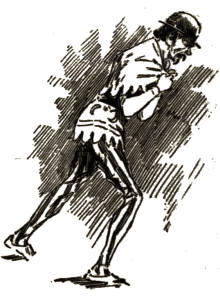
“Who are you?” demanded Brant.
“Sh-h-h!” said the shivering figure, “lemme go! I’m Zozo!”
Brant stared at him in amazement. What was it? A walking advertisement—for an automatic toy or a new tooth-powder?
“It’s all right,” said the slim man, his teeth chattering, “lemme get along. I’m most freezing. I’m Zozo—the astrologer. Why—don’t you know?—on Rapelyea Street?”
Brant dimly remembered that there was a Rapelyea Street, through which he sometimes passed on his way to the railroad station, and he had some faint memory of a gaudily painted shanty decked out with the signs of the zodiac in gilt papier maché.
“My orfice got a-fire this evening,” explained Zozo, “from the bakery next door. And I had to light out over the back fence. Them people in that neighborhood is kinder superstitious. They ain’t no idea of astrology. They don’t know it’s a Science. They think it’s some kind of magic. And if they’s to see me drove out by a common, ordinary fire, they’d think I was no sort of an astrologer. So I lit out quiet[202].”
His teeth chattered so that he made ten syllables out of “quiet.”
“They don’t understand the Science of it,” he continued, “and the fire got at my street clo’es before I knew it, and so I had to light out mighty quick. Now, jes’ lemme get home, will you? This here flannel ain’t no fur coat.”
Brant’s coat came off his shoulders in an instant.
“Put this on,” he said. “Confound you!—” as the man resisted,—“put it on!”
The astrologer slipped into the coat with a gasp of relief.
“Cracky!” he cried, “but I was freezin’!”
“Do you live far from here?” Brant inquired.
“Just a bit up the road. I’m ’most home, now,” replied Zozo, still chattering as to his teeth.
As they walked along the half-built street, Zozo told his tale. He had been in the astrology business for thirty years, and it had barely yielded him a living. Yet he had been able, by rigorous economy, to save up enough money to build himself a house—“elegant house, sir,” he said; “‘tain’t what you may call large; but it’s an elegant house. I got the design out of a book that cost a dollar, sir, a dollar. There ain’t no use in trying to do things cheap when you’re going to build a house.”
But his joy in his house was counterbalanced by his grief for the loss of his “orfice.” He had taken the ground-rent of the city lot, and had erected the “orfice” at his own cost. Three hundred and twenty-seven dollars[203] he had spent on that modest structure. No, he had not insured it. And now the bakery had caught fire, and his “orfice” was burned to the ground, and his best suit of street-clothes with it—his only suit, as he owned after a second’s hesitation.
In ten minutes’ walk they arrived at Zozo’s house. It was quite the sort of house that might have come out of a dollar book, with a great deal of scroll-work about it, and with a tiny tower, adorned with fantastically carved shingles. As they stood on the porch—nothing would content Zozo but that his new friend should come in and warm himself—Mr. Brant looked at the name on the door-plate.
“Zozo’s only my name in the Science,” the astrologer explained. “My real name—my born name—is Simmons. But I took Zozo for my business name. ‘Zs’ seem to kinder go with the astrology business, somehow—I don’t know why. There’s Zadkiel, and Zoroaster, and—oh, I don’t know—they’re ‘Zs’ or ‘Xs’, most of ’em; and it goes with the populace. I don’t no more like humoring their superstition than you would; but a man’s got to live; and the world ain’t up to the Science yet. Oh, that’s you, Mommer, is it?” he concluded, as the door was opened by a bright, buxom, rather pretty woman. “Mother ain’t to bed yet, is she? Say, Mommer, the orfice is burnt down!”
“Oh, Popper!” cried the poor woman; “you don’t reelly say!”
“True’s I live,” said the astrologer, “and my street-clo’es, too[204].”
“Oh, Popper!” his wife cried, “what’ll we do?”
“I don’t know, Mommer, I don’t know. We’ll have to think. Jes’ let this here gentleman in, though. I’d most ’a’ froze if he hadn’t lent me the loan of his overcoat. My sakes!” he broke out, as he looked at the garment in the light of the hall-lamp, “but that cost money. Mommer, this here’s Mr.—— I ain’t caught your name, sir.”
“Brant,” said the owner of the name.
“Band. And a reel elegant gentleman he is, Mommer. I’d ‘a’ froze stiff in my science clo’es if’t hadn’t been for this coat. My sakes!” he exclaimed, reverently, “never see the like! That’d keep a corpse warm. Shut the door, Mommer, an’ take the gentleman into the dining-room. He must be right cold himself. Is Mother there?”
“Yes,” said Zozo’s wife, “and so’s Mamie. You was so late we all got a kinder worried, and Mamie come right down in her nighty, just before you come in. ‘Where’s Popper?’ sez she; ‘ain’t he came in yet to kiss me good night? ’Tain’t mornin’, is it?’ sez she. And the orfice burned down! Oh, my, Popper! I thought our troubles was at an end. Come right in, Mr.—Mr.—I ain’t rightly got your name; but thank you kindly for looking after Popper, and if you had an idee how easy he takes cold on his chist, you’d know how thankful I am. Come right into the dinin’-room. Mother, this is Mr. Band, and he lent Simmons the loan of his coat to come home with. Wa’n’t it awful?”
“What’s that?” croaked a very old woman in the[205] corner of the dining-room. It was a small dining-room, with a small extension-table covered with a cheap red damask cloth.
“Simmons’s orfice is burned up, and his best suit with it,” explained Mrs. Simmons. “Ain’t it awful!”
“It’s a jedgement,” said the old lady, solemnly. She was a depressing old lady. And yet she evidently was much revered in the family. A four-year-old child hung back in a corner, regarding her grandmother with awe. But when her father entered, she slipped up to his knee, and took his kisses silently, but with sparkling eyes.
“Only one we’ve got,” said Zozo, as he sat down and took her on his knee. “Born under Mercury and Jupiter—if that don’t mean that she’ll be on top of the real-estate boom in this neighborhood, I ain’t no astrologer. Yes, Ma,” he went on, addressing the old woman, who gave no slightest sign of interest, “the orfice burned down, and I had to get home quick. Wouldn’t ’a’ done for them Rapelyea Street folks to see me, scuttin’ off in my orfice clo’es.”
He had shed Brant’s huge overcoat, and his wife was passing her hand over his thin flannel suit.
“Law, Simmons!” she said, “you’re all wet!”
“I’ll dry all right in these flannels,” said Zozo. “Don’t you bother to get no other clo’es.”
He had forgotten that he had told Brant that the suit in his office was his only suit. Or perhaps he wished to spare his wife the humiliation of such an admission.
“I’m dryin’ off first-rate,” he said, cheerfully; “Mamie, Popper ain’t wet where you’re settin’, is he?[206] No. Well, now, Mommer, you get out the whiskey and give Mr.—Mr. Band—a glass, with some hot water, and then he won’t get no chill. We’re all pro’bitionists here,” he said, addressing Brant, “but we b’lieve in spirits for medicinal use. Yes, Mother, you’d oughter’ve seen that place burn. Why, the flames was on me before I know’d where I was, and I jist thought to myself, thinks I, if these here people see me a-runnin’ away from a fire, I won’t cast no horoscope in Rapelyea Street after this; and I tell you, the way I got outer the back window and over the back fence was a caution! There’s your whiskey, sir: you’ll excuse me if I don’t take none myself. We ain’t in the habit here.”
Brant did not greatly wonder at their not being in the habit when he tasted the whiskey. It was bad enough to wean a toper on. But he sipped it, and made overtures to the baby. And after a while she showed an inclination to come and look at his wonderful watch, that struck the hour when you told it to. Before long she was sitting on his knee. Her father was telling the female members of the family about the fire, and she felt both sleepy and shut out. She played with Brant’s watch for a while, and then fell asleep on his breast. He held her tenderly, and listened to the astrologer as he told his pitiful tale over and over again, trying to fix the first second when he had smelled smoke.
He was full of the excitement of the affair: too full of the consciousness of his own achievement to realize the extent of the disaster. But his wife suddenly broke down, crying out:
“Oh, Simmons! where’ll you get three hundred dollars to build a new orfice?”
Brant spoke up, but very softly, lest he might wake the baby, who was sleeping with her head on his shoulder.
“I’ll be happy to—to advance the money,” he said.
Zozo looked at him almost sourly.
“I ain’t got no security to give you. This is a Building Society house, and there’s all the mortgage on it that it’s worth. I couldn’t do no better,” he concluded, sullenly.
Brant had been poor enough himself to understand the quick suspicion of the poor. “Your note will do, Mr. Simmons,” he said; “I think you will pay me back. I sha’n’t worry about it.”
But it was some time before the Simmons family could understand that a loan of the magnitude of three hundred dollars could be made so easily. When the glorious possibility did dawn upon them, nothing would do but that Mr. Brant should take another drink of whiskey. It was not for medicinal purposes this time; it was for pure conviviality; and Brant was expected, not being a prohibitionist, to revel vicariously for the whole family. He drank, wondering what he had at home to take the taste out of his mouth.
Then he handed the baby to her mother, and started to go. But Simmons suddenly and unexpectedly turned into Zozo, and insisted on casting his benefactor’s horoscope. His benefactor told him the day of his birth, and guessed at the hour. Zozo figured on a slate, drawing astronomical characters very neatly indeed, and at last[208] began to read off the meaning of his stellar stenography, in a hushed, important voice.
He told Brant everything that had happened to him, (only none of it had happened; but Brant did not say him nay.) Then he told him various things that were to happen to him; and Zozo cheered up greatly when his impassive and sleepy guest sighed as he spoke of a blonde woman who was troubling his heart, and who would be his, some day. There was a blonde woman troubling Brant’s heart; but there was small probability of her being his some day or any day. And then Zozo went on to talk about a dark woman who would disturb the course of true love; but only temporarily and as a side issue, so to speak.
“She ain’t serious,” he said. “She may make a muss; but she ain’t reel serious.”
“Good night!” said Brant.
“You don’t b’lieve in the Science,” said Zozo, in a voice of genuine regret. “But you jist see if it don’t come true. Good night. Look out you don’t trip over the scraper.”
| ✳ | ✳ | ✳ | ✳ | ✳ |
The blonde woman in Mr. Brant’s case was Madame la Comtesse de Renette. No, she was not a French woman: she was a loyal American. She was the daughter of an American millionaire; she had lived for many years in France, and her parents had married her, at the age of eighteen, to a title. The title was owned by a disagreeable and highly immoral old spendthrift, who had[209] led her a wretched life for two weary years, and then had had the unusual courtesy and consideration to die. Then she took what he had left of her millions, went home to the town of her birth, bought a fine estate on its outskirts, and settled down to enjoy a life wherein she could awake each morning to feel that the days would never more bring her suffering and humiliation.
Then Mr. Richard Brant disturbed her peace of mind by falling in love with her, and what was worse, asking her to marry him. That, she said, she could not do. He was her best, her dearest friend: she admired and esteemed him more than any man in the world. If she ever could marry a man, she would marry him. But she never, never could. He must not ask her.
Of course, he did ask her. And he asked her more than once. And there matters stood, and there they seemed likely to stay.
But Richard Brant was a man who, when he wanted a thing, wanted it with his whole heart and his whole soul, and to the exclusion of every other idea from his mind. After eighteen months of waiting, he began to find the situation intolerable. He had no heart in his business—which, for the matter of that, took care of itself—and he found it, as he said to himself, “a chore to exist.” And what with dwelling on the unattainable, and what with calling on the unattainable once or twice every week, he found that he was getting into a morbid state of mind that was the next thing to a mild mania.
“This has got to stop,” said Richard Brant. “I will put an end to it. I will wait till an even two years[210] is up, and then I will go away somewhere where I can’t get back until—until I’ve got over it.”
Opportunity is never lacking to a man in this mood. Some scientific idiot was getting up an Antarctic expedition, to start in the coming June. Brant applied for a berth.
“That settles it,” he said.
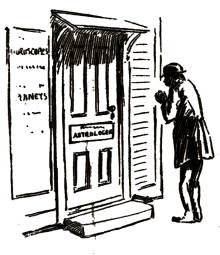
Of course, it didn’t settle it. He moped as much as ever and found it just as hard as ever to occupy his mind. If it had not been for the astrologer, he would hardly have known what to do.
It amused him to interest himself in Zozo and his affairs. He watched the building of the new “orfice”, and discussed with Zozo the color of the paint and the style of the signs. Zozo tried to convert him to astrology, and that amused him. The little man’s earnest faith in this “science” was an edifying study.
Then, when the “orfice” was completed, and Zozo began business again, he took great pleasure in sitting hid in Zozo’s back room, listening to Zozo’s clients, who were often as odd as Zozo himself. He had many clients now. Had he not miraculously evanished from a burning building, and come back unscathed?
| ✳ | ✳ | ✳ | ✳ | ✳ |
But there are two sides to every friendship. Brant took an amused interest in Zozo. Zozo worshiped Brant as his preserver and benefactor. Zozo’s affairs entertained Brant. Brant’s affairs were a matter of absorbing concern to Zozo. Zozo would have died for Brant.
So it came about that Zozo found out all about the blonde lady in Brant’s case. How? Well, one is not an astrologer for nothing. Brant’s coachman and Mme. de Renette’s maid were among Zozo’s clients. No society gossip knew so much about the Brant-Renette affair as Zozo knew, inside of two months.
| ✳ | ✳ | ✳ | ✳ | ✳ |
“It’s perfectly ridiculous, Annette! I can’t see the man!”
“Madame knows best,” said Annette, wiping away a ready tear. “It is only that I love Madame. And it is not well to anger those who have the power of magic. If they can bring good luck, they can bring bad. And he is certainly a great magician. Fire can not burn him.”
Mme. de Renette toyed with a gorgeously-printed card that read:
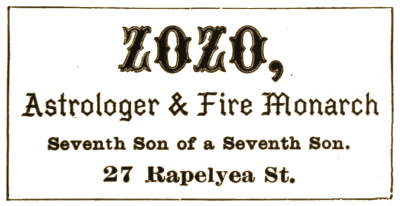
“Well,” she said at last, “show him in, Annette. But it’s perfectly absurd!”
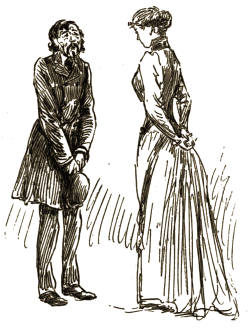
Zozo, in a very ready-made suit, with no earthly idea what to do with his hat, profuse of bows and painfully flustered, did not inspire awe.
“You wish to see me?” inquired Mme. de Renette, somewhat sternly.
“Madam,” began her visitor, in a tremulous voice, “I come with a message from the stars.”
“Very well,” said Mme. de Renette, “will you kindly deliver your message? I do not wish to detain you—from your stars.”
| ✳ | ✳ | ✳ | ✳ | ✳ |
It was a flushed, but a self-complacent, beaming, happy Zozo who stopped Richard Brant on the street an hour later.
“If you please, Mr. Brant, sir,” he said; “I’d like a few minutes of your time.”
“Certainly,” said Mr. Brant, wondering if Zozo wanted to borrow any more money.
“You’ve been a great good friend to me, Mr. Brant,” Zozo began, “and I hope you b’lieve, sir, that me and Mommer and Ma Simmons and Mamie are jist as grateful as—well, as anything[213].”
“Oh, that’s all right, Simmons—“
“Yes, sir. Well, now you’ll pardon me for seeming to interfere, like, in your business. But knowin’ as I done how your affairs with the blonde lady was hangin’ fire, so to speak—“
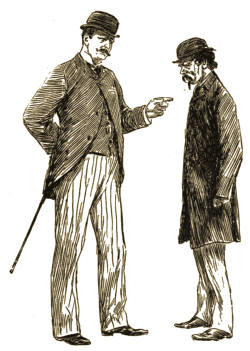
“‘The blonde lady!’” broke in Brant.
“Madam dee Rennet,” explained Zozo.
“The devil!” said Brant.
“Well, sir, knowin’ that, as I done, and knowin’ that there couldn’t be nothin’ to it—no lady would chuck you over her shoulder, Mr. Brant, sir—but only jist that her mind wasn’t at ease with regard to the dark lady—whereas the stars show clear as ever they showed any thin’ that the dark lady was only temporary and threatened, and nothin’ reel serious—why, I made so free as jist to go right straight to Madam dee Rennet and ease her mind on that point—and I did.”
“Great heavens!” Brant yelled. “You infernal meddler! what have you done? I don’t know a dark woman in the world! What have you said?—oh, curse it!” he cried, as he realized, from the pain of its extinction, that hope had been alive in his heart, “what have you done?—you devil[214]!”
He turned on his heel and rushed off toward Madame de Renette’s house.
“This does settle it,” he thought. “There’s no getting an idea like that out of a woman’s head.”
| ✳ | ✳ | ✳ | ✳ | ✳ |
“I understand,” he said, as he hurriedly presented himself to the lady of his love, “that a madman has been here—“
“Yes,” said Mme. de Renette, severely.
“You didn’t pay any attention to his nonsense?”
“About the dark woman?” inquired Mme. de Renette.
“Why, there’s no other woman dark or light—“
“I don’t know whether there is or not, Richard,” said Mme. de Renette, with icy distinctness; “but I know that there won’t be, after—well, sir, could you break your June engagement for—me?”
And Zozo was justified.
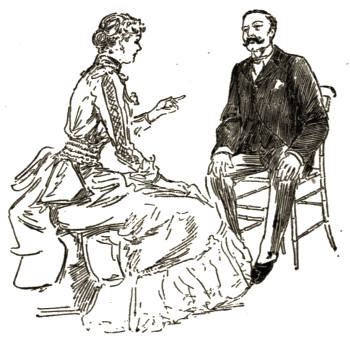
AN OLD, OLD STORY.
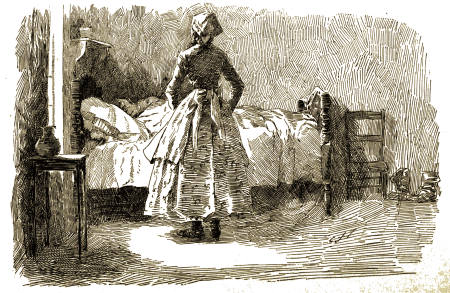
“‘Sophronia—’tain’t you!’”
AN OLD, OLD STORY.
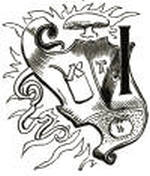
I suppose the Tullingworth-Gordons were good Americans at heart; but the Tullingworth-Gordons were of English extraction, and, as somebody once said, the extraction had not been completely successful—a great deal of the English soil clung to the roots of the family tree.
They lived on Long Island, in a very English way, in a manor-house which was as English as they could make it, among surroundings quite respectably English for Americans of the third or fourth generation.
They had two English servants and some other American “help”; but they called the Americans by their last names, which anglified them to some extent. They had a servants’ hall, and a butler’s pantry, and a page in buttons, and they were unreasonably proud of[218] the fact that one of their Tory ancestors had been obliged to leave New York for Halifax, in 1784, having only the alternative of a more tropical place of residence. I do not know whether they really held that the signers of the Declaration of Independence committed a grave error; but I do know that when they had occasion to speak of Queen Victoria, they always referred to her as “Her Majesty.”
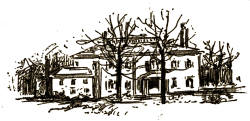
“I see by the Mail to-night,” Mr. Tullingworth-Gordon would say to his wife, “that Her Majesty has presented the poor bricklayer who saved seventeen lives and lost both arms at the Chillingham-on-Frees disaster with an India shawl and a copy of the Life of the Prince Consort.”
“Her Majesty is always so generous!” Mrs. Tullingworth-Gordon would sigh; “and so considerate of the common people!”
Mr. Tullingworth-Gordon was a rich man, and he was free to indulge the fancy of his life, and to be as English as his name; and he engaged those two English servants to keep up the illusion.
It is the tale of the menials that I have to tell—the tale of the loves of Samuel Bilson, butler, and Sophronia Huckins, “which ’Uckins it ever was an’ so it were allays called, and which ’Uckins is good enough for me, like it was good enough for my parents now departed,[219] and there is ’ope for ’eaven for chapel-goers, though a Church-of-England woman I am myself.”
Sophronia Huckins was lady’s maid to Mrs. Tullingworth-Gordon, housekeeper to Mr. and Mrs. Tullingworth-Gordon, and, in a way, autocrat and supreme ruler over the whole house of Tullingworth-Gordon. There were other servants, as I have said, but, in their several departments, Bilson and Sophronia were king and queen. Of course, at the first, there was some friction between these two potentates. For ten years they scratched and sparred and jostled; for ten years after that they lived in comfortable amity, relieving their feelings by establishing a reign of terror over the other servants; and then—ah, then—began the dawn of another day. Bilson was careless about the wine; Sophronia took to the wearing of gowns unbefitting a maid of forty years. It broke upon the Tullingworth-Gordon mind that something was in the wind, and that the conservative quiet of their domestic service was likely to be troubled.
Meanwhile, Nature, unconscious of the proprieties of the situation, was having her own way in the little passage back of the butler’s pantry.
“You say”—the housekeeper spoke with a certain sternness—“as how you have loved me for ten long years. But I say as how it would ’ave been more to your credit, Samuel Bilson, to ’ave found it out afore this, when, if I do say it myself, there was more occasion.”
“It’s none the wuss, Sophronia, for a-bein’ found out now,” rejoined the butler, sturdily: “what you was,[220] you is to me, an’ I don’t noways regret that you ain’t what you was, in point of beauty, to ’ave young men an’ sich a-comin’ between us, as an engaged pair.”
“‘Oo’s an engaged pair?” demanded Sophronia, with profound dignity.
“Us,” said Mr. Bilson, placidly: “or to be considered as sich.”
“I ain’t considered us as sich,” said Sophronia, coquettishly: “not as yet.”
Mr. Bilson was stacking up dishes on the shelves in the passageway. He paused in his labors; put his hands on his hips, and faced his tormenting charmer with determination in his eye.
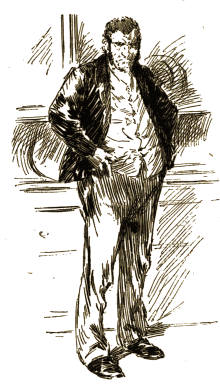
“Sophronia ’Uckins!” he said: “you’re forty, this day week; that much I know. Forty’s forty. You’ve kep’ your looks wonderful, an’ you ’ave your teeth which Providence give you. But forty’s forty. If you mean Bilson, you mean Bilson now, ’ere in this ’ere cupboard-extension, your ’and an’ your ’art, to love, honor, an’ obey, so ’elp you. Now, ’ow goes it?”
It went Mr. Bilson’s way. Sophronia demurred, and for a[221] space of some few weeks she was doubtful; then she said “No”—but in the end she consented.
Why should she not? Bilson had been a saving man. No luxurious furniture beautified his little room over the stables. His character was above reproach. He allowed himself one glass of port each day from Mr. Tullingworth-Gordon’s stock; but there he drew the line. Such as it was, the master of the house had his own wine, every drop, except that solitary glass of port—save on one occasion.
And Sophronia Huckins was the occasion of that occasion. Smooth and decorous ran the course of true love for four months on end. Mrs. Tullingworth-Gordon had been made acquainted with the state of affairs; had raged, had cooled, and had got to that point where the natural woman arose within her, and she began to think about laying out a trousseau for the bride. Fair was the horizon; cloudless the sky. Then came the heavy blow of Fate.
When Cupid comes to you at forty years, he is likely to be something wrinkled, more or less fat and pursy, a trifle stiff in the joints. You must humor him a little; you must make believe, and play that he is young and fair. It takes imagination to do this, and in imagination Sophronia was deficient. Her betrothal was not two months old when she suddenly realized that there was something grotesque and absurd about it. How did she get the idea? Was it an echo of the gossip of the other servants? Did she see the shop-keepers, quick to catch all the local gossip, smiling at her as she went about the[222] little town on her domestic errands? Was there something in Bilson’s manners that told her that he felt, in his inmost heart, that he had got to the point where he had to take what he could get, and that he held her lucky to have been conveniently accessible at that critical juncture?
We can not know. Perhaps Bilson was to blame. A man may be in love—over head and ears in love—and yet the little red feather of his vanity will stick out of the depths, and proclaim that his self-conceit is not yet dead.
Perhaps it was Bilson: perhaps it was some other cause. It matters not. One dull November day, Sophronia Huckins told Samuel Bilson that she could not and would not marry him.
“It was my intent, Samuel; but I ’ave seen it was not the thing for neither of us. If you had ’a’ seen your way clear five or ten or may befifteen years ago, I don’t say as it wouldn’t ’a’ been different. But as to sich a thing now, I may ’ave been foolish a-listenin’ to you last July; but what brains I ’ave is about me now, an’ I tell you plain, Samuel Bilson, it can’t never be.”
To Bilson this came like a clap of thunder out of the clearest and sunniest of skies. If the Cupid within him had grown old and awkward, he was unaware of it. To his dull and heavily British apprehension, it was the same Cupid that he had known in earlier years. The defection of his betrothed was a blow from which he could not recover.
“Them women,” he said, “is worse’n the measles.[223] You don’t know when they’re comin’ out, an’ you don’t know when they’re goin’ in.”
The blow fell upon him late one evening, long after dinner; when everything had been put to rights. He was sitting in the butler’s pantry, sipping his one glass of port, when Sophronia entered and delivered her dictum.
She went out and left him—left him with the port. She left him with the sherry; she left him with the claret, with the old, old claret, with the comet year, with the wine that had rounded the Cape, with the Cognac, with the Chartreuse, with the syrupy Curaçoa and the Eau de Dantzic, and with the Scotch whiskey that Mr. Tullingworth-Gordon sometimes drank in despite of plain American Rye.
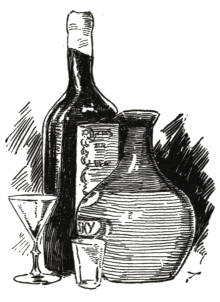
She left him with the structure of a lifetime shattered; with the love of twenty years nipped in its late-bourgeoning bud. She left him alone, and she left him with a deadly nepenthe at hand.
He fell upon those bottles, and, for once in his quiet, steady, conservative life, he drank his fill. He drank the soft, sub-acid claret; he drank the nutty sherry; he drank the yellow Chartreuse and the ruddy Curaçoa. He drank the fiery Cognac, and the smoky Scotch whiskey. He drank and drank, and as his grief rose higher and higher, high and more high he raised the intoxicating flood.
At two o’clock of that night, a respectable butler opened a side-door in the mansion of Mr. Tullingworth-Gordon, and sallied forth to cool his brow in the midnight air.
He was singing as they brought him back on a shutter, in the early morning; but it was not wholly with drunkenness, for delirium had hold of him. Down to the south of the house were long stretches of marsh, reaching into the Great South Bay, and there he had wandered in his first intoxication. There he had stepped over the edge of a little dyke that surrounded Mr. Tullingworth-Gordon’s pike-pond—where all the pike died, because the water was too salt for them—and there they found him lying on his back, with one of the most interesting cases of compound fracture in his right leg that has yet been put on record, and with the flat stones that topped the dyke lying over him.
They took him to his room over the stable, and put him to bed, and sent for the doctor. The doctor came, and set the leg. He also smelt of Mr. Bilson’s breath, and gazed upon Mr. Bilson’s feverish countenance, and said:
“Hard drinker, eh? We’ll have trouble with him, probably. Hasn’t he got anybody to look after him?”
This query found its way up to the manor-house of the Tullingworth-Gordons. It came, in some way, to the ears of Sophronia. Shortly after dinner-time she appeared in the chamber of Bilson.
Bilson was “coming out of it.” He was conscious, he was sore; he was heavy of heart and head. He looked up, as he lay on his bed, and saw a comely,[225] middle-aged Englishwoman, sharp of feature, yet somehow pleasant and comforting, standing by his bed.
“Sophronia!” he exclaimed.
“Hush!” she said; “the medical man said you wasn’t to talk.”
“Sophronia—’tain’t you!”
“P’r’aps it ain’t,” said Sophronia, sourly; “p’r’aps it’s a cow, or a ’orse or a goat, or anythin’ that is my neighbor’s. But the best I know, it’s me, an’ I’ve come to ’ave an eye on you.”
“Sophronia!” gasped the sufferer; “‘tain’t noways proper.”
“‘T’s goin’ to be proper, Samuel Bilson. You wait, an’ you’ll see what you’ll see. ’Ere ’e comes.”
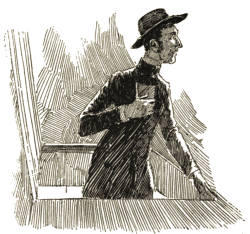
Mr. Bilson’s room was reached by a ladder, coming up through a hole in the floor. Through this hole came a peculiarly shaped felt hat; then a pale youthful face; then a vest with many buttons.
“To ’ave and to ’old,” said Sophronia. “‘Ere ’e is.”
The head came up, and a long, thin body after it. Pale and gaunt, swaying slightly backward and forward, like a stiff cornstalk in a mild breeze, the Reverend Mr. Chizzy stood before them and smiled vaguely.
The Reverend Mr. Chizzy was only twenty-four, and he might have passed for nineteen; but he was so high a churchman that the mould of several centuries was on him. He was a priest without a cure; but, as some of his irreverent friends expressed it, he was “in training” for the Rectorship of St. Bede’s the Less, a small church in the neighborhood, endowed by Mr. Tullingworth-Gordon and disapproved of by his Bishop, who had not yet appointed a clergyman. The Bishop had been heard to say that he had not yet made up his mind whether St. Bede’s the Less was a church or some new kind of theatre. Nevertheless, Mr. Chizzy was on hand, living under the wing of the Tullingworth-Gordons, and trying to make the good Church-of-England people of the parish believe that they needed him and his candles and his choir-boys.
Behind Mr. Chizzy came two limp little girls, hangers-on of the Tullingworth-Gordon household by grace of Mrs. Tullingworth-Gordon’s charity. In New England they would have been called “chore-girls.” The Tullingworth-Gordons called them “scullery maids.”
Bilson half rose on his elbow in astonishment, alarm and indignation.
“Sophronia ’Uckins,” he demanded, “what do this ’ere mean? I ain’t a-dyin’, and I ain’t got no need of a clergyman, thank ’eaven. And no more this ain’t a scullery, Mrs. ’Uckins.”
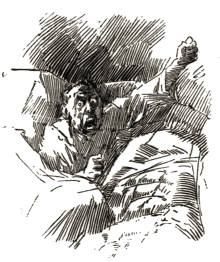
“This,” said Sophronia, pointing at the clergyman as though he were a wax-figure in a show, “this is to wed you and me, Samuel Bilson, and them” (she[227] indicated the scullery maids,) “them witnesses it.”
“Witnesses wot?” Mr. Bilson inquired, in a yell.
“Witnesses our marriage, Samuel Bilson. Nuss you I can not, both bein’ single, and nussed you must and shall be. Now set up and be marri’d quiet.”
Mr. Bilson’s physical condition forbade him to leap from the bed; but his voice leaped to the rafters above him.
“Marri’d!” he shouted: “I’ll die fust!”
“Die you will,” said Sophronia, calmly but sternly, “if married you ain’t, and that soon.”
“Sophronia!” Bilson’s voice was hollow and deeply reproachful; “you ’ave throwed me over.”
“I ’ave,” she assented.
“And ’ere I am.”
“And there you are.”
“Sophronia, you ’ave not treated me right.”
“I ’ave not, Samuel Bilson,” Miss Huckins cheerfully assented; “I might ’ave known as you was not fit to take care of yourself. But I mean to do my dooty now, so will you ’ave the kindness to button your clo’es at the neck, and sit up?”
Mr. Bilson mechanically fastened the neck-band of his night-shirt and raised himself to the sitting posture.
“Mrs. Huckins,” Mr. Chizzy interrupted, in an[228] uncertain way; “I didn’t understand—you did not tell me—there does not appear to have been the usual preliminary arrangement for this most sacred and solemn ceremony.”
Sophronia turned on him with scorn in her voice and bearing.
“Do I understand, sir, as you find yourself in a ’urry?”
“I am not in a hurry—oh, no. But—dear me, you know, I can’t perform the ceremony under these circumstances.”
Miss Huckins grew more profoundly scornful.
“Do you know any himpediment w’y we should not be lawfully joined together in matrimony?”
“Why,” said the perturbed cleric, “he doesn’t want you.”
“‘E doesn’t know what ’e wants,” returned Sophronia, grimly; “if women waited for men to find out w’en they wanted wives, there’d be more old maids than there is. If you’ll be good enough to take your book in your ’and, sir, I’ll see to ’im.”
Bilson made one last faint protest.
“‘Twouldn’t be right, Sophronia,” he wailed; “I ain’t wot I was; I’m a wuthless and a busted wreck. I can’t tie no woman to me for life. It ain’t doin’ justice to neither.”
“If you’re what you say you are,” said Sophronia, imperturbably, “and you know better than I do, you should be glad to take wot you can get. If I’m suited, don’t you complain[229].”
“Mrs. Huckins,” the young clergyman broke in, feebly asserting himself, “this is utterly irregular.”
“I know it is,” said Sophronia; “and we’re a-waitin’ for you to set it straight.”
The two chore-girls giggled. A warm flush mounted to Mr. Chizzy’s pale face. He hesitated a second; then nervously opened his book, and began the service. Sophronia stood by the bedside, clasping Bilson’s hand in a grasp which no writhing could loosen.
“Dearly beloved,” Mr. Chizzy began, addressing the two chore-girls; and with a trembling voice he hurried on to the important question:
“Wilt thou have this woman to be thy wedded wife?—“
“N—yah!”
Bilson had begun to say “No;” but Sophronia’s firm hand had tightened on his with so powerful a pressure that his negative remonstrance ended in a positive yell.
“Ah, really,” broke in Mr. Chizzy; “I can not proceed, M—M—Miss—ah, what’s your name?—I positively can’t!”
“Mrs. Bilson,” returned the unmoved Sophronia. “Are you intending for to part ’usband and wife at this point, sir? Excuse me; but we’re a-waitin’ of your convenience.”
Mr. Chizzy was a deep red in the face. His pallor had given place to a flush quite as ghastly in its way. The blood was waltzing in giddy circles through his brain as he read on and on.
No church—no candles—no robes—no choiring boys. Only this awful woman, stern as death, commanding him and Bilson. Why had he yielded to her? Why had he permitted himself to be dragged hither? Why was he meekly doing her bidding? Mr. Chizzy felt as though he were acting in some ghastly, nightmarish dream.
“Then shall the Minister say: Who giveth this Woman to be married to this Man?”
That roused Mr. Chizzy from his trance. It came late; but it seemed to open a way out of the horribly irregular business. He paused and tried to fix an uncertain eye on Sophronia.
“Have you a Father or a Friend here?” he demanded.
“Jim!” said Sophronia, loudly.
“Ma’am?” came a voice from the lower story of the stable.
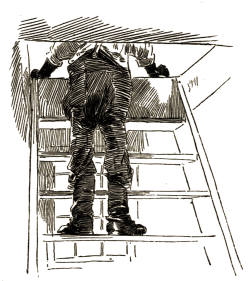
“Say ‘I do.’”
“Ma’am?”
“Say ‘I do’—an’ say it directly!”
“Say—say?—what do you want, Miss Huckins?”
“Jim!” said Sophronia, sternly, “open your mouth an’ say ‘I do’ out loud, or I come down there immejit!”
“I do!” came from the floor below.
“‘Ere’s the ring,” said Sophronia, promptly; “‘I, M., take thee, N.’—if you’ll ’ave the kindness to go on, sir, we won’t detain you any longer than we can ’elp. I’m give away, I believe; an’ I’ll take ’im, M[231].”
“Forasmuch as,” began the Reverend Mr. Chizzy, a few minutes later, addressing the chore-girls, “Samuel and Sophronia have consented together in holy wedlock—“
He stopped suddenly. Up through the opening in the floor arose the head of a youthful negro, perhaps fourteen years of age. Mr. Chizzy recognized him as the stable-boy, a jockey of some local fame.
“What you want me to say I done do?” he inquired.
“Mrs.—Mrs.—Bilson!” said Mr. Chizzy, with a tremulous indignation in his voice; “did this negro infant act as your parent or friend, just now?”
“‘E give me away,” replied the unabashed bride.
Mr. Chizzy looked at her, at Bilson, at Jim, and at the chore-girls. Then he opened his book again and finished the ceremony.
| ✳ | ✳ | ✳ | ✳ | ✳ |
The Tullingworth-Gordons were angry when they heard of the marriage. They missed the two mainstays of their domestic system. But—well, Bilson was[232] growing old, and Sophronia was growing tyrannical. Perhaps it was better as it was. And, after all, they had always wanted a Lodge, and a Lodge-keeper, and the old ice-house stood near the gate—a good two hundred feet from the house.
It was nearly a year before Bilson could walk around with comfort. Indeed, eighteen months later, he did not care to do more than sit in the sun and question Fate, while Mrs. Bilson tried to quiet a noisy baby within the Lodge.
“‘Ere I am laid up, as I should be,” said Bilson; “an there’s an active woman a-goin’ around with a baby, and a-nussin’ of him. If things was as they should be, in the course of nachur, we’d ’ave exchanged jobs, we would.”
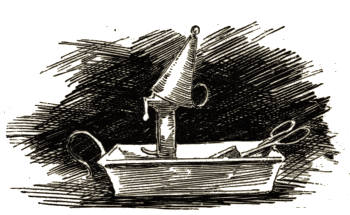
“THE RUNAWAY BROWNS,”
by H. C. Bunner, illustrations by C. J. Taylor; publishers, Keppler & Schwarzmann. The experiences of Paul Brown and his wife, who escape a tame, adventureless life, with a view of having “things happen to them,” and to this end leave a pleasant home to be gone a year and a day, are just the reading for a Summer’s afternoon, and there is still enough of Summer in the air to make it enjoyable to its fullest. How the Browns fell in with a band of barn-storming professionals; how they became tin peddlers; how they took charge of a lone hotel, and how they finally and gladly reached their trim cottage, is told in these clever and amusing pages, and will bring more than one hearty laugh even from those unused to smile.
—N., P. & S. Bulletin.
In Boards, $1.00. In Paper, 50 Cents.
All Booksellers.
By Mail, from the Publishers, on Receipt of Price.
“MADE IN FRANCE.”
Under the title of “Made in France” H. C. Bunner has gathered a number of short stories, all founded on tales by De Maupassant. Several have suffered so great a sea change, however, that the original writer, if he were alive, would not recognize them. In these about all that Bunner has borrowed from the brilliant Frenchman is what he calls the “ethical situations.” Others bear evident traces of their French origin. Mr. Bunner explains the motive of his novel scheme in these words:
“I have selected a few ethical situations from among the brightest of Maupassant’s inventions, and have tried to reproduce them, not as translations, but as English or American stories based on a Frenchman’s inspiration, and I have done this with the sole hope of making that inspiration clear to people who will not or can not read Maupassant in the original. If through the new climes, the new times, the new changes, the new worlds, indeed, into which I have moved his people and their adventures, you catch a better glimpse of the best fancies of M. Guy de Maupassant than you can get through the misleading mechanism of a literal translation, I shall be glad, indeed.”
There is no question of his success, for nine out of ten of his readers would find De Maupassant less amusing than Bunner. The volume is very cleverly illustrated by Taylor.
—San Francisco Chronicle.
In Boards, $1.00. In Paper, 50 Cents.
All Booksellers.
By Mail, from the Publishers, on Receipt of Price.
PUCK’S
OPPER BOOK
Sixty-four Pages in Black-and-white, by Frederick Opper
30 cts. By Mail, 35 cts.
✳✳✳
THIS FUNNY
| WORLD | AS “PUCK” SEES IT. |
Fifty-six Pages in Black-and-White, and Eight Colored Cartoons, all by Frederick Opper.
30 cts. By Mail, 35 cts.
✳✳✳
PICKINGS
FROM PUCK
Being a Choice Collection of Pre-eminently Perfect Pieces, Poems and Pictures from Puck.
Crops 1, 2, 3, 4, 5, 6, 7. 25 cts. Each.
✳✳✳
PUCK’S
| Published on the 15th of Each Month. |
LIBRARY |
Being Puck’s Best Things About Everything. Illustrated Catalogue on Application.
10 cts. per Copy. $1.20 per Year.
✳✳✳✳✳✳
The above are for sale by all Booksellers and Newsdealers
and mailed by the Publishers on receipt of price
Address: Puck, N. Y.
| NO POLITICS! | PURE FUN! |
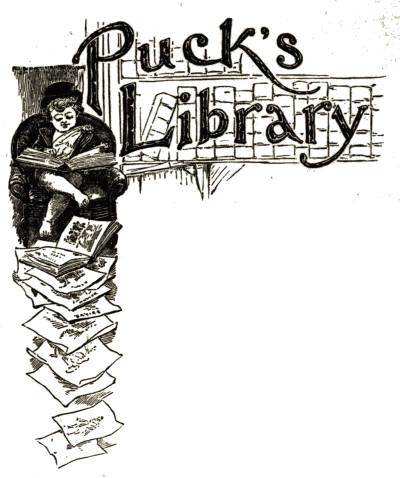
An Illustrated
Humorous Magazine.
PUBLISHED
ON THE 15Th OF EACH MONTH.
10 Cents per Copy. $1.20 per Year.
In Puck’s Library are reprinted the best things of lasting interest, classified after their kind, that have appeared in Puck.
By this arrangement the reader who wishes what Puck has to give him outside of politics and daily happenings, can have it here in monthly feasts of dainty tidbits.
32 Pages, Loaded with Pictures.
Send 10 cents to the “Publishers of PUCK’S LIBRARY, New York,” and receive from them a specimen copy and a Complete Catalogue of all the issues to date.
NEVER OUT OF PRINT!